Day One: Friday, 27 March 2020
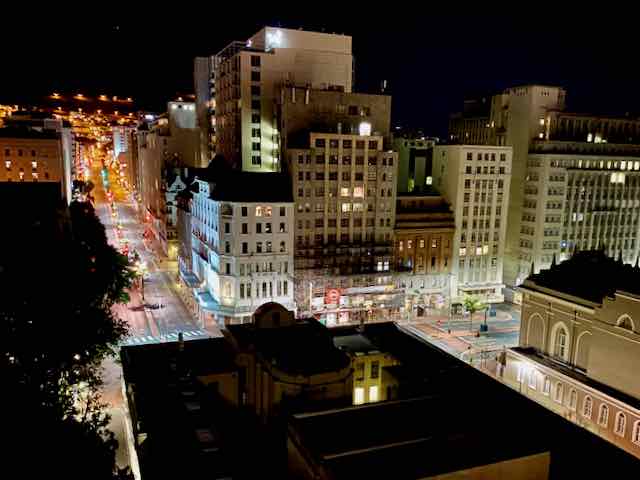
The thin-line new moon skims the silhouetted trees striding up Signal Hill and drops off the horizon. The night is still. A raptor hangs in the sky, then dips and floats away. Cars move like Pokémon on the street grid, tail lights flashing, headlights bright, running from the midnight Covid-19 lockdown. And then it happens. The city goes silent as only silence in a working city can — a low, sustained, sub-surface bass roll urban hum. The smell lingers: sea air, piss, and pap snoek. The city lights glower. Traffic signals flick to an algorithm plugged in at some control centre, and the blind-sensitive traffic light beeps “walk” to empty sidewalks. I go to bed. In the early morning, a raging voice echoes up from the street. Below me, on an alley that runs between the Iziko Slave Museum and House of Parliament, a large man dressed in multiple layers of disparate garments, typical of those whose home is the street, stands defiant, facing Parliament, belly thrust forward, weight resting on his hips, and shouts, angry and incomprehensible. His fury is directed at a marble statue of Queen Victoria, standing in Parliament’s gardens. He pauses and walks in quick, erratic circles, before again planting himself in front of the Empress to resume his harangue. The Queen, true to life, remains unperturbed and not amused. A police car cruises up Wale Street. Three young men walk purposefully along the sidewalk. The birds hunker down in the Company’s Gardens, vocal but invisible as if holidaying from the burden of humans. In the afternoon, two swallows swoop past my balcony, performing an air show. The moon appears and drops again. I go to bed.
Day Two: Saturday, 28 March 2020
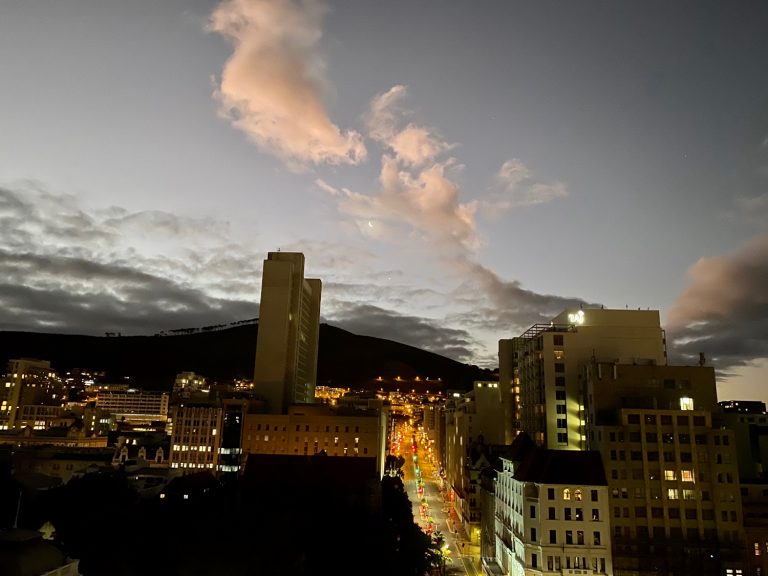
The harsh call of the hadeda ibis demand attention. Step out on to the balcony to see Egyptian geese fly past. The birds have re-emerged from the park. A mild and still morning. Watch the blue lights of a police car crawl up Wale Street. Make coffee. Then spend the day retrieving my digital life map (because that’s the landscape in which we now dwell), lost when I entered the wrong Apple passcode (yes, three times — the definition of insanity). I sign up for extra iCloud storage, an optimistic gesture to the future. Spent a happy hour in a “Lockdown Sundowner” group. We talk of a viral podcast circulating, reputedly from a senior virologist in a South African hospital. It’s fake. Yet, many argue as we sip our secluded sundowners, that, even so, what she said made sense. With so much factual news, why listen to an anonymous voice with false accreditation? The moon loses its slim line. I start watching “The Good Liar” but am too depressed by the storyline, hit pause, and go to bed.
Day Three: Sunday, 29 March 2020
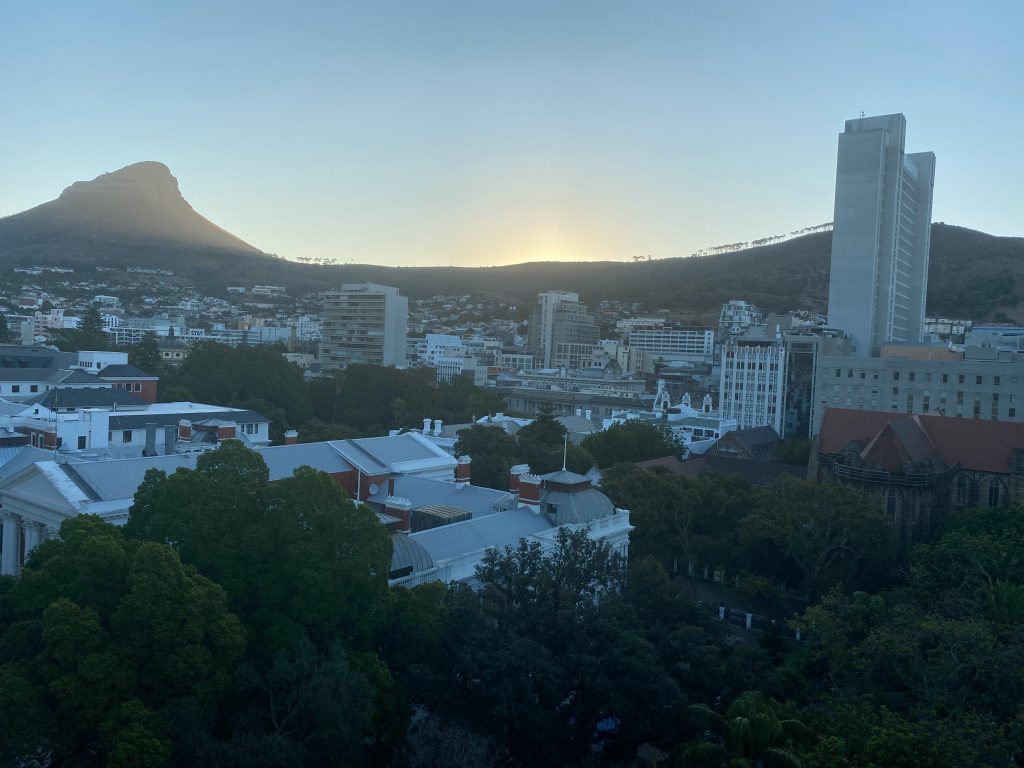
Too close. Too soon. News of a beloved friend contracting Covid-19, now recovering in an ICU in Johannesburg. Left with permanent pulmonary and heart damage. He’s at least 20 years younger than I. Read yet another commentator refer to the “war” against Covid-19. The war analogy is not just misguided, it is plain wrong. Politicians and governments use it as an excuse for their lack of strategy and inadequate tactics. (Remember the “war” against drugs? A complete failure.) In times of war, we override normal concerns — there is no choice or debate. And when it’s over, there are the victors and the defeated. There are the justifications for the “pay-back time” attacks [read: Dresden fire-bombing], for adopting extreme measures [read: Hiroshima]. And then there is the retribution, the “war crime” labels to hang around necks [read: Nuremberg], the spoils to be shared [read: Marshall Plan]. We are not at war. We are in a maelstrom humanitarian crisis. When Covid-19 is overcome, there will be no victor, no loser — only people whose loved ones are no longer beside them, only damaged survivors, only neighbours asking, “What now?” War and the pandemic only have one thing in common, both — as someone wrote in another context — “reveal the inherent delicacy of civilisation”. Don’t pander to the tantrum child in front of the supermarket sweet counter [read: Trump] nor listen to the midnight drunk drooling in the armchair at his gentleman’s club [read: Johnson]. Pay attention to what real leadership says [read: Jacinda Ardern and Angela Merkel], or turn to the beautiful words of the novelist Francesca Melandri . As she says (and every sentence in this precisely crafted essay can be quoted): “The true nature of the people around you will be revealed with total clarity. You will have confirmations and surprises.”
Day Four: Monday, 30 March 2020
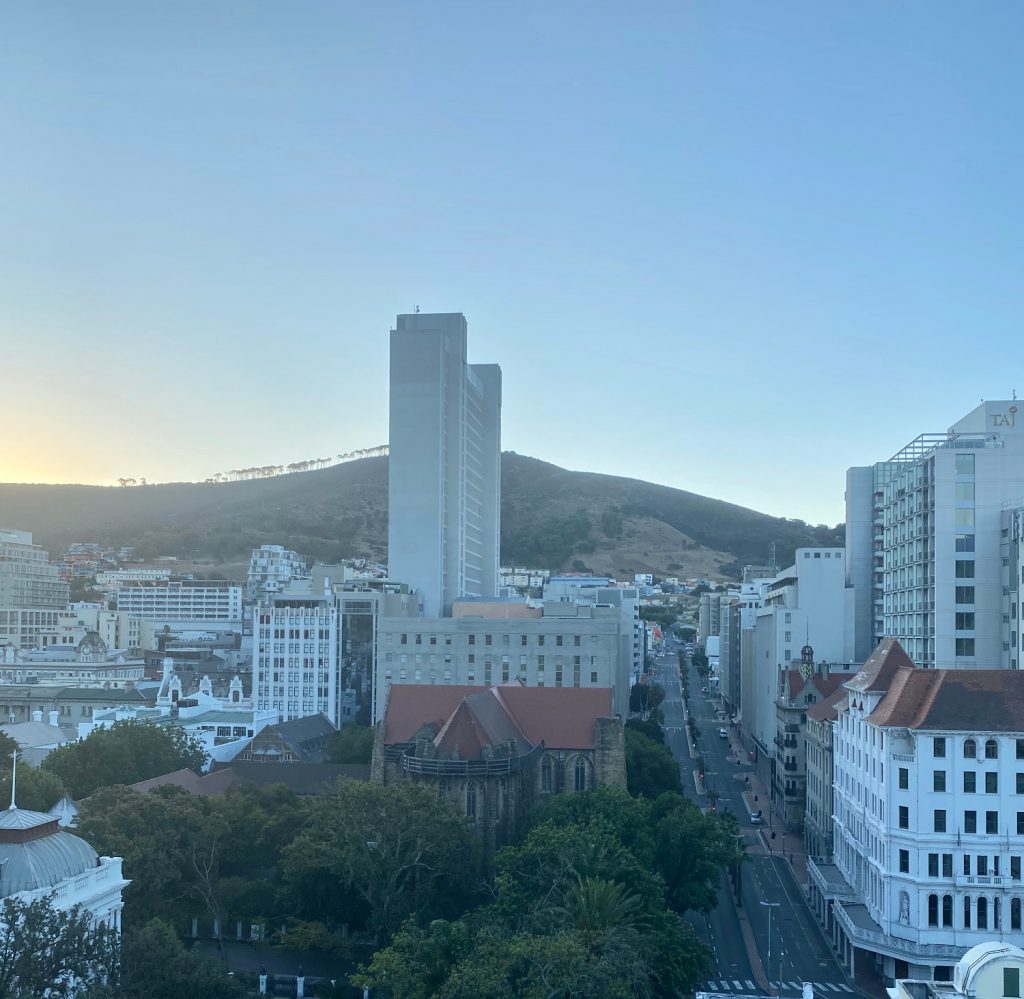
This morning’s morning observation from the 11th floor in Cape Town’s CBD was of a police car chasing a vehicle down Wale Street. No idea how that ended. Read that a favourite US singer-songwriter John Prine went into ICU diagnosed with Covid-19. Mentioned it to a fellow admirer and he said, “Get used to it there are going to be a lot of them.” He’s right. Get used to it. (But if Covid-19 takes out Keith Richards, then we best get used to the fact the whole world’s doomed.) Concocted numerous reasons to go out for supplies but stopped at the door. Listened, instead, to a video of the Berlin Philharmonic Digital Concert Hall on TV, beautifully filmed, with conductor Kirill Petrenko and pianist Daniel Barenboim performing Beethoven’s Concerto for Piano and Orchestra in C minor. You can find out more here:
Then listened to a video of Sir Michael Caine, sitting on a park bench reading Kipling’s poem, If. He did it some years ago.
And listened to a public service announcement by Siya Kolisi, the Springbok captain who lead the team to victory in the last Rugby World Cup.
Ended the day listening to the President addressing the nation. His gravitas has won the hearts and minds of many South Africans, especially those who had been so dismissive of his capabilities as a leader. Add him to the voices you should listen to in these times.
Day Five: Tuesday, 30 March 2020
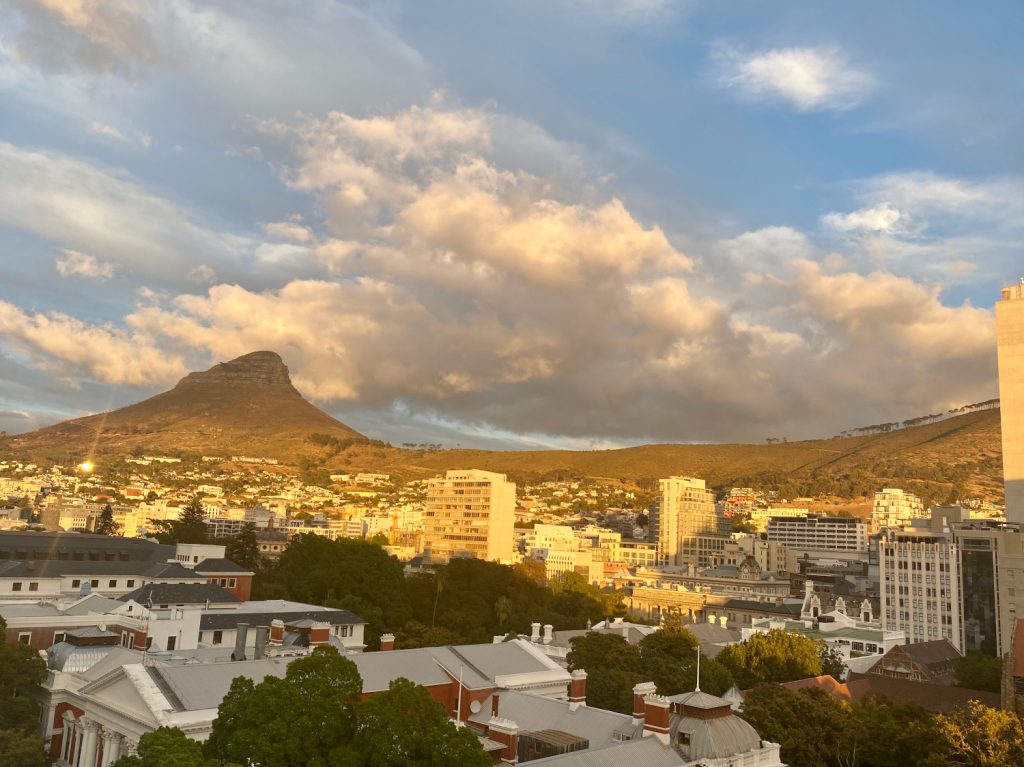
The hadeda ibis’ are tjatjarag this morning. Who knows what’s going down in the Company’s Garden below? A City of Cape Town water bowser growls up Wale Street, spraying water on to the street. Disinfecting? No idea. Can’t smell disinfectant from up here. I wait all day in vain for it to come down and spray the other side of the street. Drinking coffee and thinking about what President Ramaphosa said. (There are two “cafes” up here. One serves Ugandan coffee and the other Colombian. I visit both each morning to avoid accusations of favouritism. The barista is indifferent.) The President said he “went to meet the 114 South Africans who were evacuated from Wuhan in China” after 51 days of isolation, and then had been in quarantine in Polokwane for 14 days. Now, they were returning home, and would again be in lockdown for a further 17 days. He emphasised these 114 people, by the end of the South African lockdown, would have been isolated for more than 80 days. The message seemed clear: be prepared, South Africa, this lockdown could be extended. The garbage and recycling trucks are busy today. People on the frontline. During the day, there again seems to be 50 reasons to leave the apartment but these are just the stirrings of going stir crazy. As the sun sets, a man walks into the Company’s Gardens, and screams, “Fuck you! Fuck off!” Shrill and repeatedly. I wanted so badly to run out and join him. We would have made a perfect two-part harmony.
Day Six: Wednesday, 01 April 2020
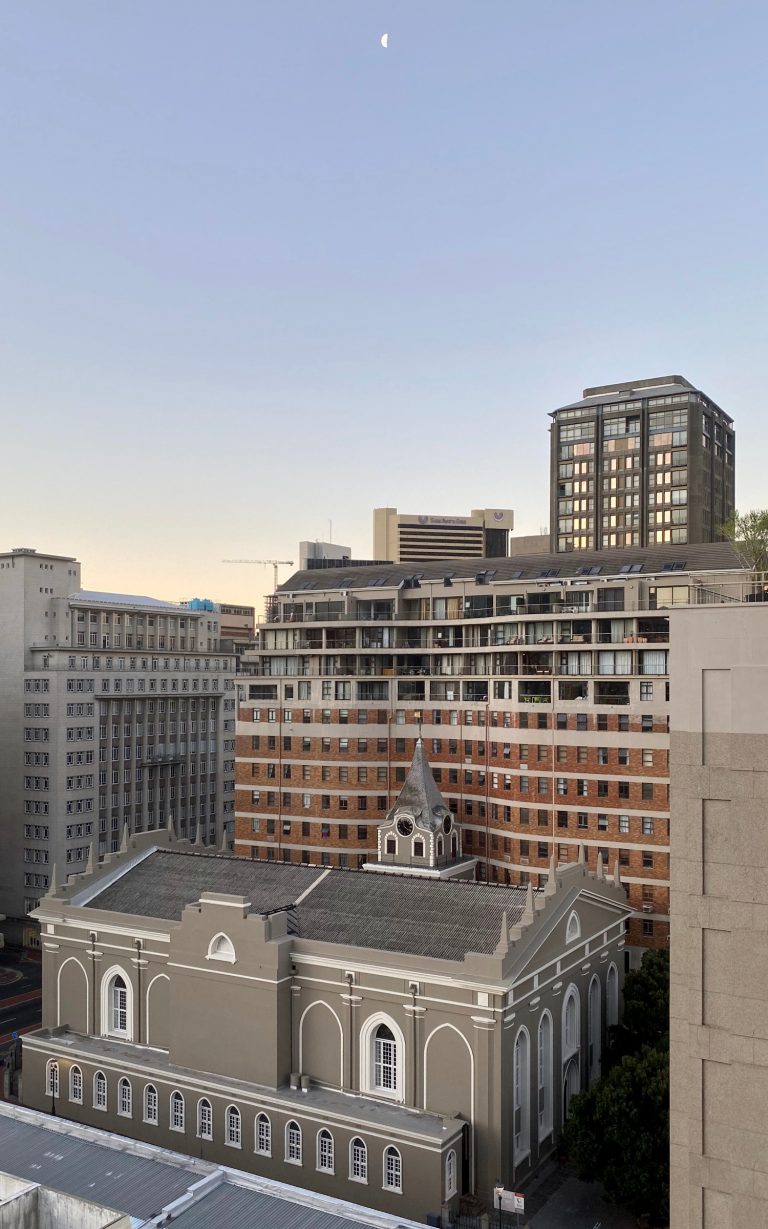
The wind hammered all night and has dropped. The morning is quiet, devoid even of birdsong. It’s laundry and house-cleaning day. The excitement is hard to contain. Later, needing to feel the earth underfoot, I go downstairs and step out on to the pavement. There are people on Church Square, sitting around, walking about, waiting. I have a mild panic attack and immediately go back upstairs. Read “Capitalism’s Triple Crisis”, an essay by Mariana Mazzucato, in which she argues “we can use the current state of emergency to start building a more inclusive and sustainable economy”. If you do anything during the lockdown, read her work. Listened to the first of the Financial Times’ FT Digital Dialogues [topic: “The Global Economic Emergency”]. Panellist Martin Wolf said he expected (hoped for?) an enormous party (“a sort of Danse Macabre”) after the pandemic is brought under control. On a more serious note, he said the only way to end this health crisis (and its massive concurrent economic crisis) was to strictly enforce lockdowns. This was echoed by fellow panellists, Rain Newton-Smith and Adair Turner. Meanwhile, in South Africa, the taxi associations threaten a showdown with the police and army if they are not allowed to fill their taxis to the maxi with commuters. A nation held hostage. It will, indeed, be a danse macabre. In the apartment block across the street, a grey-haired woman in a voluminous tie-dye kaftan, splashes of blues and whites and sprinkles of orange and purple, stands on her balcony and sings. Her voice doesn’t carry, the words are indistinct, the tune unrecognisable, and she is off-key. She stops picks up something from the floor and goes indoors. Harsh words drift up from the street below. An old man is feeding the pigeons and a security vehicle has pulled up alongside him. I’ve seen the old man before, stooped, thin as a praying mantis. Drives a faded-white worn-out VW Golf, parks on the side of Church Square, takes forever to get out the car, opens the trunk and slowly scoops birdseed into a cut-off litre-and-a-half plastic Coca-Cola bottle, then crosses on to the edge of the square and feeds the pigeons. Returns to the car, opens the trunk, and repeats. Then he slowly gets back into the car and even more slowly drives away. He probably figured the square was too exposed, so came down the side street below me. And was spotted. He argued with the security guys in the car but didn’t stop throwing down seed to the pigeons around his feet. When he was finished, he simply turned and walked away, slowly making his way past the car as if nothing had happened. My eyes are watering and my nose is running. No. Not ill. Just finished my supper of beef vindaloo that would be classified as illegal on the Scoville Heat Unit measure. Played an appropriate song.
Day Seven: Thursday, 02 April 2020
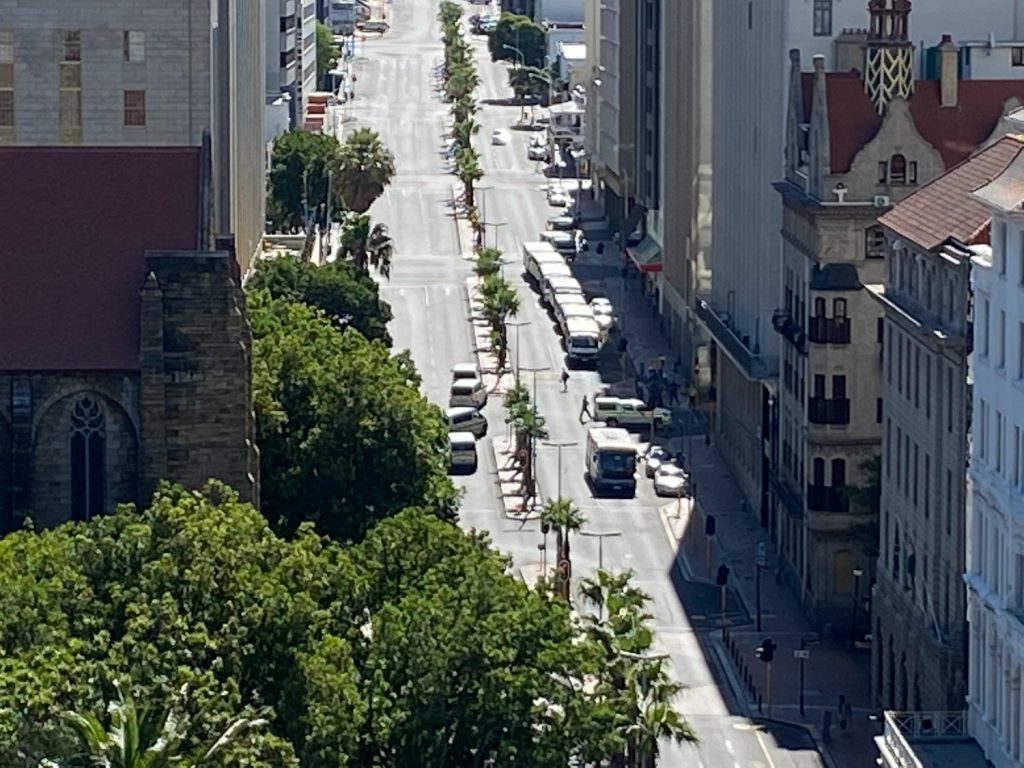
This morning the Egyptian geese in the Company’s Garden are upset. Don’t ask. I’ve no idea what rattles an Egyptian goose’s cage. Perhaps it is the two bearded men in tracksuits and dark glasses (before sunrise, by the way) strolling through the park. It certainly rattled the cops who parked opposite the entrance, obviously waiting for them to emerge. An altercation ensues, accompanied by flashing blue lights (but these being Cape Town cops, they had added an extra bank of orange lights which now were activated). The exchange — inaudible — is brief and the two guys shuffle off. Appears they are staying in one of the Airbnb’s in my apartment block. Read Yuval Noah Harari on the world after coronavirus. He says: “In this time of crisis, we face two particularly important choices. The first is between totalitarian surveillance and citizen empowerment. The second is between nationalist isolation and global solidarity.” I focus on the first. Then, mid-morning, the sound of horses hooves on asphalt and the city’s mounted police saunter down Wale Street. Love horses, so this is a delight. The next time I look up, six or eight large police lock-up wagons are lining Wale Street, and an hour later police cars block the street while municipal buses — Golden Arrow – “the bus for us!” — line up to go down Burg Street, which leads into Greenmarket Street. I stop counting after bus 11. The presumption is the last of the refugees seeking shelter in the church on Greenmarket Square are being (forcibly?) relocated. It took a couple of hours. We know how to do this stuff in South Africa. Harari says a lot, and to pull quotes from his essay does his writing a disservice, but he does make an important point, “The coronavirus epidemic is thus a major test of citizenship. In the days ahead, each one of us should choose to trust scientific data and healthcare experts over unfounded conspiracy theories and self-serving politicians.” As ever, my friend Susie Bright reminds me of the power of song. “Hey, mister, can you tell me where a man might find a bed?/He just grinned and shook my hand, ‘no’, was all he said.” Greenmarket Square is clean tonight; are we?
Day Eight: Friday, 03 April 2020
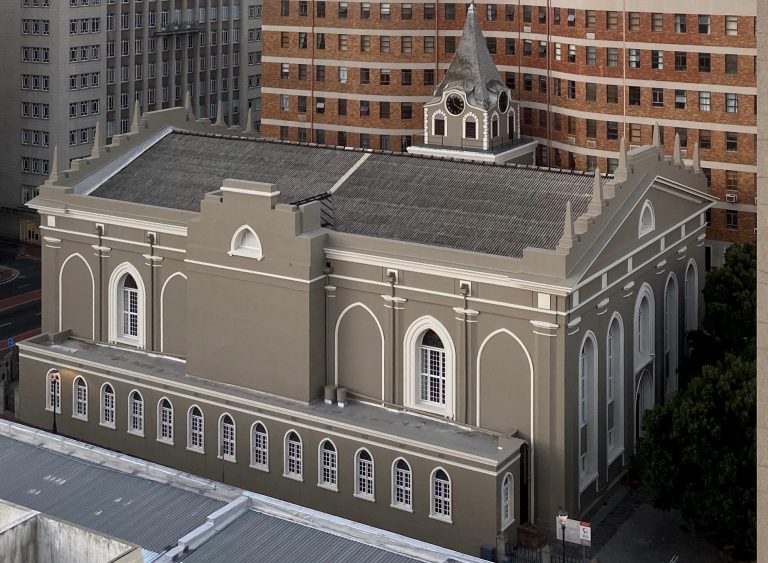
So, the café on the 11th floor offering Ugandan coffee beans closed — supply chain problems. The one serving Colombian coffee has taken over both premises and so we only have one café left up here. But, at least I still have a café. Down below is the Groot Kerk (Great Church), built in 1841 and which replaced the original church that was built on this ground in 1704. It is now the headquarters of Nederduits Gereformeerde Kerk (NGK), the most prominent Dutch Reformed Church in South Africa. It’s a solid building with a clock tower. The clockface is currently stuck at four o’clock. Along the western wall, are thirteen arched windows, and on the floor above two massive arched windows. The irregularity creates an architectural harmony only possible when viewed from above. At ground level, the effect is blunt. It strikes me that a 21-day lockdown will not be enough. At a virtual company “happy hour”, a colleague recites a poem she has written for the time. Another colleague challenges me to make it into a song for guitar. Make a quick stab at it, and send the recording to the poet. Not heard anything back. I am wedded to three chord melodies.
Day Nine: Saturday, 04 April 2020
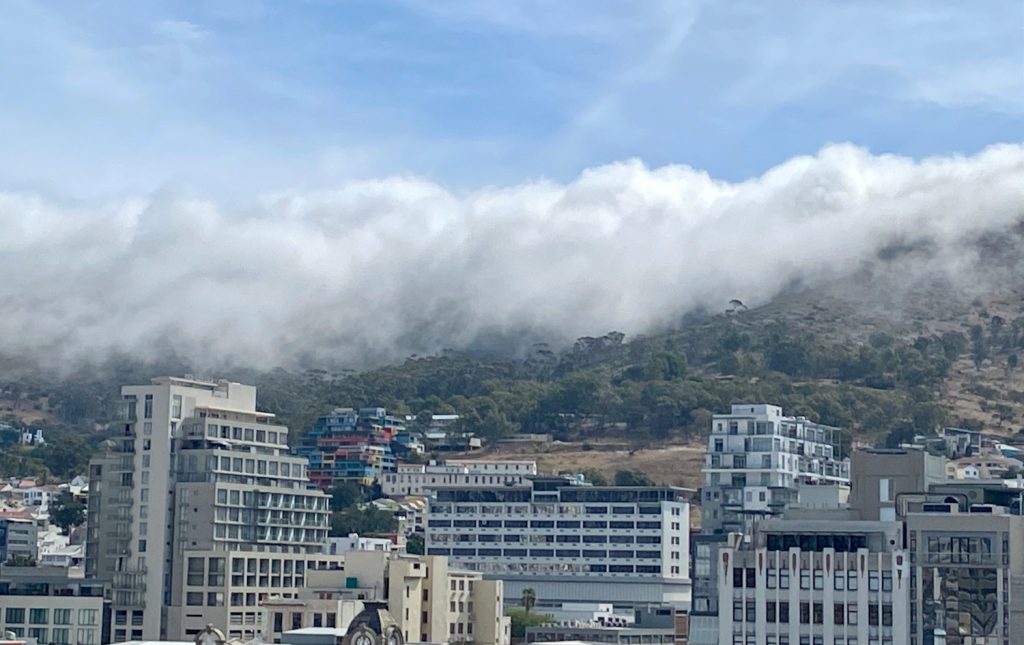
An hour or two after the first cup of coffee, around eight o’clock, a woman walks down Wale Street with a child. The child pushes an empty supermarket trolley and the doorman outside the Taj Hotel waves. The woman stops to light a cigarette. The two turn down St George’s Mall. The mist rolls over Signal Hill and down into the City Bowl. Sign on to Netflix, and am soon inundated with messages stating, “watch one of our top picks for you”. It’s like a bellicose uncle at your fifth birthday party, telling you every five minutes how to ride the bicycle you just got as a present. Someone points out, due to the lockdown, we are communicating more often with each other. It’s true. It may be simply one-liners, asking after each other’s health, or about the weather. But we’re doing it, and often. It’s heartening. A friend says she may resort to making cider due to the government ban on liquor sales during the lockdown. Read a McKinsey study on the effect of COVID-19 on mental health and substance abuse. It loops me back to the 5th Science Forum South Africa held in December last year at the CSIR in Pretoria. The keynote address was delivered by Prof Michel Kazatchkine, who spoke on harm reduction practices around nicotine and alcohol. He argued drug policy should move from being one of suppression (ie prohibition — a criminal justice policy issue) to one of public health — a health and human rights issue. Nicotine is addictive — only 4% of people who smoke can give it up. Alternatives — harm reduction — need to be found. There are more than 7 000 carcinogens in the smoke inhaled by smokers, but nicotine is not one of them. Apparently. If science can find an alternative way to deliver the nicotine to the smoker, such a harm reduction should be explored and implemented, as has been done with heroin addicts put on to methadone. (Someone pointed out during the discussion after the address, the SA Ministry of Health had run out of supplies of methadone, and had not ordered more, mainly because heroin addicts — drugs addicts in general — were viewed as a criminal justice system issue, not a health issue.) In the context of COVID-19, this may seem irrelevant. The ban on cigarette sales (and alcohol), however, will be traumatic for those addicted, and will probably lead to a prohibition-style blackmarket of liquor and tobacco sales, run by organised crime. May be wrong, but this seems like one of those unintended consequences that will be cited in future case studies. Play some music.
Day Ten: Sunday, 05 April 2020
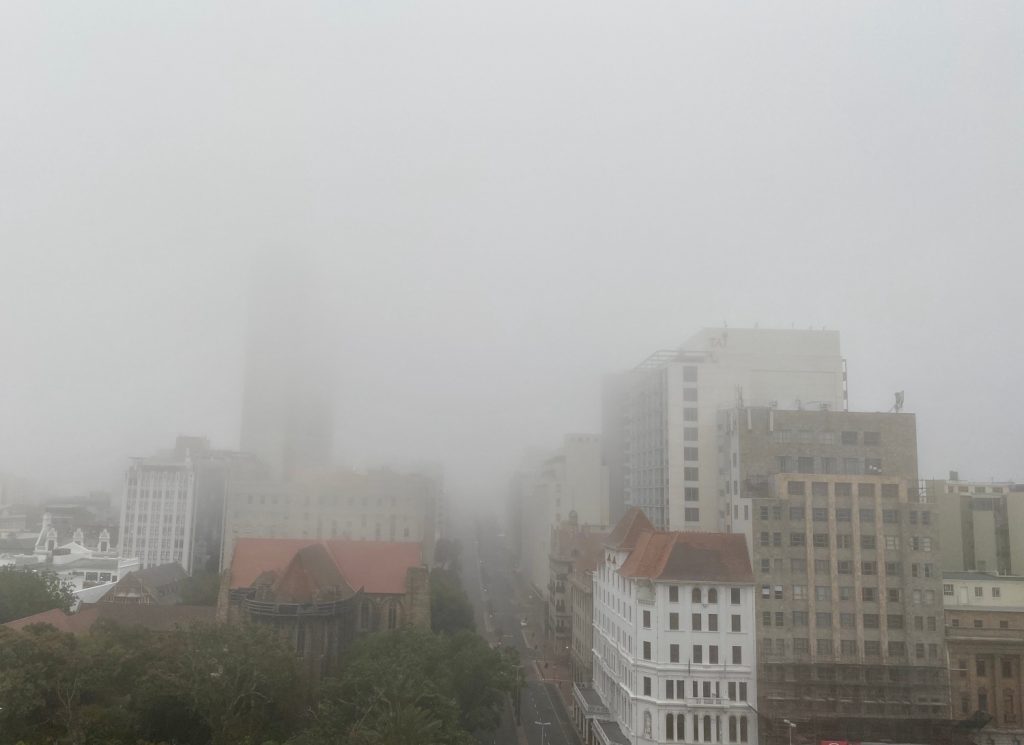
Wake to a city swathed in mist. It’s beautiful and soft. Some starlings are scrapping outside. Haven’t heard them in a while, so wonder what’s up. And though it’s Sunday — the proverbial day of rest — decide to do the weekday regime of walking down the stairs and running back up — 11 floors. Decide after one round to keep the sabbath. Blame the Saturday night virtual dinner party. Do the morning sanitising regime — spray the soles of my running shoes, wipe the floors, surfaces, and handles with bleach/water, throw clothes in the washing machine, shower, make coffee. Stand on the balcony and watch people I’ll never meet. And because it’s Sunday, some classics are in order. Once again, it’s the Berlin Philharmonic: Mahler’s Third Symphony with Elīna Garanča and Lorenzo Viotti. Autumn has arrived. By late afternoon, a gentle rain falls, and the temperature drops. My work requires preparing a daily global summary of the impact of COVID-19. It means almost everything my friends send me about the virus, I have seen three times before. I use the delete button a lot. But there was one story I didn’t delete. Jonathan Smith, a lecturer in epidemiology at Yale University, wrote a letter to his neighbourhood of about 50 families, which has been widely circulated. Listen to the experts. Warm up left over curry and listen to a song or two.
Day Eleven: Monday, 6 April 2020
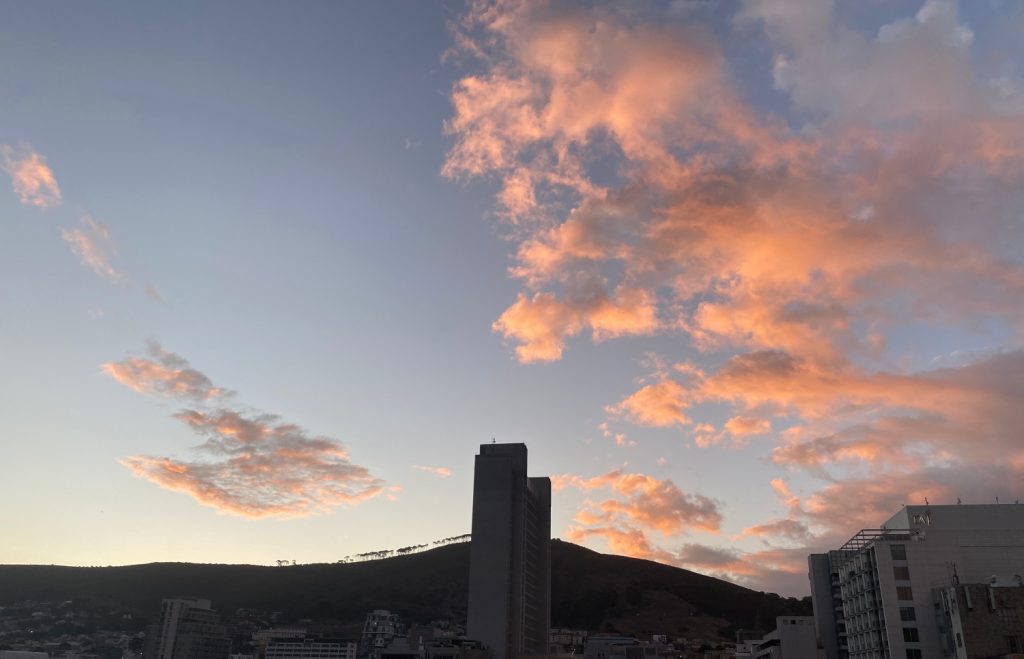
Watch the raindrops swirl and float, pushed about up here by gentle gusts. The streets gleam glimmerous and wetly in the gloam (apologies L. Carroll). Read a news report — and this one demands no check on whether it’s fake or not because the moral of the story is so important — that the Prime Minister of New Zealand Jacinda Ardern went on television, and told the country’s children, the government decided Tooth Fairies and the Easter Bunny were “essential workers”, and would be allowed to go about their business. You have to love it because it’s about compassion, because it’s about the lightness of leadership and intuitive integrity, because it’s honest and true, and because it’s Jacinda Ardern. So, people out there with children, that’s how you teach your children. The song my colleague and I have been working on is beginning to take shape — and we’re sticking to the adage that all it needs is “three chords and the truth” — and she’s a truth-teller, so that’s covered. I only know three chords so that’s also sorted. In 1997, Sara Evans released an album with that title. Two years later Van Morrison released an album with the same name. Love them both. Listened to the speech by Queen Elizabeth II. Around 530 words, delivered in a little over four minutes, a lesson in speechwriting and oratory. Read Elizabeth Kolbert’s mesmerising “Pandemics and the shape of human history”. She writes, “Epidemics are, by their very nature, divisive. The neighbour you might, in better times, turn to for help becomes a possible source of infection. The rituals of daily life become opportunities for transmission; the authorities enforcing quarantine become agents of oppression.”
Day Twelve: Tuesday, 07 April 2020
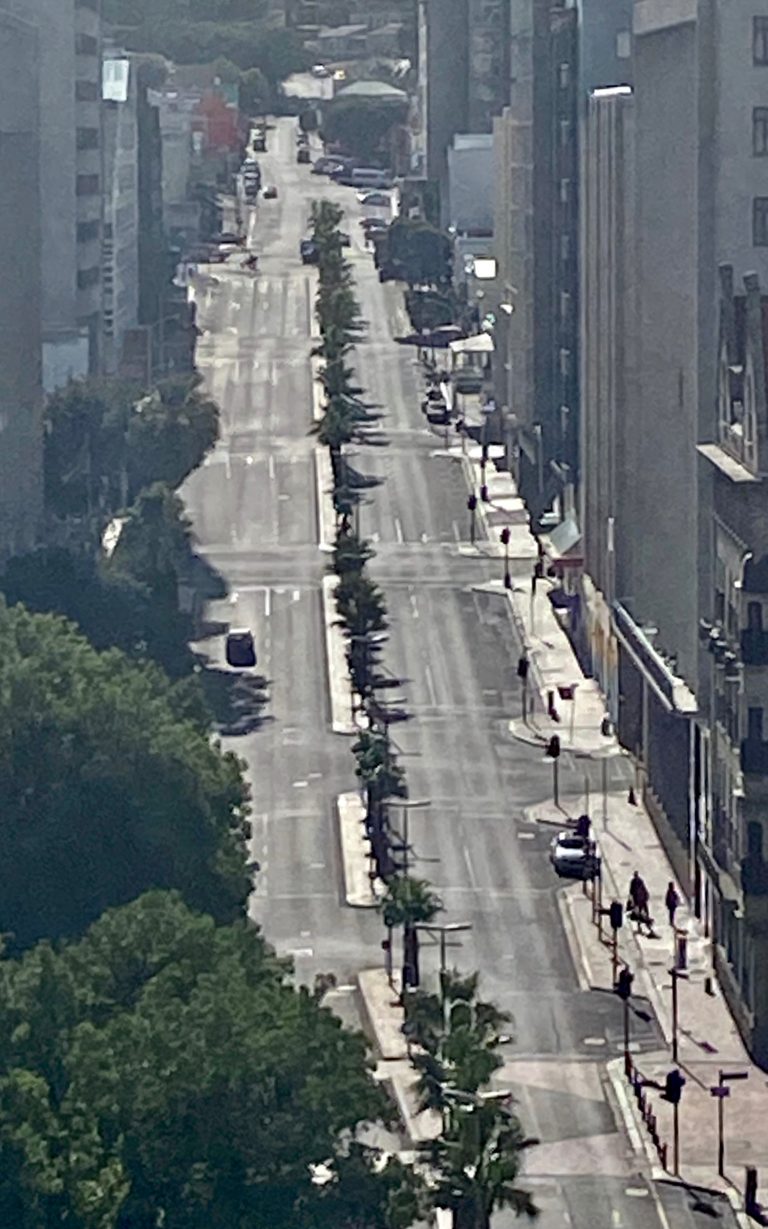
At 2:30 am, a police car screams up Wale Street, sirens wailing. Following the sounds has become easier over the last 12 days. Why not just have your lights flashing? Surely, the siren is used to clear crowded streets. There are no cars on the street. Four hours later, a car alarm goes off. Pause. Again. Pause. Then again. Walk onto the balcony. Silence.The street should be empty. But it’s not. People are walking. There are more cars. On the corner of Wale Street and Buitengracht each evening a group of men congregate. They pull up in their cars, get out, lean against the bonnets, and chat. There is no social distancing. It’s casual, carefree, suicidal, and homicidal. Silent, delayed manslaughter. I recall the terrifying words of the Yale University epidemiologist Jonathan Smith [see Day Ten]. This is the core message. This is exactly what it is. You think you are alone on the street, so you’ll go for a run? Walk your dog? You are not alone. You’re just chatting.
“If your son visits his girlfriend, and you later sneak over for coffee with a neighbour, your neighbour is now connected to the infected office worker that your son’s girlfriend’s mother shook hands with. This sounds silly, it’s not. This is not a joke or hypothetical. We as epidemiologists see it borne out in the data time and time again. Conversely, any break in that chain breaks disease transmission along that chain.”
A cricket seeks shelter in my home. I can’t find him. We sing ourselves into a slow, meandering slumber. The next morning, I find him, under the Nguni cowhide rug, cup him in my hands, and launch him off the balcony. He flutters his wings, spirals and spirals, and lands on the ground floor garden. I shall miss him. As visitors will miss Cape Town.
Day Thirteen: Wednesday, 08 April 2020
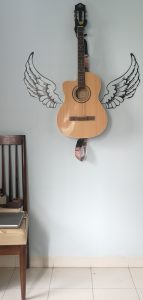
No words. COVID-19. John Prine died today. Few men could tell your whole heart song in fewer words, in a plainer melody, or more honestly. RIP.
This obituary was sent by a friend. Worth a read.
Day Fourteen: Thursday, 09 April 2020
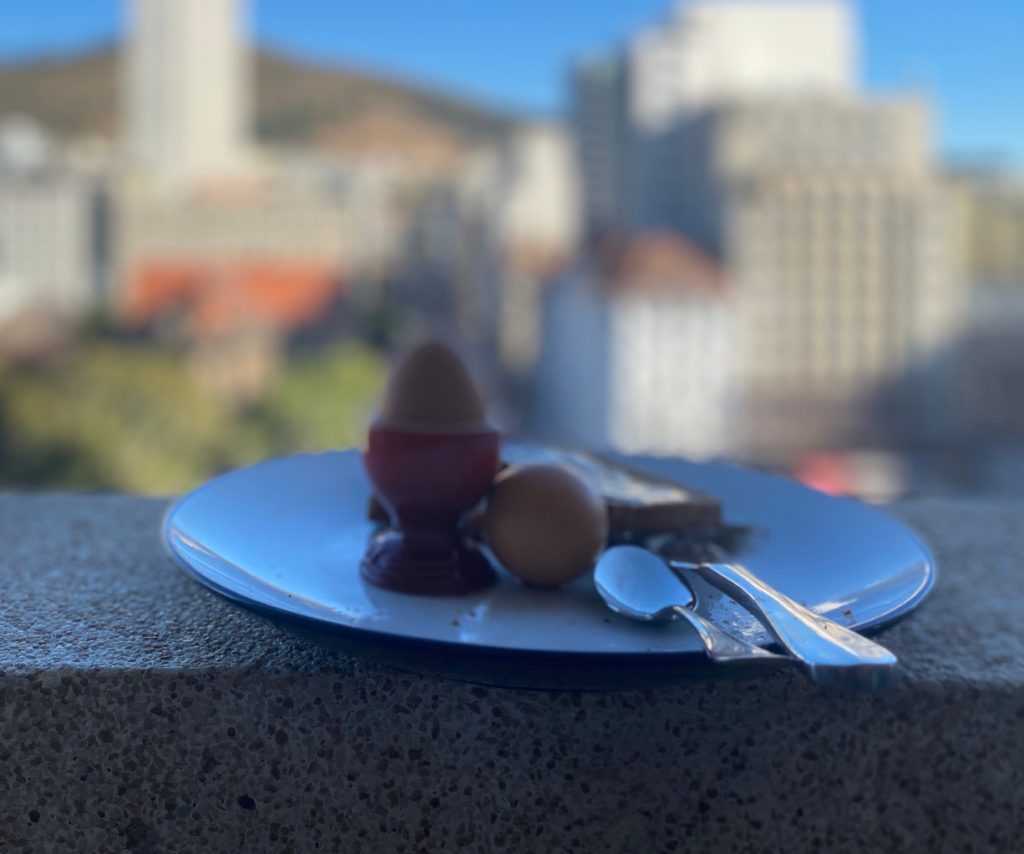
Sleepless night. Today marks the fourteenth day since meeting with a friend who had met with a man a few days previously, and this same man tested positive a few days later. So, this is the day of reckoning. Immediately, hypochondria erupts. As a friend said later, “We all have COVID days.” Today was that. Breakfast on the balcony. Work. Take a siesta and wake feeling fine. Turns out lack of sleep was the problem. The fabulous poem my colleague wrote and to which I added three chords premiered in the afternoon. Humbling, proud moment. Small things remain the delight of our days. This should always be so, and reminders are good. Using the time to sort through letters, notes, poems, diaries, sketches, an accumulated, random, poignant, meaningless patinate of moments, observations, reflections. Came across a copy of a letter to my dad, written 34 years ago, after meeting him for lunch in Vryheid. We had not seen each other for more than 11 years and went to a café and each ordered a mixed grill, my childhood favourite. The letter contains a rambling story about hitch-hiking to Namibia. Then, in a brief paragraph, I said, “… there is so much to tell you, Dad. It has been my harshest ‘lesson of youth’ to realise how much I had to grow up before I could even begin to talk with you.” I promised him when I returned again to South Africa, we would go to the Kruger National Park. We never did. Turn to music. Another late night. Outside the city murmurs sounds of survival, a medley of indistinct voices, vague music, cars, alarms. Talk to your father.
Day Fifteen: Friday, 10 April 2020
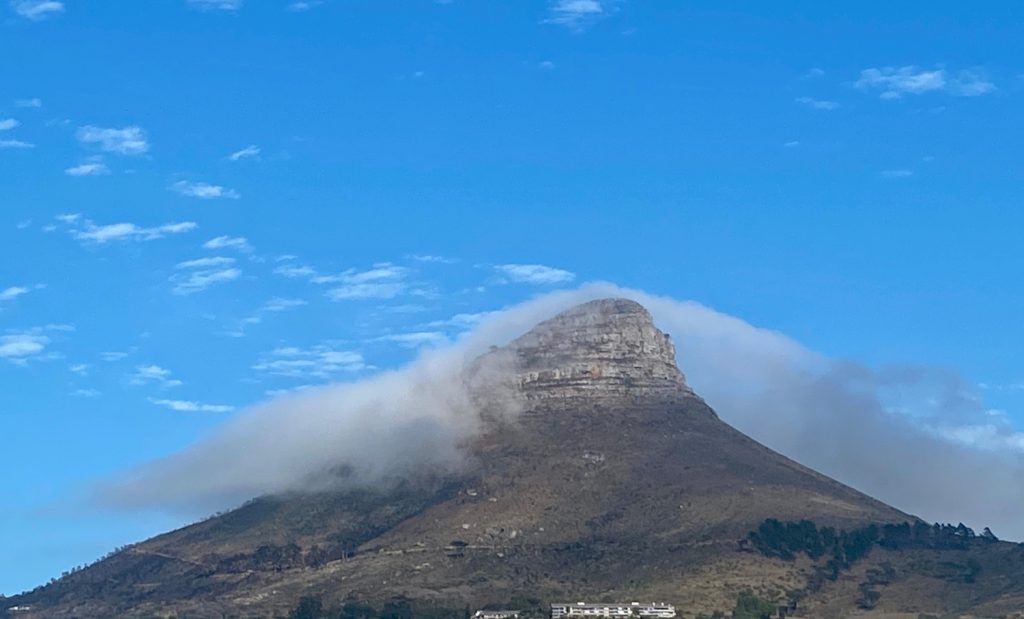
The Egyptian geese and hadeda clamour in the Company’s Garden. Good Friday — Karfreitag — also once referred to as “long” Friday by Anglo-Saxons. A man draped in a blanket carrying a dirty white sack over his shoulder limps up Wale Street, shouting. A good friend writes, talking about lockdown in Switzerland, questioning the confinement of his flat and what he calls his “terrible itch” to “convert it into something productive”. He will. He is a gifted musician. He seems to read my mind, as he says it would be good to have a braai. And, if there is one thing that’s missing, it is a braai. Easter is legs of lamb on the coals, company, and wine. This year forgot to even buy lamb. Make guacamole instead and eat it with toasted pita bread. Go online and order a leg of lamb. It will arrive on 28 April. The Lockdown Drinks group are now swapping recipes on how to make alcoholic beverages with sparse supplies. No good will come of it. The Economist, with its special coronavirus reportage, writes about the “fissures within religions” caused by the pandemic, a secular way of discussing Passover and Easter, I suppose. The fissure, says the article, is “between science-defiers and those who respect the laboratory”. But this is more ulceration than linear cleft. The rapid spread of COVID-19 in South Korea is traced to a church gathering of the “members of the secretive Shincheonji Church of Jesus [who] contracted the virus at packed services and spread it”. In the USA, Florida governor “Ron DeSantis, listed religious activities among ‘essential services’ that could continue (without crowds) despite a lockdown”, and an “Islamic gathering in Malaysia in February helped spread the virus to neighbouring countries”. In Israel, the orthodox Haredim in the city of Bnei Brek defied the state and have “have insisted on gathering for prayers, weddings and funerals”. It is a COVID-19 “hotspot”. Here, despite mutterings of unrest from some religious leaders, the Zion Christian Church’s Easter Pilgrimage to Moria was stopped due to the lockdown. Normally, more than ten million people converge here annually. The rhetoric of religious leaders who defy science is as misguided and dangerous as those who continue to phrase the argument in terms of war — I know, I repeat myself. In the straightforward words of German President Steinmeier: “No, this pandemic is not a war. Nations do not stand against nations, nor soldiers against soldiers. Rather it is a test of our humanity. It brings out the best and worst in people. Let’s show each other the best in us.” We need a little mercy now. It’s going to be a long day.
Day Sixteen: Saturday, 11 April 2020
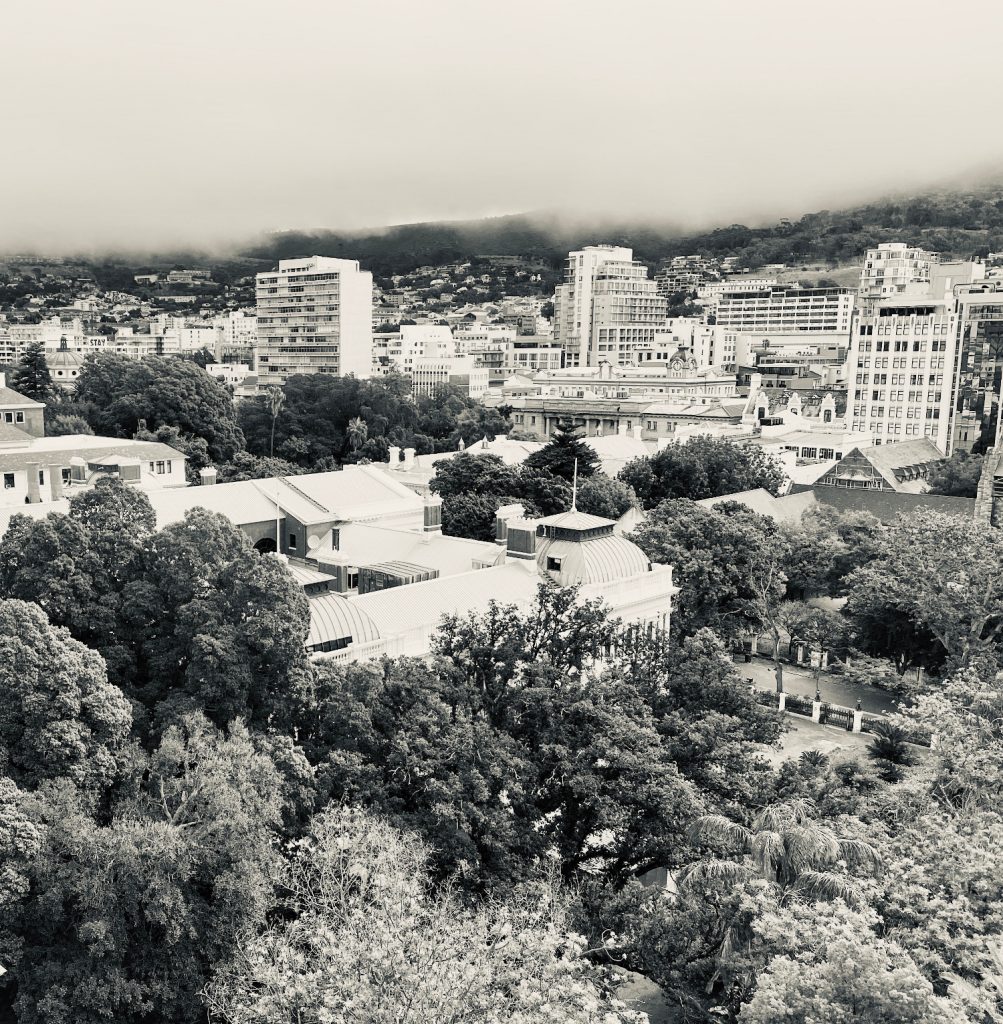
The morning is cold. Make plans to restore the Ugandan coffee shop supply chain. Decide the sheepskin rug ordered before lockdown needs to be delivered. It’s an essential item: a blanket, providing warmth and security. Never underestimate the power of a security blanky. Make arrangements with a courier company. Spend the afternoon wrapped and watching TV streams. Hollywood is going bust because they ignored streaming. Of course, weep copious tears over this. Fortunately, have my security blanky, and move on quickly. A German-made six-part series, Perfume, very loosely adapted from Patrick Suskind’s novel. It meanders. It steps into deep streams of childhood cruelty, sexual awakening, and degradation. It swaggers along the smudged sticky line of “once-seen-never-forgotten” grotesque, steps into the bleak dreary shadows cast by violence and evil. Walks the nature of the game. Read a short essay in The Paris Review commenting on Montaigne’s essay “Of Experience”. Return to the original essay. The first sentence — “There is no desire more natural than that of knowledge.” — and you just know had he written that in these times someone would have tweeted, “Fake news!” Within this essay, a rambling concoction of reminiscences, medical diagnosis, philosophical quibbling, advice and admonition, Montaigne notes, “one is not so much to regard what [one] eats, as with whom”. Some 250 years later, Brillat-Savarin in The Physiology of Taste wrote, “Tell me what you eat and I will tell you what you are.” For me, tell me with whom you eat, and I will tell you who you are. There is muttering on social media as to what to do when the lockdown ends. With whom will you first break bread?
Day Seventeen: Sunday, 12 April 2020
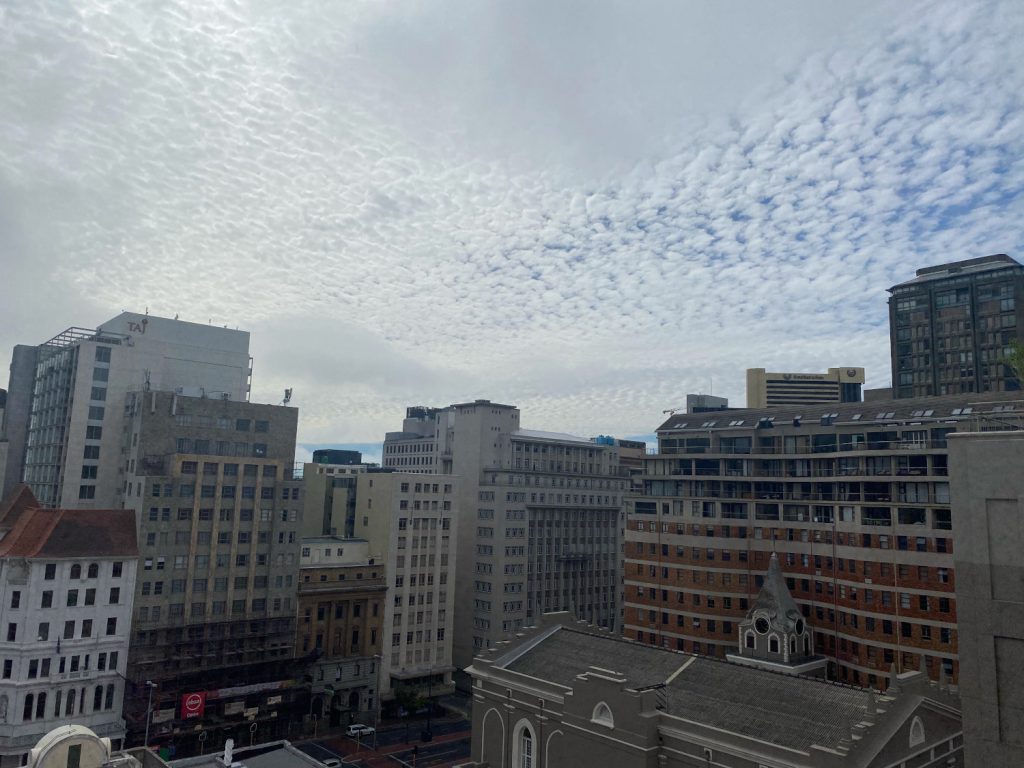
The seagulls screech their return. Perhaps, the streets being so clean with no scraps to scavenge kept them closer to the shoreline, but here they are. The streets are even cleaner. Every day — excepting Sunday and public holidays — a team of yellow-clad workers move slowly and deliberately along the streets, sweeping and gathering the frugal remains of a city whose streets are empty. Or sort of. A block away is a COVID-19 testing clinic, and during the week the number of people lined up stretches half a block. The man in the blanket crosses Wale Street, his limp less pronounced, his tongue silent. Start reading an essay about “power laws, and nonlinear relationships” that opens with a quote from Alan Bartlett: “The greatest shortcoming of the human race is our inability to understand the exponential function.” Google says he’s an emeritus professor of nuclear physics at the University of Colorado at Boulder, remembered for his work on exponential growth and population. The essay starts using a simple linear scaling law and moves to nonlinear.(had to have my senior godboy explain the math — which he did in two sentences, and which the writer failed in 600 words.) Should have stopped at the first use of an exclamation mark to end a fairly desultory paragraph. Thought it would be about relationships and society but it devolved into a “how to use this thinking to improve your investments”. Had to clear my mind of this do re mi obsession (prominent in US writers) and watch the train leave the station. Trust Bartlett was making an in-joke among physicists. Even a child understands you whisper to your best friend to never tell, but you kissed your girlfriend, and within 12 minutes the entire playground knows. One challenge of lockdown is to remain discerning in your reading. So much time… best not waste it.
Day Eighteen: Monday, 13 April 2020
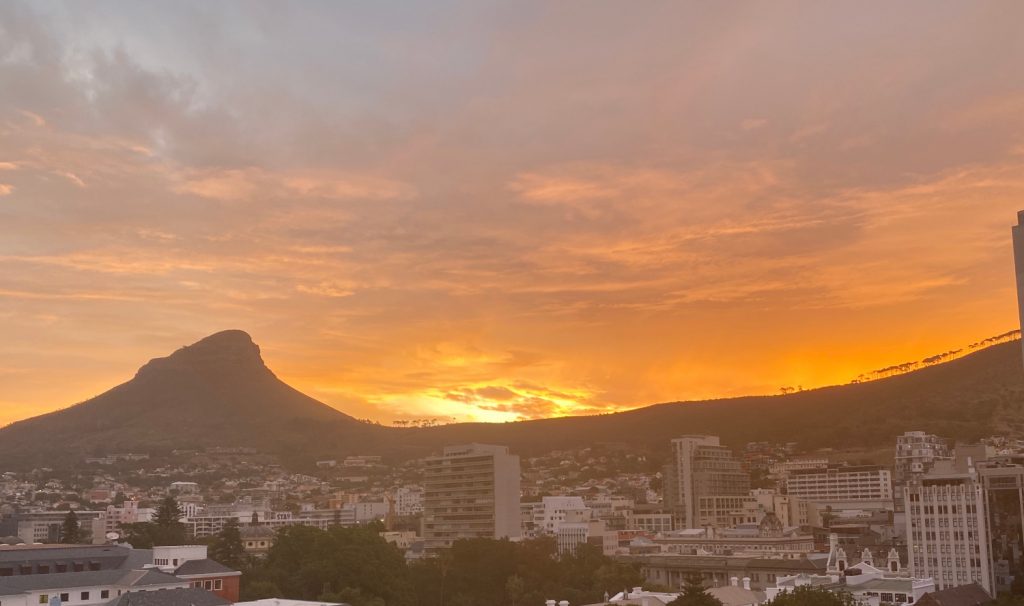
Easter Monday. Try and treat the day like any other weekday, determine to do two circuits of the stairwell. Decide after the first this is a day of rest. Make coffee, thinking about the re-opening of the Ugandan Café. A friend in Switzerland sends me a message, asking, “What would you say is the most positive thing about lockdown and corona?” I make a second pot of coffee and prepare breakfast. She’s precious to me, so flippancy — default position — is out. Eventually, I write, “A number of things. Becoming reacquainted with the necessity of reflection, readjusting my priorities, reading more widely and hopefully more deeply, but mainly learning to laugh again, and how to live alone.” Throw the question back at her, and she has the best answer. She writes she now has “time to focus even more on the little things, I am sooo delighted by the birds whistling, the sun shining, the different shades of green and all the blooming flowers”. She ends by saying, “We can’t change the situation but we can change our minds, I guess?” My heart fills with this person.
Day Nineteen: Tuesday, 14 April 2020
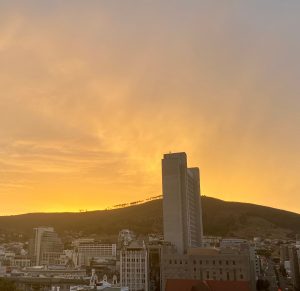
This is a workday. Do the stairwell. Once. Standing on the balcony, an erratic flock of seven Egyptian geese fly west. The blanket man walks slowly down Wale Street, no longer limping, but shouting, and gesticulating wildly with one arm. He moves out of sight down St George’s Mall. A friend sends me an essay, “Prepare for the Ultimate Gaslighting”. Though USA-focused, certain truths emerge. “What happened is inexplicably incredible. It’s the greatest gift ever unwrapped. Not the deaths, not the virus, but The Great Pause. It is, in a word, profound.” And maybe he is right. Well, maybe profound takes it too far. It seems to be the new buzz word now that “epiphany” has passed its sell-by date. Maybe my dear friend in Switzerland is right. We can change our attitude, and not succumb to the massive gaslighting that will be unleashed. And on that, the essay writer is right. Gaslighting is the default position.
Day Twenty: Wednesday, 15 April 2020
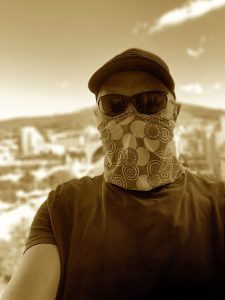
Wake to the anxious chuttering of guinea fowl. They’re like an elderly coffee klatch whose coffee has been spiked with acid. Maybe they’re a little excited by the overcast weather. It may be the sort of thing a guinea fowl would chutter about. We should be chuttering too, According to the Economist, Apple and Google — “… the two companies have access to a planet-spanning network of sensors and computing power some 3.5bn devices strong. They plan to combine their assets to assist the tracking of the covid-19 pandemic”. Reminds me of the morally moribund Facebook which has access to more than one billion people and sells all that data to anyone, for any purpose, while claiming it never did and never would. Of course, Apple and Google also would never do that… Be prepared for Big Brother in ways Orwell never imagined. I put on my shopping outfit and go out for milk, olive oil, and to re-open the Ugandan coffee supply chain. You always need one more cup of coffee.
Day Twenty-One: Thursday, 16 April 2020
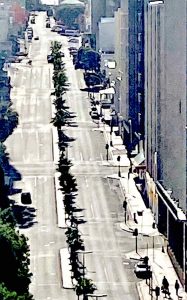
Emerge from a night that slipped between insomnia-induced staring-at-the-ceiling immobility to duvet-tossing, pillow-pummelling sleeplessness. A friend is troubled. The resolution will only bring regret and remorse and pain. If that is the case, should we talk of resolution? Not the time to be philosophical. The apartment closes in. Step on to the balcony. Wale Street, two strips of micaceous grey asphalt reflected through the cirrostratus clouds, stretches north. A man runs, his backpack bouncing, slows to a walk, loosening his tie, and then jogs on, turning into St George’s Mall. A street cleaner, leaning against a building, watches, and then pushes herself off the wall, shakes her broom, and starts sweeping the empty pavement. She moves slowly, in a tight circle, and eventually comes, again, to rest against the wall. Fifty reasons to leave the apartment present themselves. I go out, walking fast, across Adderley Street, right onto St George’s Mall and find Woolworths is closed. Cross Adderley Street into a store in the Golden Acre shopping mall and I know this is a mistake. It’s too crowded. Grab a box of Panadol, a handful of instant yeast packets, and a bottle of bleach. Standing in the checkout line, a young dishevelled man, walks up and shoves a loaf of bread into my basket, and says, “Buy that for me, my man. Please.” I tell him to go stand on the other side of the checkout counter. I pay. The checkout person knows the story. She hands him the bread, he nods at me and walks away. Walk home, back up Adderley Street, fast. Listen to Emmylou Harris and nostalgia. Read a McKinsey report. “Winning against COVID-19: The implications for biopharma”. One sentence jumps out: “How companies act individually and collectively in the next few weeks and months will shape the outcome of the pandemic and the reputation of the biopharma industry for decades to come.” This may be true for all industries.
Day Twenty-two: Friday, 17 April 2020
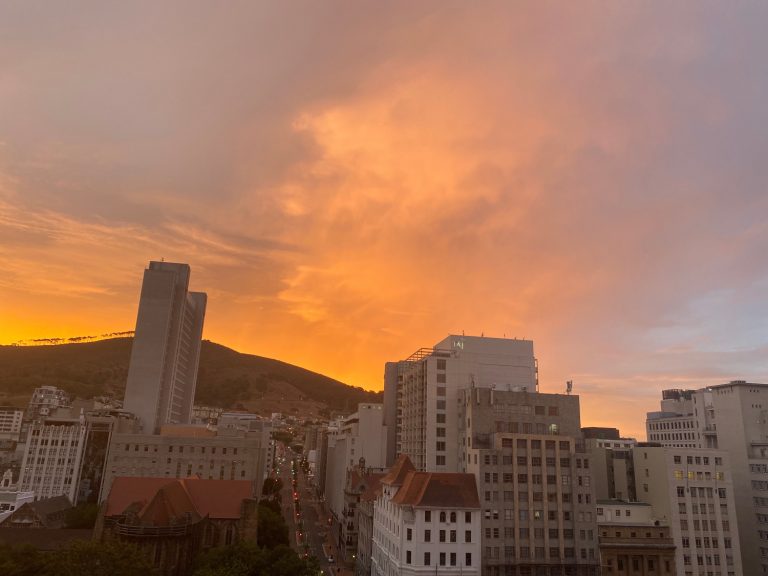
A friend, the chef-patron of a restaurant, tells me when the lockdown was announced, she walked into the kitchen, picked up a plate and smashed it on the floor. When she reached for the second plate, a sous chef stepped up, calmly and swiftly, and smothered her with a hug. Held her. Told her this would pass. Held her tighter. And, for the moment, it passed. I talk to her daily. She’s as wise as the free big sky country that shelters her, has the courage of a lioness with cubs, is as honest and strong as a six-burner gas hob, sharper than a butcher’s knife, and has a smile big enough to open the best bottle of champagne in any house. We discuss an essay, “Why Restaurants Are So Fucked.” Yes, she says, this is exactly it. I sense if there was a plate nearby, she would smash it. She worries about her mother. This is lockdown. Outside, on Wale Street, a group of people stand on the pavement, listening to a man holding court. They seem unimpressed. A few of them separate and wander onto the empty street. A car slows to a halt. No one moves. Sort of Mexican stand-off but nobody’s got any skin in this lockdown game and, eventually, with no hooting or harsh words, the car is allowed to pass. The man stops shouting. A friend calls. We talk about courage. She tells me to listen to Brené Brown talking about vulnerability. Don’t the sun look good going down over the sea…
Day Twenty-three: Saturday, 18 April 2020
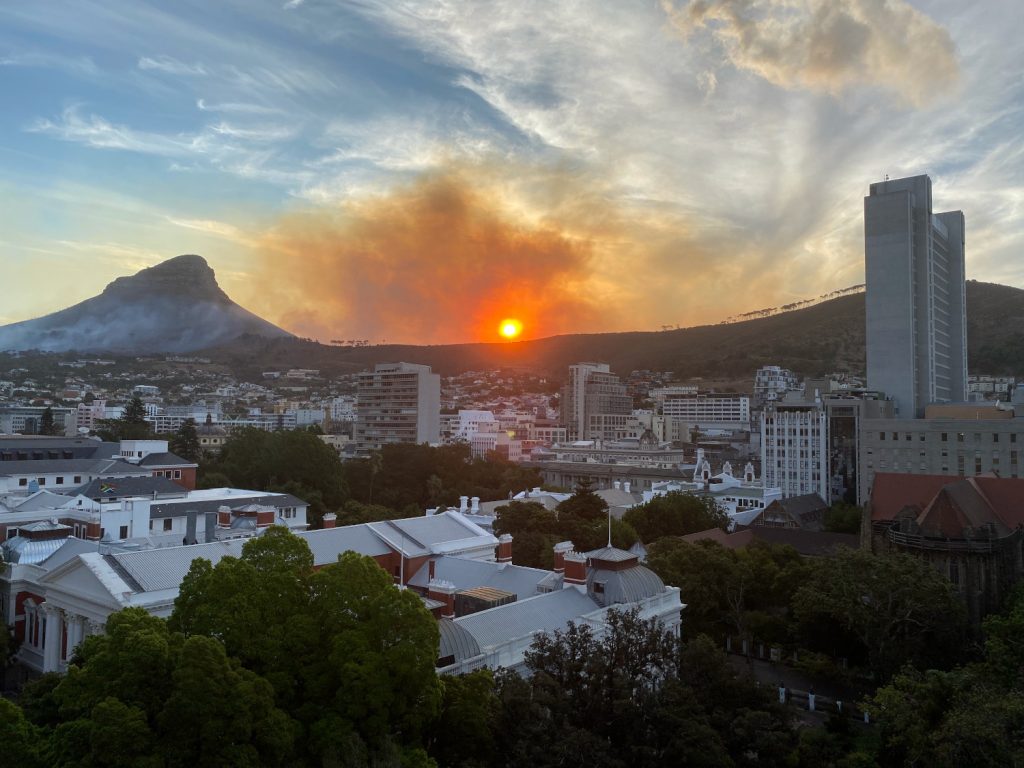
Grew up on farms and small towns and found my place in cities; loved the anonymity encountered on moving to London, Athens, Khartoum, Oakland, Cape Town; relish the diversity a bus-ride away, the walk within urbanscapes changing daily, shops close, others open, old-timers on the block, unchanged in their routine, people moving in, people moving on, people unsure of their bearings, the audible assault of the sound of rubber on asphalt, the electrical thrum of a populous, relentless machine, the soft grinding hum of perpetual movement. At some point, quickly reached, these noises overlay your aural world, become as habitual as tying a shoelace. Then one night, the city shuts down. And the sounds emerge from the white noise cocoon. Lie in bed awake before sunrise and hear a muezzin in the Bo-Kaap remind the faithful it’s time for the first of the five daily salah (prayers), Fajr. With the city so quiet, you hear all five of the muezzin’s adhans (calls) to prayer: the Dhuhr, ‘Asr, Maghrib, and ‘Isha. The Uganda Café has re-opened. Sip coffee and watch red-winged starlings swoop up the edge of the apartment block, whistling like randy schoolboys. A lost friend sends a video, Secret to Life. The narrator speaks of the slowness of winter, of this season as a time “when you can be quieter and think more clearly”. Perhaps, this is how to approach lockdown. Listen to her talk to her dogs. A friend emails (it’s mailing list he set up) about how he does not wish to engage with the world through the angry torrent of opnionistas, but “… prefer[s] to encounter it through different words, through different registers, with colour and with dimension. I prefer to hear a whisper, a stutter, even drunken slur or a spoonerism, in between the shouting.” And when our life is all over, bar the shouting, we will dwell in the details, the photographs and memories of others. Best to stop fussing and shouting.
Day Twenty-four: Sunday, 19 April 2020
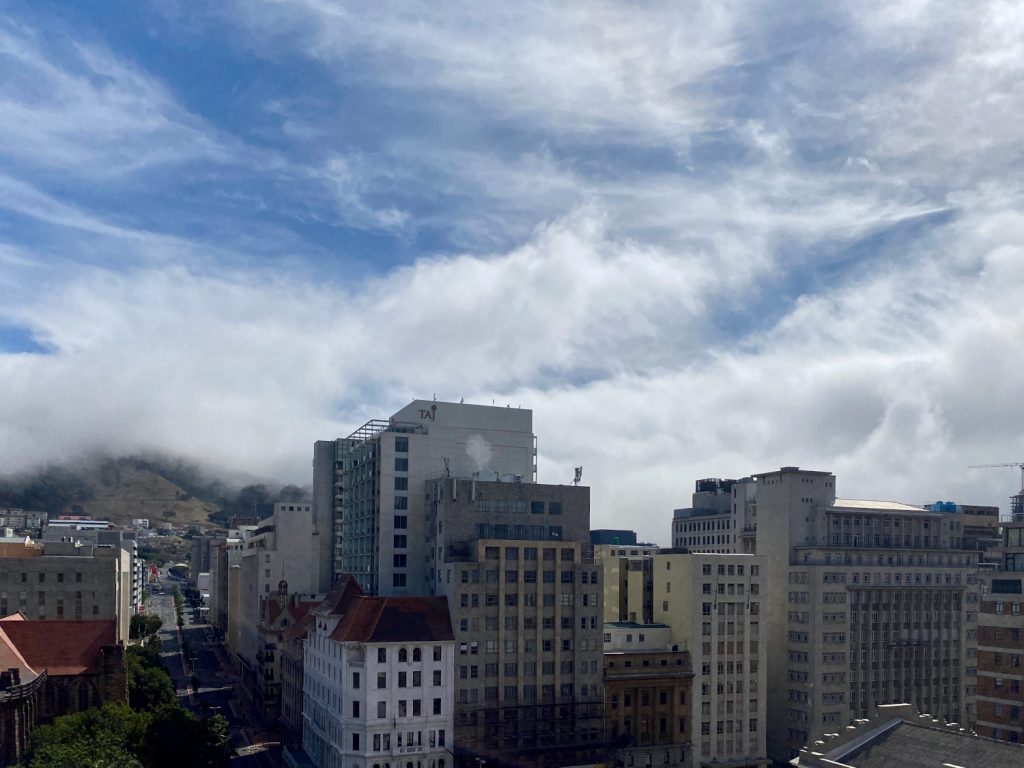
Sleepless night. Get up and find the Uganda Café is open. Walkout onto the balcony with a cup. The traffic lights are red all the way up Wale Street. The sky is at the moment when it goes from dark to light in a blink. Blink. A flock of young Egyptian geese (they’re smaller than their parents) fly low, between the buildings, east along Adderley Street. The blanket man and a colleague together cross the street and head up towards the Bo-Kaap. On Day Eight, there was mention of a colleague who wrote “A poem to corona”, to which I added three chords and made it into a song. Well, the song went out on the company emails and made it to the New York office. Next stop, Carnegie Hall… All credit to magical songwriter Jacqui Wilmot. Last night, at the Lockdown Drinks, talk inevitably shifted to how we are coping with the lockdown. Not having children, my interest was how their kids were coping. And the most pleasant news was that one parent downloaded audiobooks and her kids were enraptured — sitting for two hours at a stretch, being read to. Delightful. My sister used to read to me, and she had one rule: if I didn’t follow her every word, she would slam the book shut and it would be over. It took two lapses of attention, two books slams, and then for years, I was enthralled. In love with the world of words. Love it that these lockdown children are experiencing the power of the spoken word. Online learning is going to change the way children acquire knowledge and hopefully, will bring about a change in pedagogical thinking. Later, when I was 12, she gave me my first library — a collection of books ranging from Ellery Queen crime series and Raymond Chandler to Agatha Christie and Dashiell Hammett and Ernest Hemingway. Never looked back. Early lessons on how to feed your head.
A Poem for Corona
By Jacqui Wilmot
Day Twenty-five: Monday, 20 April 2020
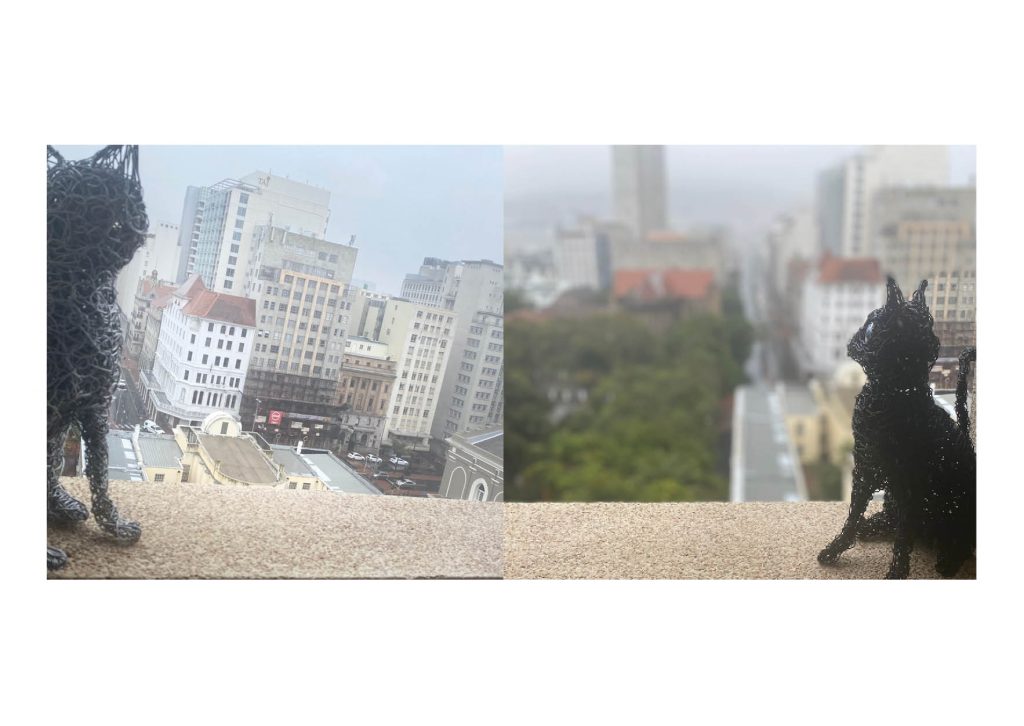
Overcast, cold, and on the balcony the pussy cats, Miss Buffy the Vampire Slayer, Alan the Hun, are disgruntled. The coffee is good — the Colombian Café has upped its game. A lot of traffic on Wale Street. A friend asks what’s meant by “a lost friend” — mentioned on Day Twenty-three. Well, you can forget where you put down a friend; or a friend can wander off without saying much, and never return. The former may be the result of carelessness, distraction, or simple foolhardiness. The latter is largely out of your control. Friendships are not permanent. They’re like a fond memory that becomes embellished by reflecting upon that moment often enough. It hovers as an inspiration, a possible solace in moments of unwanted dreich and drear. Friendships, too, need to be embellished often, and exactly how to do that is a persistent challenge which, when we fail, means they fade into forgotten spaces. A friend and her partner bake koesisters, a Cape Malay doughnut, made from a spicy dough and deep-fried, and send a batch over by courier. She’s a wonderful, fierce creature, at times terrifying, always loveable, and a damn fine journalist of the old school — never content to write from behind a computer screen locked into Google, but out on the street, asking questions. Lockdown is tough on her. Going through my diaries and find a crumpled sheet of paper with a poem, ten lines, and instantly the memory of that moment returns: copying poem, pinning it on a corkboard above my desk, of taking down the corkboard in one of the many dismantlings in my life, filing it in a diary, and forgetting.
As much as you can
And if you cannot make your life as you want it,
at least try this
as much as you can: do not disgrace it
in the crowding contact with the world,
in the many movements and all the talk.
Do not demean it by taking it,
dragging it around often and exposing it
to the daily folly
of relationships and associations,
till it becomes like an alien and burdensome life.
— P.J. Cavafy.
Day Twenty-six: Tuesday, 21 April 2020
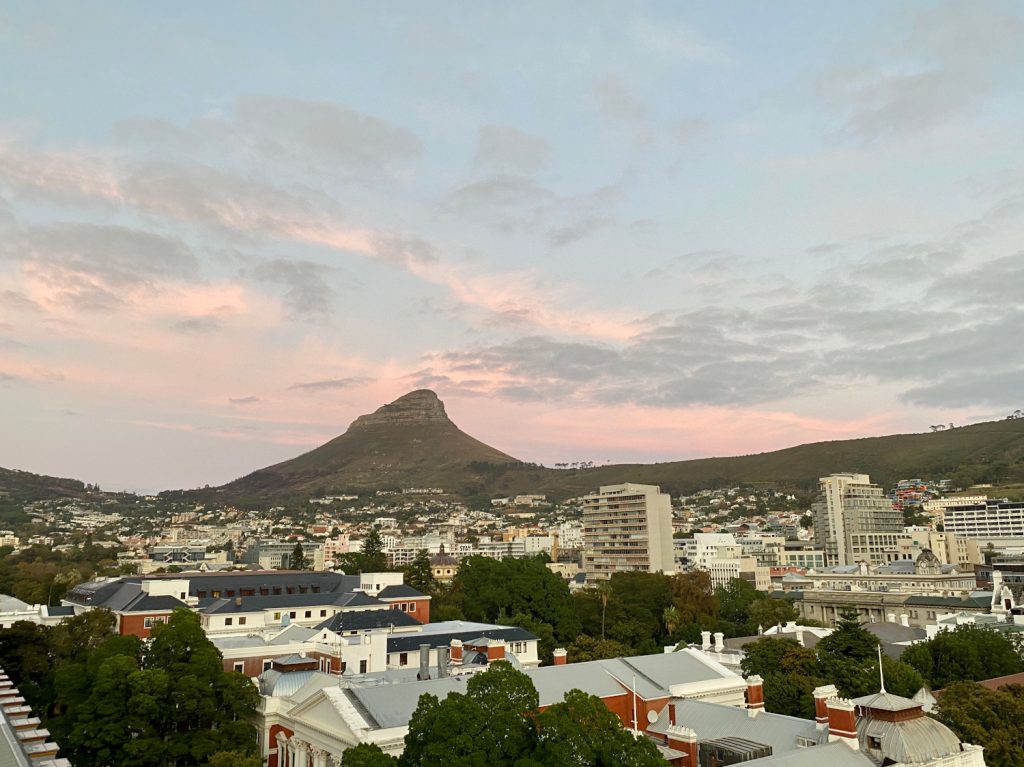
Lie listening to the agitated honking of an Egyptian goose down in the Company’s Garden that woke me before sunrise. Poachers? People are hungry. Collect a cup from the Uganda Café and sit down on the balcony and watch the light smudge the dark clouds north above Lion’s Head with pink edges. The goose hasn’t let up, so at least it’s still alive. Collect a second cup of coffee and return to my perch. A man wearing a homemade red plastic helmet, stooped under a large duffle bag, comes down Wale Street, shouting. The headgear looks like a plastic ball he’s cut in half and jammed on his head. He stops opposite two security guards and harangues them. They say nothing. He gesticulates, adjusts his load and bent low, points his helmeted head down Adderley Street and disappears, still shouting incoherently. A friend writes. She said she was going through her journals and found something I said six years ago — to the month — when a close friend of mine died unexpectedly. What I had said was how tired grief made me and that I “just wanted to lie down on the floor after bringing wood into the house for a fire”. I no longer live in that house, but lately I have been reading a lot about grief and mortality, I mention I started reading last night Atul Gawande’s book Being Mortal. Someone at work asked today what had changed the most during lock down? My response was work had not changed — I have mostly worked from home — but my leisurely pursuits are restricted and that makes me gloomy. I think depressed is too strong a word (and much misused). Perhaps melancholic would be more accurate. I love walking through the city and stopping at cafés or wine bars or cycling along the promenade, love being able to take a book and walk to a favourite restaurant and eat and read without a care. On the day I moved into my apartment, I walked the neighbourhood. It was after six in the evening and the streets were emptying and St George’s Mall had a hasty, scurrying feel to it. Most of the shops were closed. I found a small wine bar and ordered a glass of wine. The guy behind the bar turned out to be from Zimbabwe, and we talked a while. As I left, I told him my name.
He responded, “I’m Livingstone.”
He saw the upraised eyebrow and laughed. “You think that’s funny,” he said. “My best friend’s mother named him ‘Smith’.”
Will he return after lockdown? Will his little wine bar re-open again?
Day Twenty-seven: Wednesday, 22 April 2020
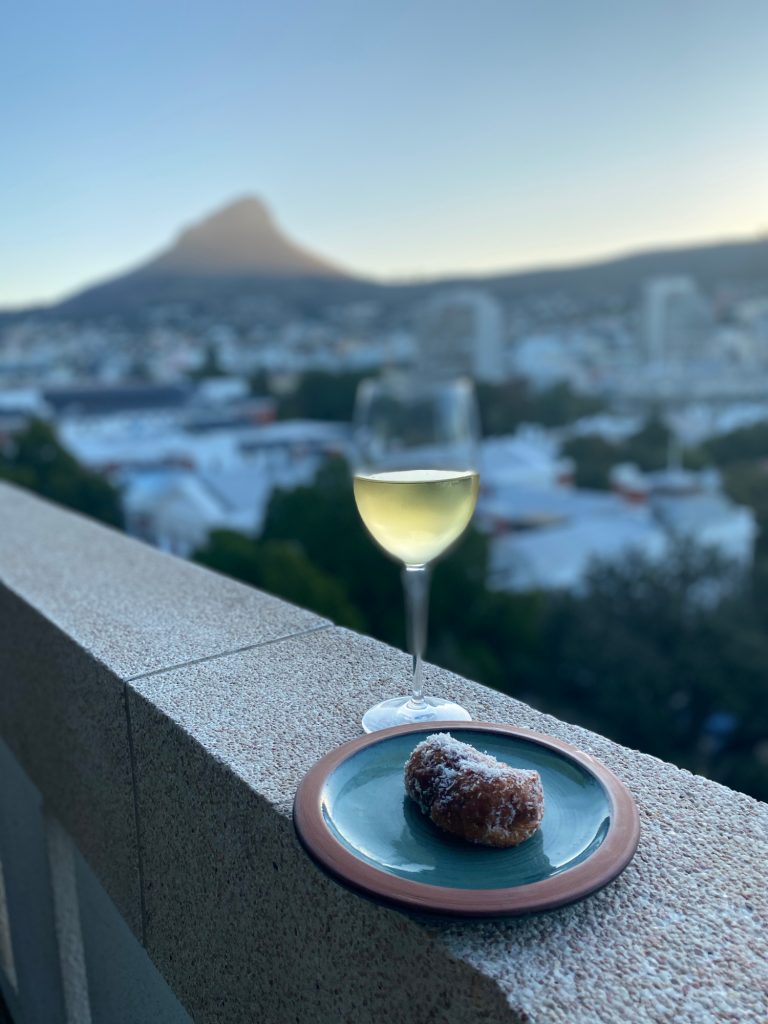
Eerie silence from the Company’s Gardens this morning. Have all the geese been eaten? Watch a squirrel venture out of the park and make its way down Parliament Street: dart, stop, kowtow, dart, dart, stop, kowtow — take all day. It’s looking for a fix — the humans have left the park and the squirrels, deprived of fast-food scraps and Pick n Pay nuts, are going cold turkey, and go looking for more, “dragging themselves through the … streets at dawn looking for an angry fix”. Negotiating lockdown entails ritual. Wake. Listen. Get up. Exercise. Run the stairwell. Shower. Then visit one of the cafés — Uganda — and go onto the balcony. Doves fly past. Watch people on the street. Go back inside. And drop my coffee cup. It shatters. This is not part of the ritual. I am not superstitious. Is this an omen? The barista at the Uganda Café is not amused. At midday, multiple car alarms go off somewhere nearby. The news is full of mutterings about COVID-19 having been spawned in a bioweapons factory. Reminds me of the claims in the ‘80s that AIDS was cooked up in a laboratory. As Gore Vidal said, such paranoia serves a useful purpose for some. Another thing about lockdown is all the renewed magazines subscriptions. Wired publishes a great letter of hope, placing faith in science and scientists, not “because scientists are perfect, or even smarter on average than other humans, but because science is one of the best ways humans have come up with to reliably understand how the world works and how to fix it when it’s broken”. The writer ends by pointing to the “single, vivid insight” of Charles Fritz, a sociologist: “People in crisis help each other. Elites panic about riots and looting, but most of us just try to help the people nearest us. And then we help the ones a little farther out, and then farther again. The centre holds; the gyre widens.” Discover that a koesister goes well with a chilled glass of white (sauvignon blanc/chardonnay). Stay safe and hold the line.
Day Twenty-eight: Thursday, 23 April 2020
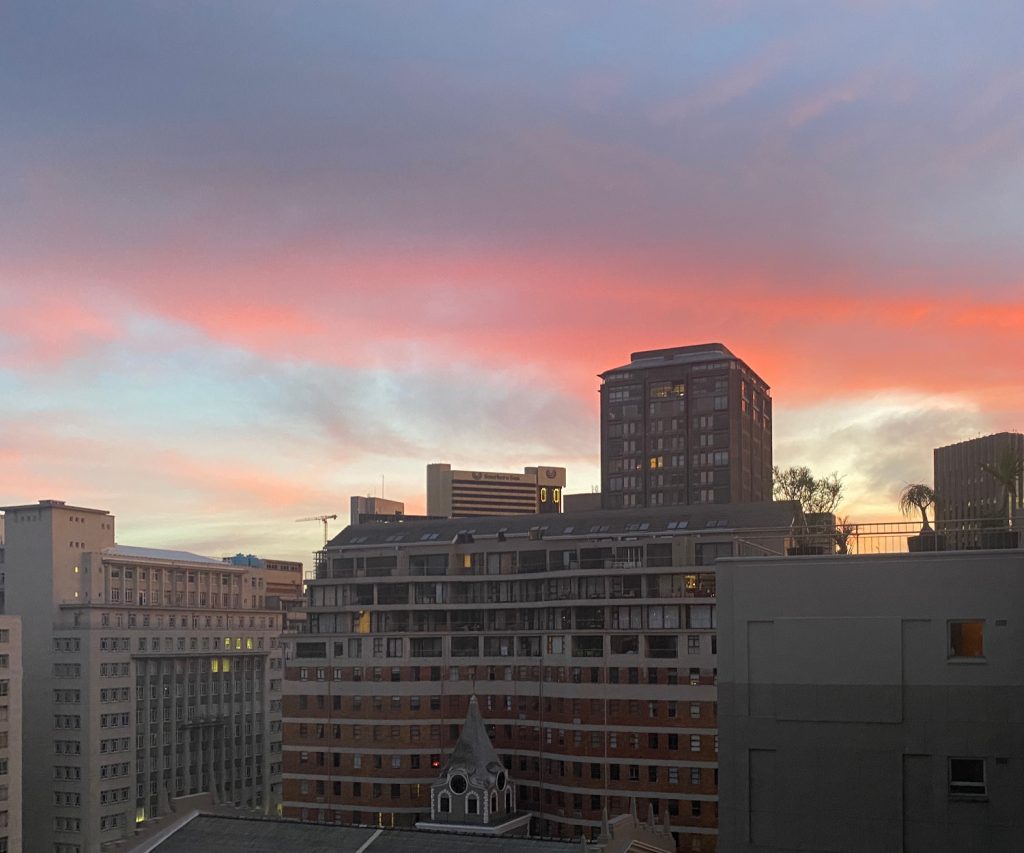
Wake up early. Follow the ritual. The 11 stories seem to have doubled since Wednesday. The sky is gorgeous. Wale Street is busy by lockdown standards. A car stops opposite the Western Province HQ and a well-dressed woman steps out from the passenger seat, heels, dress suit, smart attaché case, walks around the front of the car, crosses the road and without looking back strides across the road. The car pulls away. Provincial government — often difficult to consider an essential service it’s so inept, but that’s unkind — obviously is still working. Speak to a friend. We both lived in the USA, grew up listening to American music — from Chuck Berry to Willie Nelson, from Dylan and the Band to the Allman Brothers and Santana and Jefferson Airplane, from the Grateful Dead to Janis Joplin and Jimi Hendrix and CSNY, from Neil Young to Leonard Cohen — yeah, I know, they’re Canadian but what the fuck did we know — and every blues guitarist from Roberts to Hooker and many more that you can throw into the mix; we preferred American storytellers, whether Jack Kerouac or Hemingway, Steinbeck, Ginsberg or Faulkner or Eudora Welty; and we loved the comics — we were Marvel fans and would laugh at those saps buying DC comics (which we read anyway), and we had a near-religious reverence for MAD magazine. We watched Hollywood movies every Saturday afternoon in the cinema He got his green card, I didn’t. The US sucked us in like a whirlpool on a dip in the river, and we loved it. Living there was like being in the back seat of a fast-driven convertible and watching in slow motion as the driver ran out of road on a bend and flipped the vehicle… You knew the landing would be a wipeout, but there you were in the back seat, along for the ride, and coming down hard. We’re incredulous at the carnage we are now watching. In 20 years, the US lost just under 212 000 soldiers in Vietnam; in 92 days, more than 50 000 Americans have died due to COVID-19. That’s more than 540 people every day. This is the nation that put a man on the moon, has more Nobel scientists than any other country, and yet is run by a group of anti-science fundamentalists. Standing on the balcony at sunset and it’s quiet again. The South African President will address the nation tonight. All anyone wants to know is will we be able to buy liquor after lockdown. We’re all optimists and believe lockdown will be lifted.
Day Twenty-nine: Friday, 24 April 2020

The crash of the caretaker collecting the recycling and rubbish bins, slam-dunk of heavy plastic lids, echoing rasp of pressure hose spray inside a wheelie bin, laboured cranking of the service elevator. He’s early. It’s not even five, but what’s the difference. The night is no longer a period given over to sleep; it’s just a passage of time conducted horizontally rather than seated at a computer or eating a meal. It’s a motionless, warm morning, and a single goose flies east along Adderley Street. People are walking around at the top of the Bo-Kaap. Ramadan will start today. Der Spiegel publishes a series of opinions about the world envisioned after COVID-19. One of the contributors opens by saying, “We are headed for a poorer, meaner and smaller world. It is already here…. The problem is that there are too many alpha men in the room.”. He probably has a point, if you look at those countries that are showing global leadership, almost all are run by women. Yes, I know, such a sexist thing to say.
Another opinion states, with what must be the classic understatement of the day, “The fact that the American electorate has put someone like Trump with his America First policy in place has sown doubt in the minds of our allies.” Doubt? I’d say so, plus fear and loathing. A South African writes, “If growth in South Africa declines by 5 percent, there will be an additional 2.1 million people living in absolute poverty here alone.” It’s a bleak scenario. The bleakness is relieved when a friend sends a link to the Steve Colbert Show, featuring Willie Nelson and his two sons doing a concert called “Come and Toke it” from their home in Texas. They sing an old (but prescient) hit of Willie’s called “Hello Walls”. I read that the during the period of the Spanish Flu of 1918, novelist John Dos Passos was quarantined at a military base in the USA and used the time to write a play called “Death”. I remembered a train journey from Cape Town to Pretoria on the Blue Train — I won the ticket in a lottery. One of the passengers was an elderly academic from the USA, accompanied by her young assistant. We struck up a conversation and it turned out she wrote her PhD on Dos Passos, and as a professor of English, she lectured on him. (She seemed surprised someone in South Africa had even heard of him.) We were talking after lunch in the dining car, and we were passing through the Karoo. A of ostriches came into site and startled by the train started running — not away from the train but alongside it. The professor became very excited in an academic sort of way.
“Lisa! Look! African wildlife!” She then turned to me and demanded, “Ask them to stop the train!”
“Those are ostriches — not wildlife. We’re passing an ostrich farm. I don’t think they’ll stop the train.”
She looked — as they say in academia — “aghast”. Lisa gave me a dirty look and they rose without a word and went to their cabin. Following the trail of Dos Passos, led to a doctoral dissertation by Dorothy Ann Pettit, “A Cruel Wind: America Experiences Pandemic Influenza, 1918-1920 — A Social History”. She says something very interesting, talking about that time. “… there has been too much emphasis on mortality statistics. Mortality statistics tell nothing of the millions who were sick and did not die. What happened to their lives as a result of the pandemic? History ought to be concerned with mortality statistics, but it is the living who make history. It is the living who pass legislation, turn out presidents, become orphans, and lose jobs. It is the living who change the mood of a nation, not the dead.” And that will be our biggest challenge going forward. Take a picture from my bathroom window just to get another point of view.
Day Thirty: Saturday, 25 April 2020
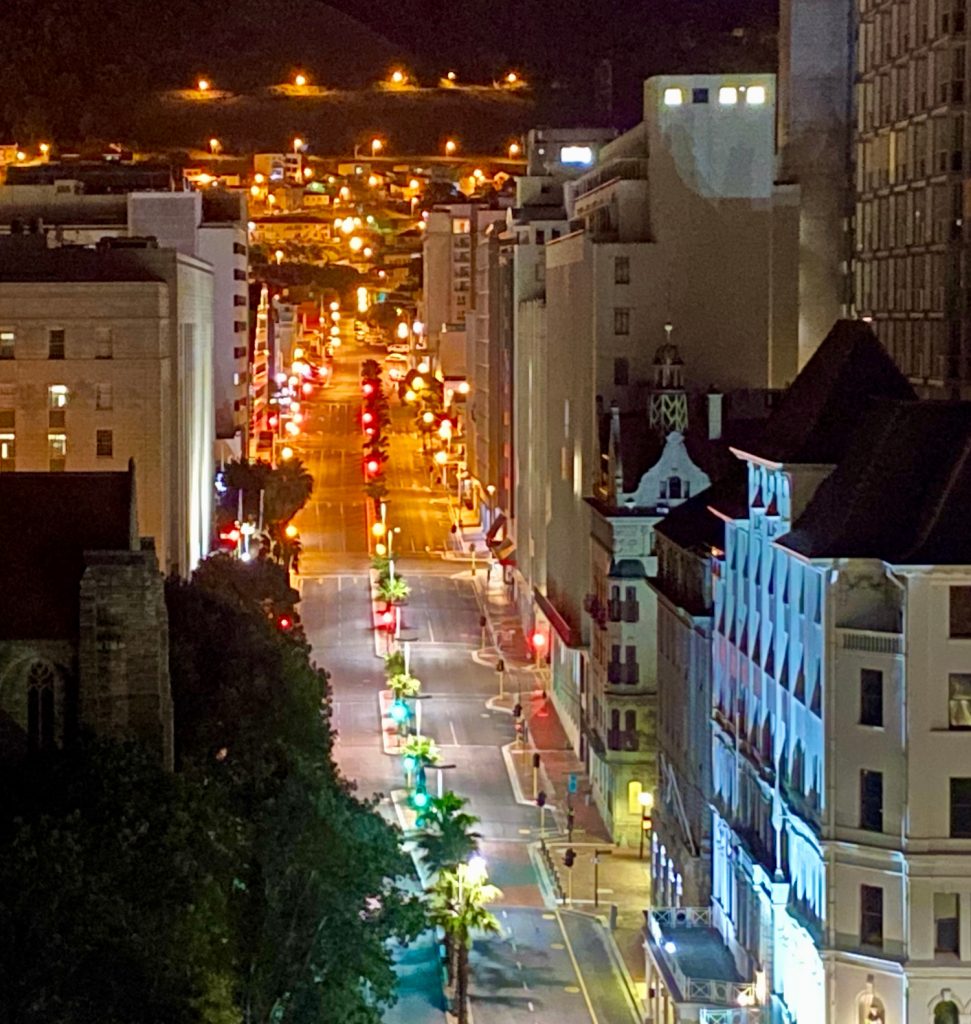
My friend from Switzerland writes that she is eating the most divine honey with cheese and drinking a glass of pinot noir. The honey, according to her partner, is from Illgau, a tiny municipality east of Brunnen, where she lives, and close to Muathatal, a region famous for its food. (The annual cheese festival in Muathatal attracts tens of thousands of people.) We agree honey is a magical substance. I once lived on the outskirts of a small village in the Nuba Mountains in central Sudan. One morning at sunrise, a man approached me as I sat on an angerib in our makeshift reed-fenced courtyard. He carried a stick over his shoulder, on the end of which a large earthenware jar in a tightly wrapped grass-woven cover, hung from a loop of leather cord. He was as thin and gnarly as a goat’s leg. He stopped a few yards from me, and we exchanged greetings. “I’m Amhari,” he said. Then he tucked his jelebeya between his legs, squatted on his haunches, adjusting his threadbare turban as he did so, and placed the jar in front of him. Do you want honey, he asked? A thick blunt bit of whittled wood served as a stopper on the jar, and he removed it. I offered him a coffee. He accepted with a look that indicated he did not trust this young boy could make coffee. The ibrik was still on the side of the coals, and the coffee — my intended second cup — was still warm. He watched me put a single spoon of sugar in a small cup, pour the coffee, and stir it. He sipped slowly. Finished, he stood up abruptly, walked to a tuft of long grass and pulled out a single sheath. He trimmed off the blades with his fingers and beckoned me closer. I went and squatted in front of him. He used his palm to smooth the earth between us, dipped the sheath of grass into the jar, pulled it out, and let a single golden drop of honey fall onto the soil. As it landed, it curled into a perfectly round dusty pearl. He repeated the demonstration. Each time a perfect ball of dusty gold honey formed on the earth between us. Bad honey, he said, melts into sand like water. All I had was a large cooking pot and the upended jar filled it to the top. I paid what he asked and, declining another coffee, he set out back into the flat land with its weird inselbergs from which he had emerged. I never saw him again. I have never had honey like it. It tasted of sparse trees, and the smell of granite rock after rain, and the high, dry grass at the end of summer. One of my students, when I excitedly recounted the experience, looked at me with wide eyes. “How else would you test it, he asked, bewildered — and a little embarrassed — by his teacher’s obvious ignorance. I pour a glass of shiraz — wine supplies are dwindling in lockdown — and wish I had a decent cheese and a pinot noir to go with it. And some honey. The night is quiet, just the indistinct murmuring, dirge-like monotone recitations from the mosques.
Day Thirty-one: Sunday, 26 April 2020
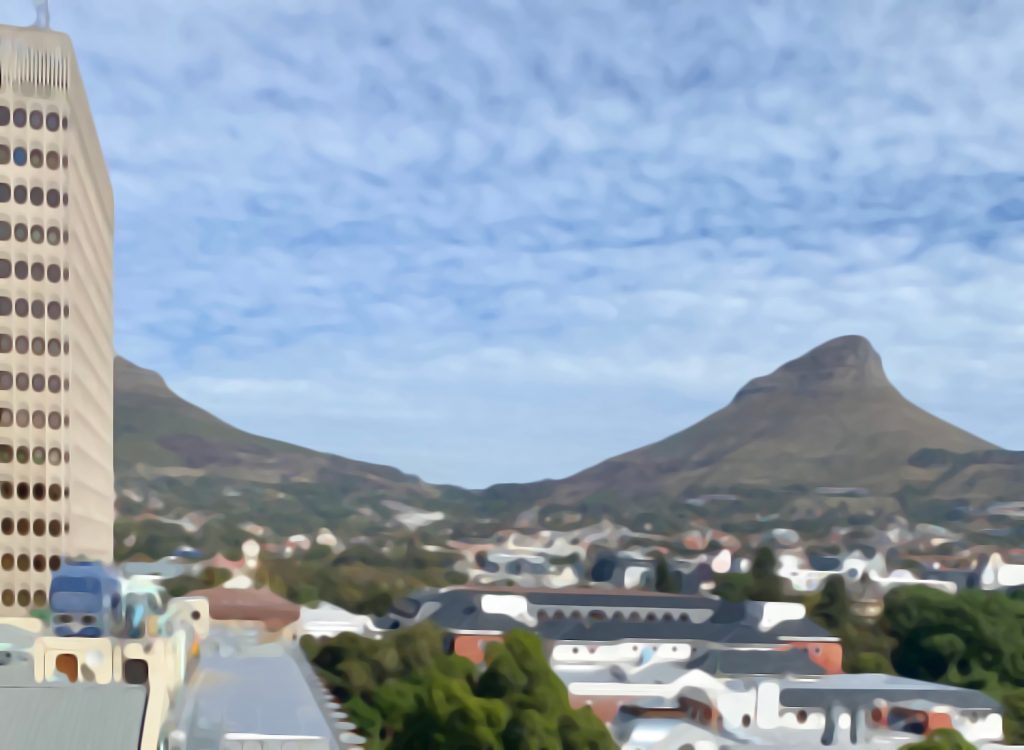
On the balcony, sipping coffee. Signal Hill and Lion’s Head emerge from the receding night. The world is still. Listen to the low, mechanical hum and hiss of a city at rest, the blurred mushy resolute sound of tinnitus except it’s not in my head; it’s an idle city cantata, broken by the gruff baritone of the diesel-engine bus or truck, the glissando motorcycle, the spiccato of whistling birds, and an ensemble of honking geese, screaming gulls, pitched bark of hadeda, the chattering jig of guinea fowl. And after 31 days the air smells clean, the pervasive odour of asphalt and cement soaked in papvis/piss/excreta overlaid with hints of petrol and dirty harbour seawater are gone. A nephews sends a video of the land in which I was born, shot by a guy called Dillan Prinsloo. Wipe my eyes ignoring the COVID-19 hygiene rules. Believe me, the land is as beautiful as this. Turn to the late Oliver Mtukudzi, and message a fellow countryman, who is also a fan, asking for his favourite tracks. Difficult, he says when “Tuku” recorded more than 60 albums. He sends through some choices, and I send him the session Mtukudzi did with Bonnie Raitt, which I am secretly pleased he has not heard — the exchange is not entirely one-sided. Wait for her guitar to slide in. We both judge Vhunze Moto as our favourite album. He explains the title — “It means embers are fire. Don’t wait until they are flames before it is called a fire.” He points me towards the track, Dame Rinetapira. The guitar work is delicious. Again, he explains the title, saying “Dama” is a deeper sense of the word “wisdom” and “‘rinetapira’ is ‘sweet’. Words of wisdom that are sweet or helpful”. Lockdown nostalgia? There is a certain satisfaction in knowing two economists from opposite ends of the spectrum agree: Dutch minister of finance Wopke Hoekstra and former Greek finance minister Yanis Varoufakis. Both are against the “issuance of ‘coronabonds’ [Eurobonds] to help spread more evenly the additional debt governments would incur” due to the crippling pandemic. Perhaps, there is a new order of things to come. Varoufakis explains it best: “By appealing to solidarity to support their call for Eurobonds, the nine heads of government lost the argument before it started. Jack has no right to demand that Jill, out of solidarity, jointly takes out a loan with him. Even Jack will hardly think it is unfair that Jill has every right to veto his proposal.”
Day Thirty-two: Monday, 27 April 2020
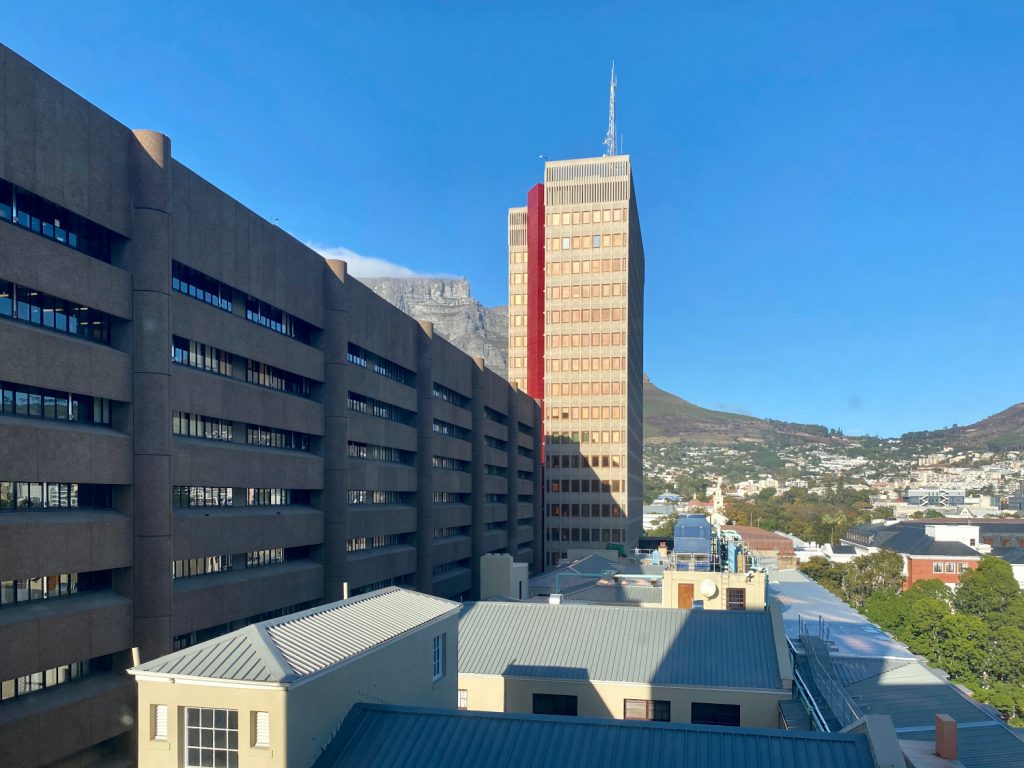
In an apartment block, on the 11th floor, the wind is different, especially in the dark of night. It howls and pants and slams around the buildings’ edges, windows seem insecure, and things you know not what or where rattle and crash. It came suddenly late last night. Lay awake. This morning, around seven, look out my kitchen window. The sky is blue, the wind has dropped, and on the balcony the air was fresh and the light clean. Sip a coffee from the Uganda Café — need to speak to the barista: it’s too weak. Maybe worried about the supply chain, or he’s just getting careless. Or I’m just feeling adrift. The blanket man appears from Loop Street, crosses to the east side of Wale and begins a slow shuffle towards Adderley. He’s ditched the dirty white blanket for what looks like an enormous bedcover of dark blues and purples with a broad garish floral trim that drags behind him on the street. A message pops up: a friend says she’s posted my chronicled mutterings on Facebook. She is a poet, and I respect her and like her enormously. I call her Betty, and she calls me Al. Her message anchors me. I watch blanket man. He’s found a pair of white slip slops and socks since I last saw him. He stops and looks down St George’s Mall and then continues down Wale, turns the corner, and then slouches towards Adderley Street. That’s the real meaning of adrift and to have no anchor. Lockdown brings organised ritual — not just doing the stuff one normally does but doing it consciously. Get up. Brush teeth, wash face. Then stretch like a cat. Well, perhaps more like an aged canned lion waiting to be shot by some brave bounty hunter — perhaps even a president’s son — who’s paid thousands of dollars to take a high-powered rifle fitted with a telescopic sight and blast away from 100 m, secure behind a barbed-wire fence. (Digression is the nervous tick of lockdown.) No shots fired. Exercise, short and sharp. Coffee at first either the Uganda Café or the Colombia Café — both every morning to avoid bickering. Vacuum and wash the floors. Shave and shower. The day is set. Work. Play guitar. Write. And rituals come either laden with memory or launch new moments which seep back into memory like underground streams, finding release later in a spring on the edge of a hill. Brushing my teeth releases that, but “that was in another country, and besides…” (No, not exactly that extreme.) Due to bad planning, there was no lamb in the fridge for Easter. Ordered some which arrived last Thursday and on Sunday cooked a traditional lamb that cries on the potatoes [arní pou klaíei stis patátes]. Easter in Greece is more profoundly and deeply felt than Christmas, and my brother and I, because of our connections to Greece, whenever we managed to be in the same place over this period, have celebrated the ritual of roasting lamb for a gathering of friends. We do it each year, regardless. It is a ritual that came laden with memory over which many more have been laid. I eat. In lockdown, the food has no taste, the ritual no flavour; in isolation, it has no meaning. There was no breaking of bread and passing on to another. No raising a glass and putting an arm around those at your side. As far as organised religion goes, I am probably somewhere to the left of Christopher Hitchens. But it made sense to me why a Muslim lawyer wanted to challenge the government about the ritual gatherings during Ramadan. May sanity and reason prevail over hysteria and superstition, and that his case gets tossed out of court. South Korea can pinpoint the uncontrollable flare-up of COVID-19 cases to a single gathering of a Christian group. We don’t need this ember to become a flame. A pair of African pied crows drift past the balcony. Not seen them before. They give Buffy and Alan the eye and float away.
Day Thirty-three: Tuesday, 28 April 2020
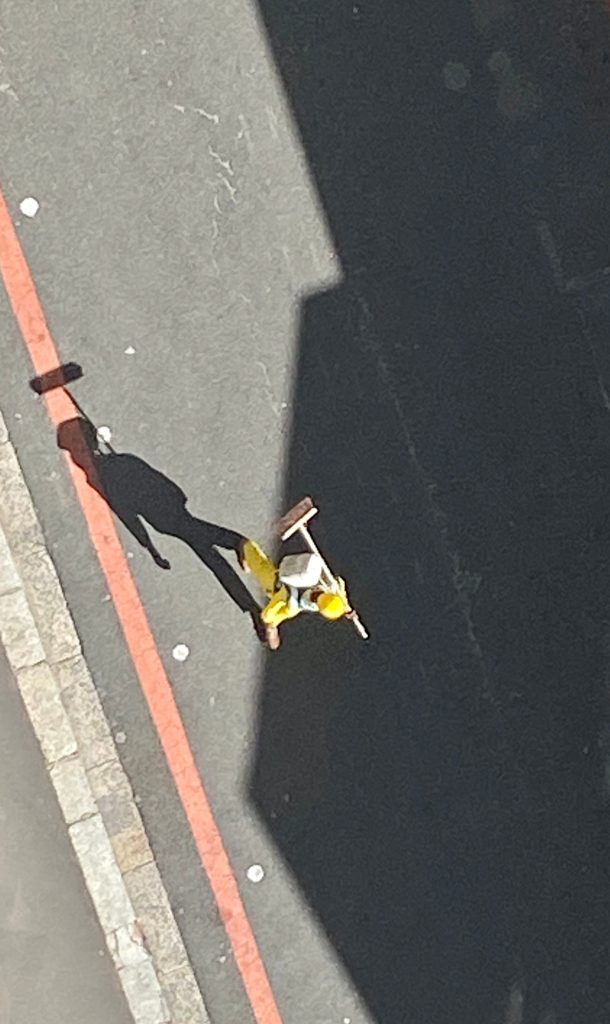
Another restless night. In lockdown, sleeping is to night as cycling is to day — it doesn’t happen. In the Company’s Garden, the hadeda ibis’ are loud and irreverent. Routine. Take a cup from the Colombia Café and sit on the balcony. Watch the sunlight spread down Signal Hill in a blink. Twilight is like that on the continent: one second the world is dark, you blink and it’s clear. Further north, light emerges, like layers of tissue paper being removed from the landscape and you ease out of darkness, things take shape, then light gets in. Down on the street, the city cleaners in their yellow overalls and white bibs, walk carrying brooms over their shoulders and plastic scoops. Some wear their face masks jauntily on their foreheads or casually strung under their chins; very few wear them across their nose and mouth. They’re out there every day, sweeping the empty streets, chatting to the security guards and enforcement personnel. It’s mind-numbingly reassuring, this long-term preparation for our return to normal.
Once, in Omdurman, buying a broom in a hardware store owned by a friend, a laconic, amiable man married to a woman from northern Europe, where he had spent some time in exile (though he never described it as such), he asked, “For the courtyard or inside?” “Courtyard.” He spoke to a boy sweeping the aisle, and said, “Let’s have a coffee.” We crossed over the street.
“He says he has 99 flavours of coffee. Praise be to Allah,” said my friend, as he ordered. We sat on a carpet on the floor. A man sitting to the side, greeted us, and said to me, “Welcome, welcome! You are my son’s professor.” “Thank you. No. No.” I said. “I am his English teacher — but not a professor.”
He turned to my friend speaking in Arabic, for a while and I could not follow the conversation. My friend eventually turned to me and said, “He wants to tell you a story, and I will translate.” I shrugged, thinking maybe I had given his son a poor mark, or had called him out in class for miscreant behaviour, and he, the father, was now going to give me a good lecturing. It went something like this.
There are always two ways of doing things, said the father. Two ways to be a shopkeeper; two ways to be a coffee maker (I didn’t know the word barista existed then); two ways to be a teacher.
He paused to sip his coffee, while my friend translated. Here it comes I thought.
But let us speak about a man who decides to make a drum. Immediately, this man sets off into the forest, finds a tree, fells it, and hews the wood for a drum base. Then he marches into his field, catches the nearest goat, slaughters it, and stretches the skin out to dry. Later, he will cut the skin, stretch it over the base, and work it until it made the correct sound, and then he would play it. Another man also desires to make a drum. He goes about his business each day, takes walks in the forest, talks with his friends, And then one day he will come across the right tree. It will have the right feel. So, he will cut the tree, and he will set aside the wood for some days because you cannot simply take from the land, savage a tree, without a ceremony of thanks and without it having a role within the larger picture of the world. He would do the same with the goat. He would go about his daily business again, until he came across the right goat, one that felt suitably sacred, and would give the right energy to the drum. Then he would wait for the right time to sacrifice the goat. The first man will laugh and say this takes too much time. But for the second man, time is meaningless. For him, the drum was a sacred vessel to be fashioned with ritual, with respect for the wood and skin that formed it because it would be imbued with their soul and would hold within it deeply significant knowledge. It would be an instrument to be revered and treasured. If made any other way, it would not be a drum; it would just be a wood block with skin over it.
We all three sat in silence, sipping a fresh cup of coffee. He stood up and said, some students when the teachers have finished with them are but wood blocks with skin over it; others leave as vessels with deep knowledge. Then he left.
The boy from the hardware store called. A customer was waiting. He held out my broom. I thanked him, turned to pay, and my friend shrugged. “You had to listen to his story. That’s payment enough.”
Yesterday, a good friend who was called upon to review the ten musical albums that most influenced him or were the best of his lifetime, or most extraordinary, or whatever — I know it’s another FB effort to squeeze more personal information from users — and instead he chose to review the ten most overrated. His review of Steely Dan’s Aja contains two of this year’s best comments. His writing is wittily acerbic, his opinions surgically precise, and his judgement as solid as a wooden mallet smacking bone china. This album he says, is “the musical equivalent of ironing your jeans”. And it doesn’t stop there. Yes, he grants, there “are some lovely melodies and lyrics here, yet it’s like the food the astronauts are given — perfectly balanced and absurdly nutritious, but nonetheless space powder. There’s just no goodness in it. It’s utterly fake”. After drying my eyes, I wrote him, and he immediately responded with a description of Trump he had noticed on Twitter, in which the US Bozo of Note is described, among other choice lines, as a man “wearing a dead ferret on his head”. The passage leapt to the top of the year’s best comments. He conceded gracefully, saying the man’s description of Trump deserved it because it was true. Can’t argue with that. It’s late. Outside, there are arguments in the dark. I close the door.
Day Thirty-four: Wednesday, 29 April 2020
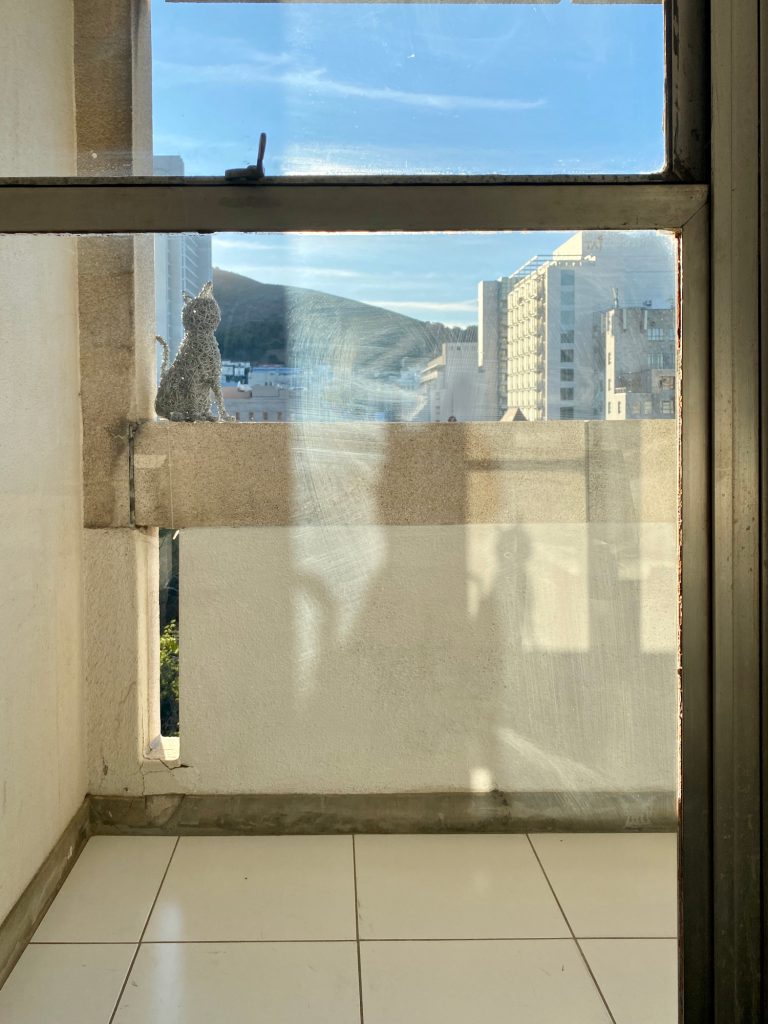
The Company’s Garden is sweet with birdsong. In the course of preparing a global daily coronavirus report, this opinion piece in the Wall Street Journal catches my attention: America Needs to Win the Coronavirus Vaccine Race. Read further, and it gets more bizarre: “The first country to the finish line will be first to restore its economy and global influence. America risks being second.” — and those words say it all: “first… finish line”; “economy”; “global influence”. Not, “humanitarian breakthrough”; not “enormous number of lives saved”; not “global collaboration”. The empire slips even further. Watched an online panel discussion last night, billed as the “Digital ThinkIn — Unintended Consequences: COVID-19, Technology & Business”. Panellists included, among others, the facially pierced, dork-knobbed 42-year-old supersmart digital maverick Harper Reid (the man whose social media campaign put Obama in the White House in 2012) and the discreet, self-effacing, equally brilliant Baroness Martha Lane Fox. When asked by the moderator what’s staring us in the face in the digital technology world that we can’t see, Reid said the new important stuff is always in the background. It’s like no one walks into a sensationally designed home and says, “Great plumbing!” You don’t see the stuff that’s already there making things work. He also said you have to talk to young people, and told a story about speaking with students about adapting to online learning during COVID-19. They were, like, “What you mean? It’s no problem — it’s the [old] professors who don’t know what they’re doing.” The Baroness nailed it: if we expect the same old group of faces and actions — the old white males — to lead us to solve the post COVID-19 problem, it’s not going to happen. We need diversity, inclusion, and collaboration to pave a new road forward, she said, demurely alluding to those women leaders who have successfully handled the pandemic. She didn’t name them but here are a few. The list ranges from Silveria Jacobs, prime minister of the small Sint Maarten to Angela Merkel in mighty Germany, from the inimitable Jacinda Ardern, prime minister of New Zealand, to Mette Frederiksen, prime minister of Denmark, from Taiwan’s president Tsai Ing-wen to Denmark’s prime minister Erna Solberg, from Iceland’s prime minister Katrín Jakobsdóttir to Finland’s prime minister Sanna Marin, from Jeong Eun-kyeong, head of South Korea’s centre for disease control, to Anne Hidalgo, mayor of Paris, and many more. Biden should step aside for Elizabeth Warren. God knows what they can do in the UK; Macron should “faire pousser des boules”, and tell the sycophants he’s surrounded himself with to do the same and start acting like human beings, not Napoleonic marionettes. My dear friend in Switzerland tells me, joyously, she cycled home in the rain today, and loved every moment of it. Makes me content. Notice Miss Buffy is throwing shade.
Day Thirty-five: Thursday, 30 April 2020
The stairs are brutal this morning. On the balcony with a coffee it’s still dark outside and the lights are off in the apartment block to the east, except for a solitary red glow in a small window low down in the building. It’s always on, a sluggish, dim light, and from this distance it looks like one of this ’70s lava lamps, except the lava has solidified. A MyCity bus trundles slowly down Wale passing the empty bus stop. One of the security guards on duty in the lobby says they only allow 30 people on board in order to maintain social distancing. He has a monthly season ticket for the trains but they’re not running and he had to buy a new season ticket for the bus. It’s all digital — why could they not make it possible for him to use the train card on the bus? If that can’t happen now, then the Fourth Industrial Revolution [4IR] is still on a bicycle some ways back down the road. Willie Nelson turned 87, and the editor of the Texas Monthly ran a feature rating — and reviewing — all 143 albums the man has released. The number one — according to the magazine — is Phases & Stages released in 1974 after Willie broke up with his first wife. Whether it’s a fair winner will be debated for as many years as there are Willie Nelson fans. It’s not a song cycle to listen to in lockdown late at night, but it does contain what the reviewer termed “what may be the saddest country song ever written”. It’s possible in these matters we have only the voices in our hearts. It was Rilke who knew the geography of love and desire, that place “without a shelter, here on the cliffs of the heart”. Perhaps we have no measure for the weight of the real things in our lives; they sit within us with all the massive granite solidity of clouds burnished by a setting sun. Around midday a group of women come strolling through the Company’s Garden, taking selfies, and laughing — tourists, certainly not locals from the voices and clothing? It’s weird and incongruous and yet naturally what one should do, except this is a city in lockdown. They disappear up Wale Street.
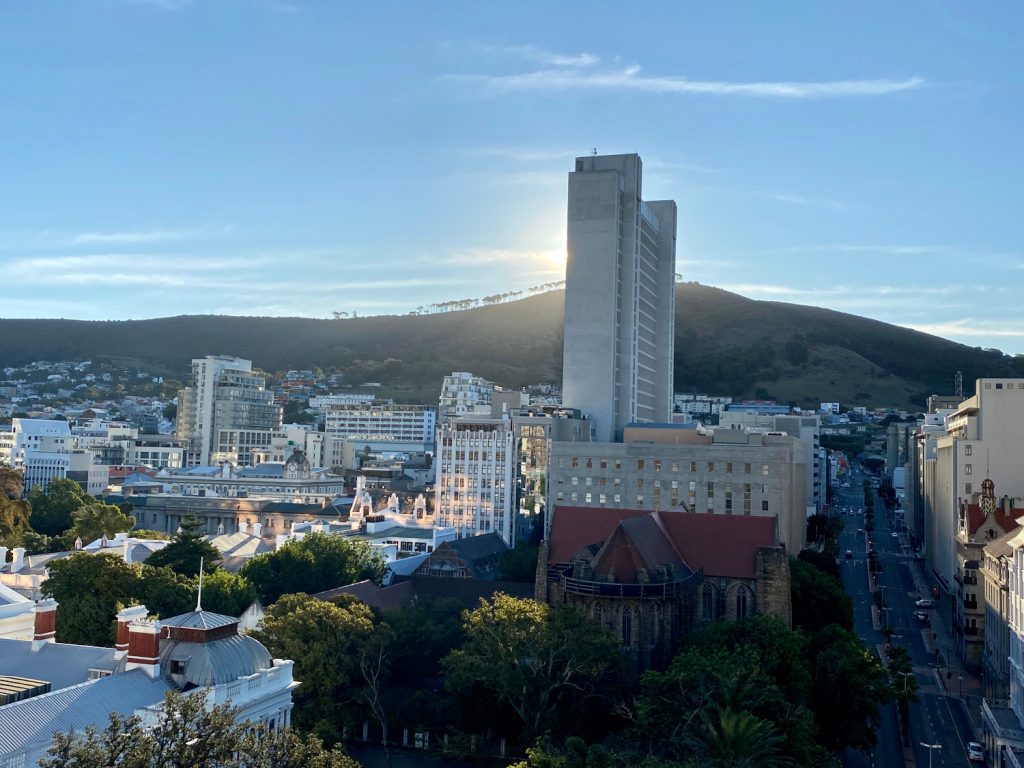
Day Thirty-six: Friday, 01 May 2020
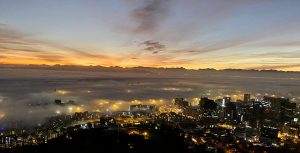
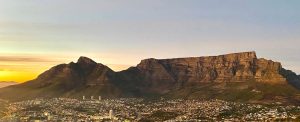
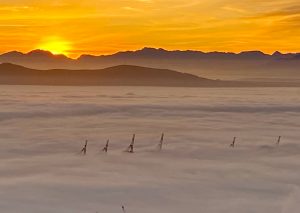

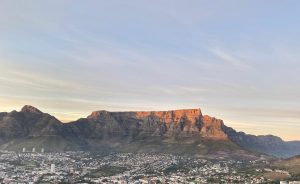
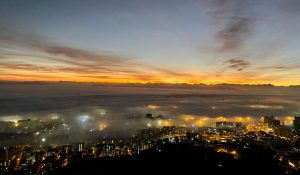
Yesterday was rescued from melancholia by a song from my delightful and wise friend in Switzerland who recorded herself and sent it to me. She has a clear, magnificently confident voice, and it lifted the gloom as when a mountain trail leads you through the clouds up into the sunshine. She is an eternal lesson from whom I shall always learn something. And this morning, Cape Town shifted to Level 4 of lockdown. No, we know not what the fuck this means, except that we can go out and “exercise” for three hours each day between 06:00 and 09:00 and restaurants can make food deliveries, and haberdasheries and hardware stores remain shut so you can’t buy materials to make your own face masks or repair your broken toilet. Go figure. When the President made his first announcement about lockdown, he was clear and compassionate, and we (mostly) backed him; now he has lost most of us. Trying to explain it to friends abroad: he was trade unionist in an era when trade unions were banned by the white nationalist government. He had to “negotiate” with fascist-minded white supremacists and he succeeded because he knew how to move the debate to a compromise position. And even the die-hard white fascists knew when to follow the money. Now he’s dealing with people who do not understand compromise. What possessed him to appoint this former minister of health to head the COVID-19 team? A minister of heath who denied pregnant HIV+ woman from receiving an ARV drug (Zidovudine – AZT), known to reduce HIV transmission from pregnant women to their unborn children. A minister of health that authorised the expenditure of R14.27 million — provided by the European Union — on a “play” called Sarafina II intended to combat HIV/AIDS in South Africa — a communication message about as useful as informing a goldfish it was in a bowl. Well, she’s calling the shots right now, and it doesn’t feel good. And we have not even begun to discuss the extremely esteemed, perfectly formed minister of trade and development, whose grasp of trade (markets) is the equivalent to that of the child on the block who has the only football — nobody can play unless I am captain — and grasp of development is equally demented — if a few can develop and carry others with them, that’s unfair. Everyone must develop even if “everyman” can’t develop. So we’ll all wallow in waiting to develop. He’s probably never had to make a trade (even to buy a loaf of bread) or develop (still stuck in his Stalinist dreams, and our nightmares). Digression. Anyway, met with a friend a little after six and we hiked up Signal Hill, and then I cycled along the promenade but that was insane: thousands of people. Bumped into friends. We all wanted to hug — but didn’t. And that is really what is damaging about the lockdown. It’s instinctive to touch, it’s wired into us to drop our physical guard among friends, and now we are going against nature to beat nature. This creates underlying anxieties — and there are a number — and has scrambled our social sensibility somehow. That closeness to others that we took for granted and which confirmed our own sense of being a person has been dislocated and we are no longer sure how to be. Did some shopping on the way home, but that was a desultory experience. Discovered a wonderful pianist today, Helene Grimaud, and have been listening to her all day.
Day 37: Saturday, 02 May 2020
Wake up and, not waiting for coffee (though the Uganda Café has a new cup), head out on my bicycle for the promenade. It’s still dark and the fog sits close and thick on the ground. Perfect. The promenade is mostly empty, and the air moist and sea-salty. Police cars patrol the promenade. Occasionally one of the officers barks an order — “Please keep moving!” — or stops to tell someone to wear their face mask (which a lot don’t seem eager to do). My route back home takes me past the Gardens Shopping Centre where wait in line at the supermarket, and for some reason end up buying a set of six whiskey glasses. Not even on sale. Is this the onset of lockdown let-up delirium? Level 4 madness? Anyway, it goes into the backpack, along with a glass measuring jug (again, go figure?), milk, biltong, butter, toothpaste, and two sausage rolls. As a youngster, sausage rolls were a favourite, and I was thinking about how well this would go with a cup of tea when I get home. I give one to the security guard in the lobby of the building, and he says, “Thanks, man. This will go well with a nice cup of tea.” I make a strong cup of tea and sit on the balcony watching the fog settle in deeper even though the sun is pushing through. You can’t re-create the flavours that enchanted you in the past. It was a decent, if not excellent sausage roll, yet by the time I had finished it I knew I’d never eat another one again. There is a shift in the city: the street vendor selling soft drinks and chips has set up stall on Adderley Street. It strikes me as a little bit crazy. At midday, the noon-day gun fires on Signal Hill and the bells toll in St George’s Cathedral. The bells have not always rung, and when they started it was a slow ring, repeated and I thought maybe they were tolling for each death from COVID-19. Back then, when the bell started, there were only four recorded deaths. Now we have 123 deaths. The bells toll. In the afternoon, walk out to place the rubbish in the container provided on the landing and put out the recycling. In the recycling bin is an enormous clear plastic bag, filled with shredded documents. One of my neighbours has been busy. Feel the urge to know what it is that is so important it must be shredded. Turn around and go back to my apartment. The fog has lifted. Down the in the Company’s Garden, three military personnel patrol the entrance.
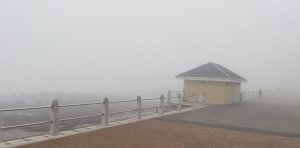
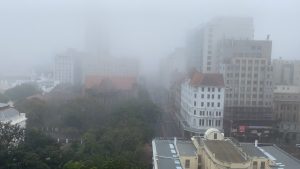
Latest Post Below
Day Thirty-eight: Sunday, 03 May 2020
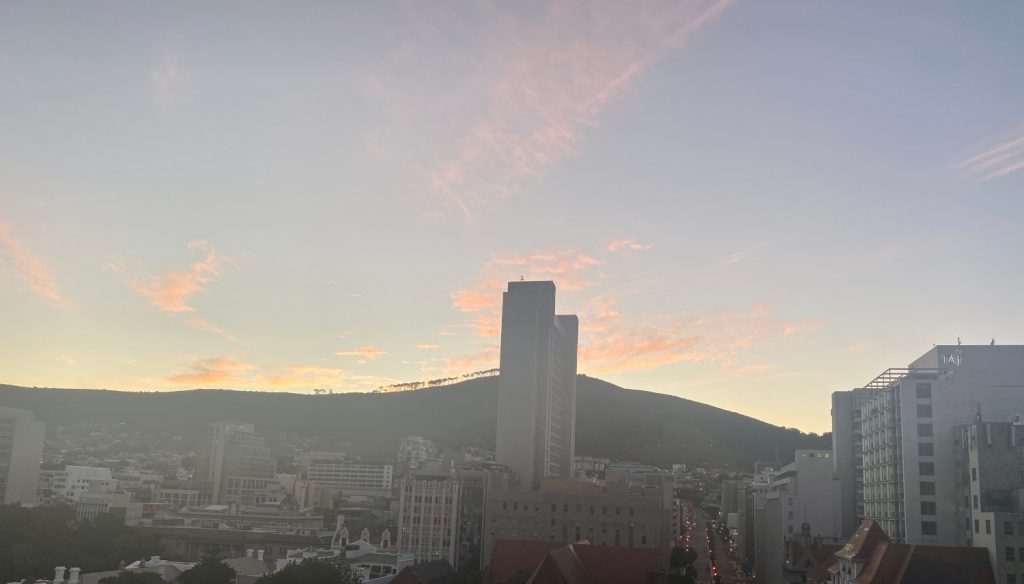
It rained during the night. This morning the air is damp — light rain or heavy mist? There will be nothing to see from the top of Signal Hill, socked in as it is with fog, so decide to cycle along the promenade, which hopefully will not be as crowded as two day’s ago. It isn’t, and the sea air is pungent with the smell of kelp and salt. Make a lengthy detour home again. A friend and I exchange pleasantries on WhatsApp, imagining we are about to share a glass of wine and have a Sunday roast chicken. It’s light-hearted, polite banter, yet swathed in the gloom of adult make-believe. At least, as a child the make-believe world I inhabited — complete with dragons that multiplied, and gorgons that tore themselves from imaginary stone buildings and devoured passers-by, and winged horses that were white and long mained, and devilish horned foes armed with double-edged axes who always came in packs of seven — was as real as having to do homework after school. Our midday banter was pleasant and amusing and at once unsatisfying and comforting. And that is the limbo of lockdown: one is neither isolated nor connected yet experiencing both untethered to reality. I bake bread. Roast a chicken. Is it miserable to be eating it on my own? No. Have always cooked for myself and the joy of a roast chicken is the cold chicken to feast on afterwards. Which does raise the question: when you roast a chicken, and four people sit down to eat, usually there are enough leftovers for one or two chicken sandwiches the next day, not so? Yet, if you spatchcock that same-sized chicken, and serve the same four people, you will be lucky to even have bones for stock. I know, it’s not exactly string theory or even philosophy 101, but it remains enigmatic. This is lockdown: the diminishing returns on a spatchcocked chicken. Real life always has leftovers, and that’s what keeps us going. Other WhatsApp chat groups have become endless recipes for pineapple beer or apple cider. I hope fervently my friends will still be able to see me when this ends. The day clears and ends with wisps of pink cloud.
Day Thirty-nine: Monday, 04 May 2020
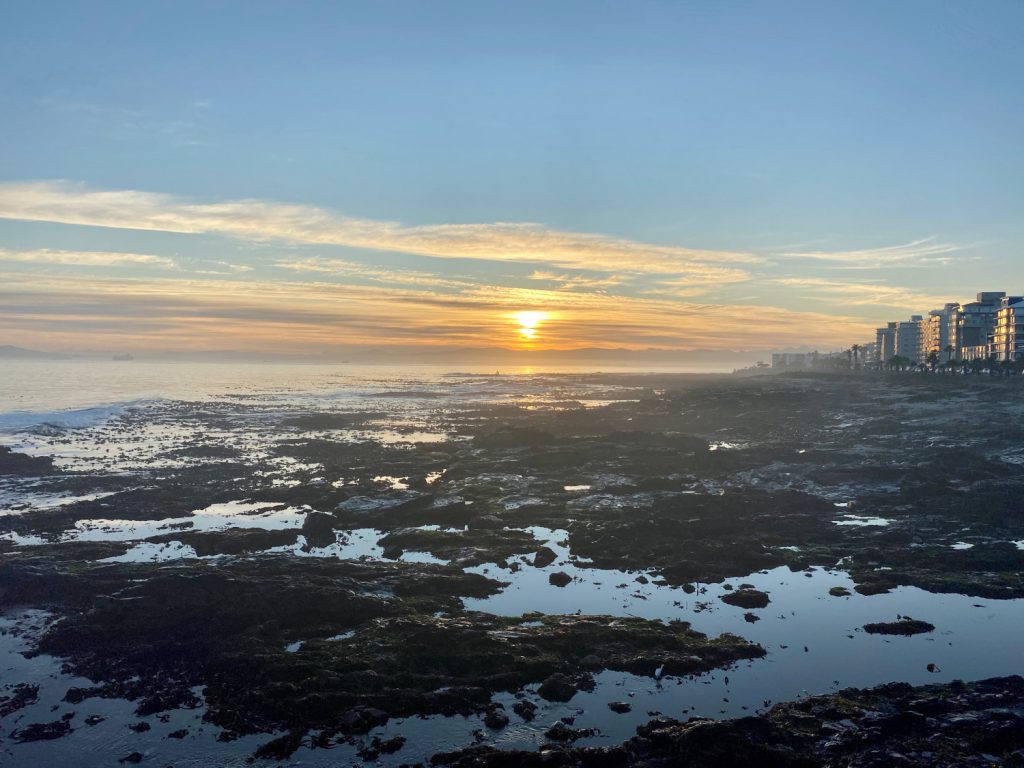
Wake to a city emerging from sleep. The harsh incessant thrumming of rubber on tarmac, the smell of petrol and diesel fumes, of food being cooked on long-abandoned grills, of people shouting. Grateful for the break in routine — no more stairwell running — go and get a flask of coffee from the Uganda Café, load it into the backpack with a tracksuit top and set off for the promenade. The sun is rising. The roads are still empty of cars, but more people are running, walking, cycling, skateboarding. Dogs bark and fight and run crazy circles around their walkers. The morning is glorious. On my way back I stop and sit on a bench to drink my coffee and watch the sun light up the container boats in the harbour. A woman stops opposite me and I think she’s about to give me a lecture about not wearing my facemask, but then it turns out I know her. I put down my cup, adjust my face mask and we chat. It’s one of those circular conversations where neither wants to talk about lockdown but lockdown is all we have to talk about, even if you’re sidetracked into something such as the fine difference between introspection and reflection. The former may lead into a spiral, an echo chamber where you only hear your voice, whereas reflection bounces you against an other or others, and the return shot never always goes where you want it, and so you have to stay on your toes, think on your feet, prepare for the volley, baseline, net. It’s a tougher game, mainly because it’s voluntary. Introspection often joins the game uninvited. I finish my coffee and cycle home. I come to the top entrance of the Company’s Garden. Two military men step forward smoothly and stop me. They’re young, hard, steady-eyed. Their uniforms are crisp, their boots polished. We exchange greetings. They don’t smile. They’re not impolite. They tell me bicycles are not allowed in the Gardens. I shrug, thank them, and turn and cycle on. At home, on the balcony, a car goes up Wale Street, the snatches of saxophone music coming from its open windows. I hear children laughing, playing on skateboards outside the park entrance. The city stretches, rubs its eyes, and sits up.
Day Forty: Tuesday, 05 May 2020
Forty days — the mythical biblical magical arbitrary number, the length of subjugation, the days of fasting and temptation, the days of riding the flood, the years of sovereignty and trials by blood. Whatever. Exercise routine, then grab a thermos of coffee from the Colombia Café and head out for a ride. Leg muscles won’t work uphill this morning, so zig-zag through side streets to finally end up on the walk of fame and on to the promenade. It’s late. The sun is up and people are out. Pass a woman who is wearing her pyjamas? Surely not. Hey, it’s Sea Point coming down from lockdown. On the way back, stop and sit on a bench, and have a cup or two of coffee, watching the bright light and high clouds. A dog strains to sniff my shoe; his owner apologises and tugs ineffectively at the leash. My friend goes by — I recognise the shoes — I call out and we chat again. Pack up and head for home. The traffic is minimal. On the balcony, pour the remains of the coffee, and sit watching the city. Blanket man has not been around for a while. A friend sends me a short essay she has read, entitled “Why Is Quarantine Making Me So Sad?” She thought it answered the difficulty she was having in “putting language around the sadness people have been feeling about the loss of their old lives – or the rituals like graduation, proms, weddings, funerals, for that matter”. It’s a charming piece. Sadness has not been in my thoughts during lockdown; I’m not saddened by it, I tell her. Conflicted and confused and worried, yes. Sadness is a feeling for what has passed, and lockdown forces us to live in the here and now, each day the same (or sort of) with no past or future beyond yesterday and tomorrow. When lockdown is over, will I be sad about what emerges from the world? I doubt it. I might feel nostalgic for some things. Sadness is a softer, manageable form of grief. Grief is addictive — Ricky Gervais speaks this line in the brilliant After Life 2 and it’s true. It is as crushing and confining as nicotine or heroin. Sadness is just a weakness, as an occasional craving for chocolate while watching After Life. Shops are open: TigerWheel & Tyre, a poster shop — I know, essential service — a ship’s chandler — we are a harbour town, after all — the Clicks round the corner, shut for most of level 5 lockdown, opens again, the weird outdoors shop on Harrington Street with its Rambo imagery of six-wheeler four-x-fours — I know it’s technically incorrect, but you get my gear shift — and incongruous mix of hipster coffee and survival kits, double-headed axes and designer-style Norwegian jackets. (I can’t name the shop because the name makes me cringe.) I read Mary Beard’s defence of Germaine Greer’s book On Rape — or as Beard pointedly said, “or pamphlet (at ninety pages, that’s really all it is)”. Love Beard, so end up reading her essay “Women in Power”, written three years ago, which meant I had to subscribe to the London review of Books. Ho hum. (What more would she have to say now, given what exemplary leadership the women in power are showing through COVID-19.) If you have no time for long reads, then this is basically what Beard is talking about, in her own words: ”… my basic premise is that our mental, cultural template for a powerful person remains resolutely male. If we close our eyes and try to conjure up the image of a president or (to move into the knowledge economy) a professor, what most of us see isn’t a woman. And that’s just as true even if you are a woman professor: the cultural stereotype is so strong that, at the level of those close-your-eyes fantasies, it is still hard for me to imagine me, or someone like me, in my role. I put the phrase ‘cartoon professor’ into Google Images – ‘cartoon professor’ to make sure that I was targeting the imaginary ones, the cultural template, not the real ones. Out of the first hundred that came up, only one, Professor Holly from Pokémon Farm, was female.” She is a delightful and essential long read.
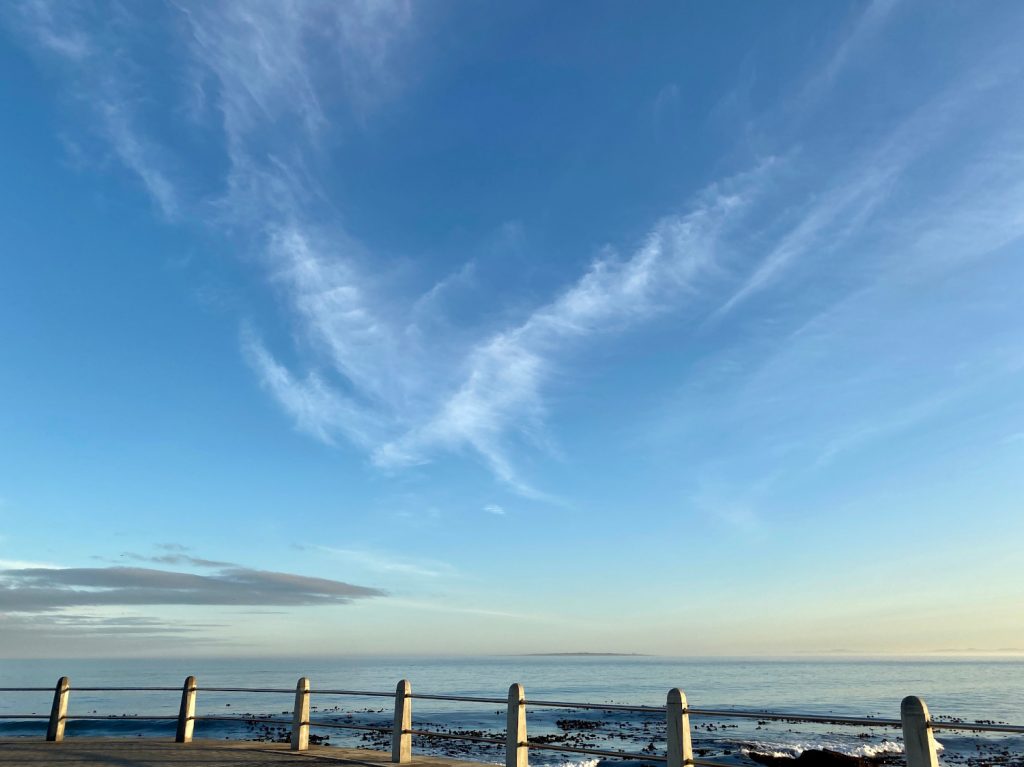
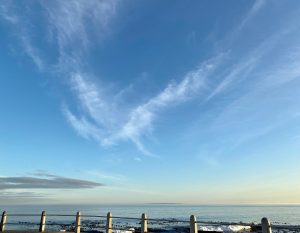
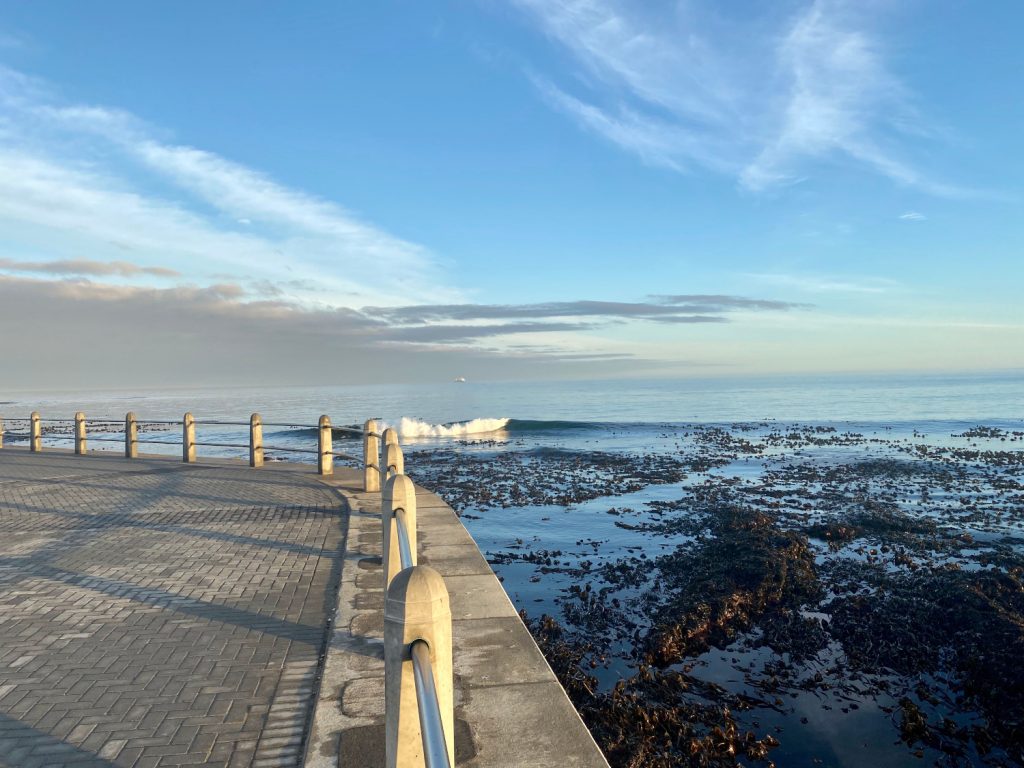
Day Forty-one: Wednesday, 06 May 2020
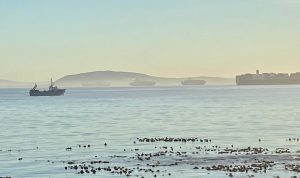
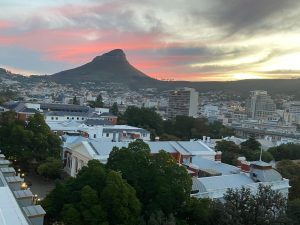
Turns out, it’s still ugly out there. Surprise. No one really believed we’d come out of lockdown, thinking maybe we should make this a better world to live in. Thinking, maybe we all have been just a little bit selfish and self-absorbed. Well, as the man sang, it’s the same old blues, the same old blues again. On my morning cycle, pass a burnt-out Mini on the beach front road. Think, shit, you don’t see that often. Last time I saw a burnt-out car on a city street was some years ago in front of my house. At about five in the morning, we heard a massive whomp! Thought immediately it was the lunatic fundamentalist group — active at the time — called PAGAD. It stood for People Against Gangsterism and Drugs. It was your good, old homegrown vigilante squad (still operating in 2016 and probably even now). Went outside and there were flames leaping up from behind the garden wall. Called the fire brigade, who arrived within ten minutes, but the car — a Series 7 BMW — was long gone. While we stood around giving statements to a police officer and watching the firemen (for they were all men), a lithe young man in tight fitting leather pants, cowboy boots, and a leather waistcoat over his bare torso, came sauntering down the street. He was stoned. He stopped beside the car, while a portly police officer, notebook and pencil in hand, stared.
“That’s my car,” said the young man, apparently unfazed by its ruin. “That was your car,” said the police officer, slowly, and somewhat pedantically.
Well, it seems the car owner had been in an argument with his boyfriend while they were dancing in the local nightclub, the Bronx. The boyfriend had stormed out and apparently, torched his lover’s car.
“How do you know it was him?” asked the officer. “Oh, puhleese!” said the young man. “He fucking told me he was going to do it. He’s such a bitch.” I went back inside. The burnt out car on the beach front also has a back story. Apparently it belonged to a man, let’s call him Fred, who has been campaigning for the homeless and set up a food stand, asking those of us exercising to make donations of food or money. Fred has apparently, been fined and harassed by the Sea Point South African Police Services for his efforts to feed homeless street people. A local vigilante, opposed Fred’s humanitarian efforts, then posted Fred’s car registration number and residential address on social media. That night, Fred, the feeder of the homeless, had his car torched outside his home. I think I have more sympathy for the motives of the spurned lover than the vigilante who torched Fred’s car, whom, hopefully, if my Christian friends are right, will rot in hell. I’m not putting any money on it. At home, drink coffee and think about desolation.
Day Forty-two: Thursday, 07 May 2020
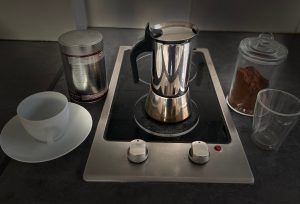
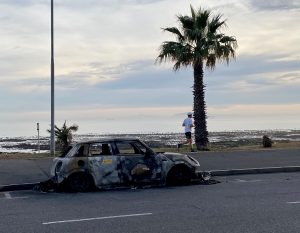
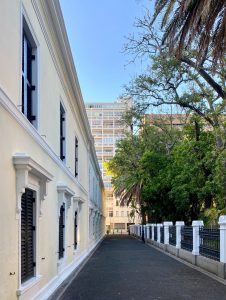
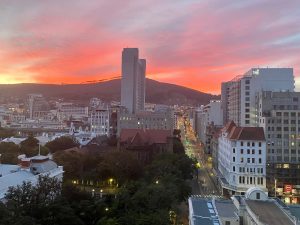
Another sleep interrupted night. Plague of mosquitoes. Dreams that crash and burn like 8mm film jammed in the projector wheel, shuddering and breaking and curling up in the heat. Get up, muttering and mumbling, waiting for some smart arse answer that doesn’t come. I’ve always had someone to talk to. Once overheard someone say — eavesdropping is a fine art nurtured from an early age growing up in a large family where you can easily be overlooked or become invisible — people who talk to themselves are definitely not right in the head. It worried me. I did a lot of that and I was right in the head. Decided I wasn’t really talking to myself, I was talking with “other” people. And, so began a long, on-going conversation. The characters changed, years went by without a word spoke between any of us. Sometimes it got rowdy. At times it seemed to solve the burdens carried across the world. Here, on the 11th floor of an apartment block in Cape Town, two of my “other” people are the baristas at the Uganda and Colombian Cafés. The picture shows the respective establishments: the Uganda Café (left) uses a traditional white cup and saucer. The Colombian is more trendy — glass coffee canister and glass cup. This is lockdown reality, and I was prepared for it. So, no, there is no boulevard of cafés in the sky. Just me, and two “other” guys who serve me coffee, one from pure Ugandan beans and the other pure Colombian. Black, no sugar. Thanks. Out in the harbour, dolphins frolic bringing everyone to a standstill. And for moment, we are caught in the rippled shimmering water, spellbound: there is no lockdown, no COVID-19, we forget we’re hidden behind masks, and we smile at each other and at the sky and at the sleek oblivious creatures frolicking in the sea. The moment passes. I sit back on the bench. A small white dog yelps and jumps up beside me, his stubby tail shaking and his tongue wagging. He wants a cuddle. So do I, so we do it. And his mother catches up with him — he’s off the leash — and says, “That’s right. Sick and tired of just being with your mum, aren’t you.” He gives me a final lick and bounds off after her. Had to stop myself from barking. “You’re welcome.” Cycle back past the burnt-out Mini. People stand around, talking. A man hands out sandwiches to street people from a cooler box. That must be Fred. I hope it’s Fred. On the way home, look up at my apartment block. Later, watch the sun set.
Latest Post Below
Day Forty-three: Friday, 08 May 2020
Waiting to fill my thermos flask with coffee from the Uganda Café — service is getting slack here — when an almighty yelling and bellowing cuts through the babel of hadedas, guinea fowl, innocent, free-whistling tree-top birds. Step on to the balcony. Can’t see through the trees, but there is garralous and loud unhappiness at the entrance gates of the Company’s Garden. Ride out, and there is a man on all fours howling, smashing his fists into the stone paving at the entrance of the Garden. Rage. “Rumble thy bellyful”. Three women walk past: they don’t break stride, they don’t stop talking, they don’t look back. I ride on. Push up Wale Street — why does it not get easier? A single-gear bicycle taxes you more than you will believe possible. You have to push each pedal. Sit and drink my coffee as the sun rises. My dog friend of yesterday scampers past, recognises me, and leaps up for a lick and a yelp before his mother calls him off. I ride home. Today marks 75 years since what was termed “Stunde Null — “zero hour” — when, at midnight on this day in 1945, the Third Reich surrendered and WWII came to an end. Germany, now and forever, would have to confront its Nazi past. The process — Vergangenheitsbewältigung — is on-going. The most astounding fact remains: Hitler’s “Third Reich” which he claimed would last 1,000 years, lasted only 12. Twelve years, and yet here we are 75 years later, facing a generation that no longer wants to remember the extremes of that brief period. A hint of melancholy accompanies me on to the balcony. Sit and watch the city pretend it’s a city. What does it mean to find or come home?
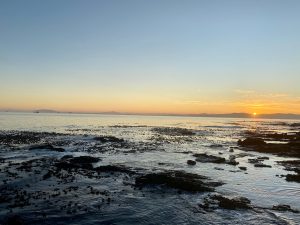
Day Forty-four: Saturday, 09 May 2020
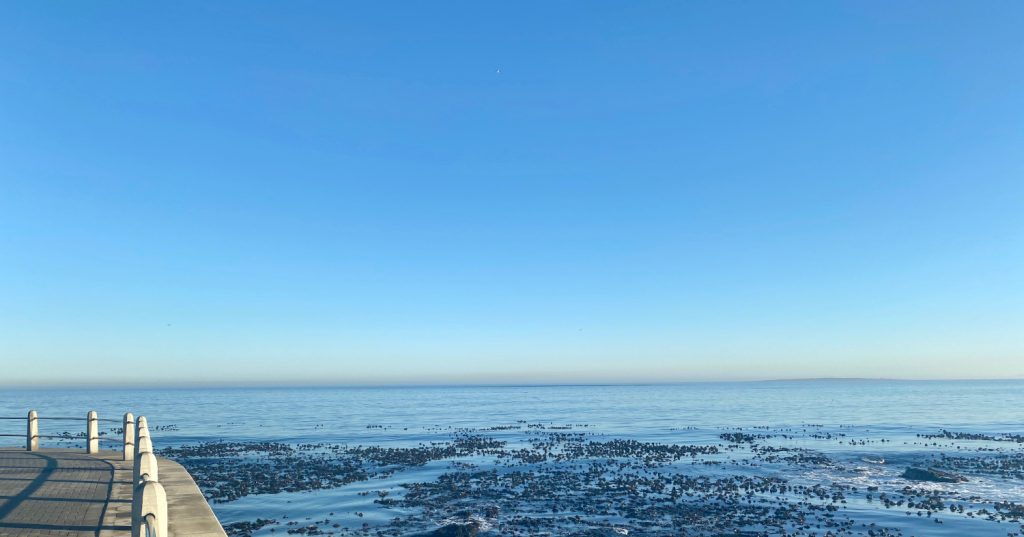
Wake late from a troubled sleep, grab a thermos of coffee, get on the bike and cycle. Slow. Avoid the long hill hauls. The promenade is crowded. The police action, so far as I’ve seen, has been to tell people to wear masks — and still, the unmasked ones argue. Yet another glimpse into the collective stupidity of our species. And yet, there are voices providing hope. The son of a dear schoolfriend writes of the tears he sheds. And, no. It is not a moment of self-pity. It is the breaking of a heart of one who has thought deeply and acted incessantly to come to grips with the fact that, as a nation, as individuals, “we can’t find politically feasible ways of sharing the wealth we have”. And if you think he is referring only to the fiscus, you have some way to go before you reach your soul. Read a startling piece of journalism in Der Spiegel: its reporters spoke to people across Germany about their memories of that day on 8 May 1945 when the Third Reich surrendered to the Allies. It’s an exceptional piece of journalism. Two things jumped out. First, that the very next day, in Los Alamos, in the USA, Interim Committee on Atomic Energy convened its first meeting: “They were there to discuss the weather — in Japan.” This must be the most chilling sentence in history. The second thing that jumped out is too much for me to repeat. Listened to the speech given by Germany’s Federal President Frank-Walter Steinmeier to honour the occasion. Read it to understand why Trump — and his Republicans —and Johnson — and his Conservatives — are so on the wrong side of history. When Trump finally goes, you will be hard-pressed to find an average American who was a Republican. Just as in South Africa, after democracy, you could not find an average white person who had supported the Nationalist Party. “Remembrance never ends,” said Steinmeier. “There can be no deliverance from our past. For without remembrance we lose our future.” And then Little Richard up and dies. And my family will understand the significance of this song. RIP rock ‘n roller.
Day Forty-five: Sunday, 10 May 2020
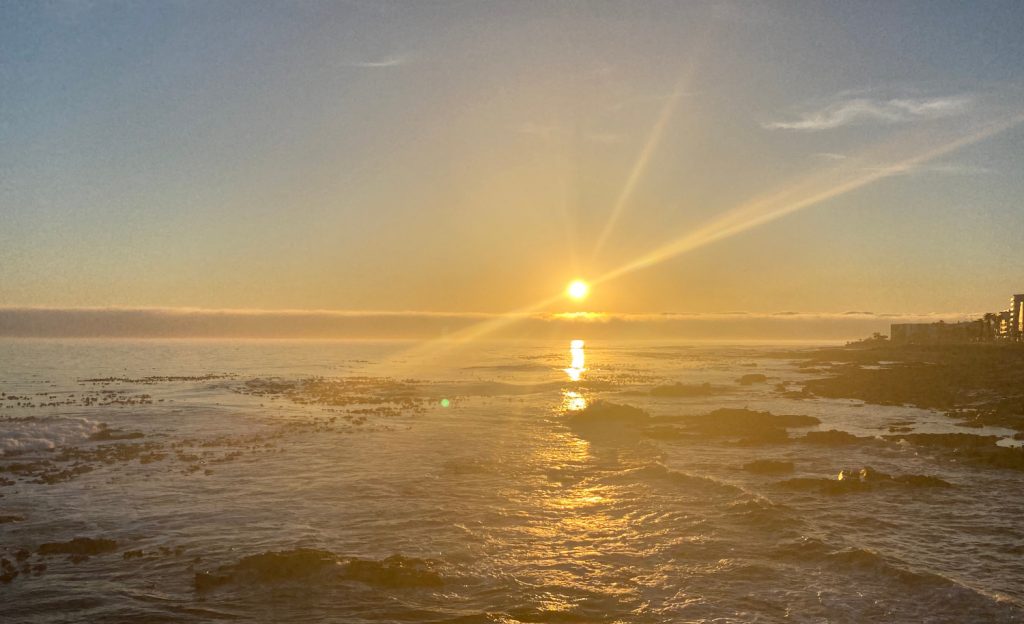
The day starts late. The birds squabble in the Company’s Gardens. The dark dogs howl. Grab a thermos of coffee and set off. The promenade is awash with people: social distancing is a fluid mess. The sea, low-tide flat and the shoreline rocks like the fossilised spines of ancient monsters glisten black and wet. The morning’s coffee contemplation, marred by desultory temper. My mind is sullen. This is a dark memory day for a close friend. A handsome dog with a whippet-thin waist and boxer’s rib cage sniffs my shoe, offers a disdainful look, and trots on, tail erect and scrotum in full display. I want to bark: “You greedy old wolf/I’ll show you my heart”. Nothing can be done. A young woman stops, climbs over the railings that line the edge of the promenade, sits with her back against a support, and films the already risen sun on her mobile, sweeping it across the bay and back, across the bay, and back repeatedly. Drain coffee cup, re-attach facemask, and slowly cycle home, past the burnt-out Mini, which is now adorned with paper flowers and messages of support. Fred, for I think it is he, addresses a crowd, his facemask — a replica of the SA flag — pulled down under his chin. Keep moving. The day lifts. The light dogs bark: a colleague announces her partner has proposed marriage. She has accepted. She is immaculately gorgeous, smart, measured, and delightful company: he is frankly handsome, savvy, quietly confident, and easy-going. I promise to offer no advice on marriage. Read Marina Warner in the London Review of Books reviewing the recent Penguin edition of The Arabian Nights: Tales of 1001 Nights, translated by Malcolm Lyons, with Ursula Lyons. There is a comment in there that sets a slow steam-train of thought. The translators have opted to replace the word “mermaids” with the phrase “extraordinary sea creatures that looked like humans”. Politically correct? After all, there is also the term, “mermans”. But this is The Arabian Nights and they were being “presented to the sultan as special gifts and given basins of water to live in, only to die of the heat”. But Warner sums it up: “The Arabian Nights is a pre-eminent example of the travelling text, an extraordinary case of cross-fertilisation, retelling, grafting and borrowing, imitation and dissemination back and forth between Persia, India, Iraq, Turkey, Egypt and Europe over several centuries. Narrative sequences of this sort – interlaced within the frame of a ransom tale – became nomadic, camping and settling until they were indigenous throughout the world.” And is this not what we all are — a “travelling text”, and endlessly looping “narrative sequences”?
Day 46: Monday, 11 May 2020
Early start. Cycle to meet a friend in Sea Point, then we walk on to the promenade. It’s that hour-before-sunrise darkness in which you can see the shapes of things but the edges are murky, the details blurred. People are going to work, people, perhaps emboldened by the gloom, walk without facemasks as if COVID-19 won’t matter. Or maybe they believe, along with the government, that the virus sleeps between the hours of 6 and 9 am? My friend is given to philosophical debate, some of which hinges on the nature of family, what it means to be a good parent, and some on how we think about thinking about things. Within these there are usually anecdotes, seemingly trivial observations but which run like a fine thread through the conversation. By the time we are on the return the sunlight is beginning to show and we stop for coffee. I packed rusks, and he a thermos. We watch the water in silence before making the final leg home. From the balcony, the city idles, no longer shut down, but not really working. It’s been more than ten days since the blanket man last appeared. Has he adopted another guise? Has he moved to another neighbourhood? In the apartment block to the east, a young man sits each day at his computer. Now he has placed two spare chairs on the table on which he rests his computer and works standing up. Restaurants are opening, selling takeaways. Church Square is filled with delivery bike riders, who lounge on the benches and lean on the seats of their motorbikes. No one wears a mask. Their conversations are low and animated. They are not busy. They wait. We wait.
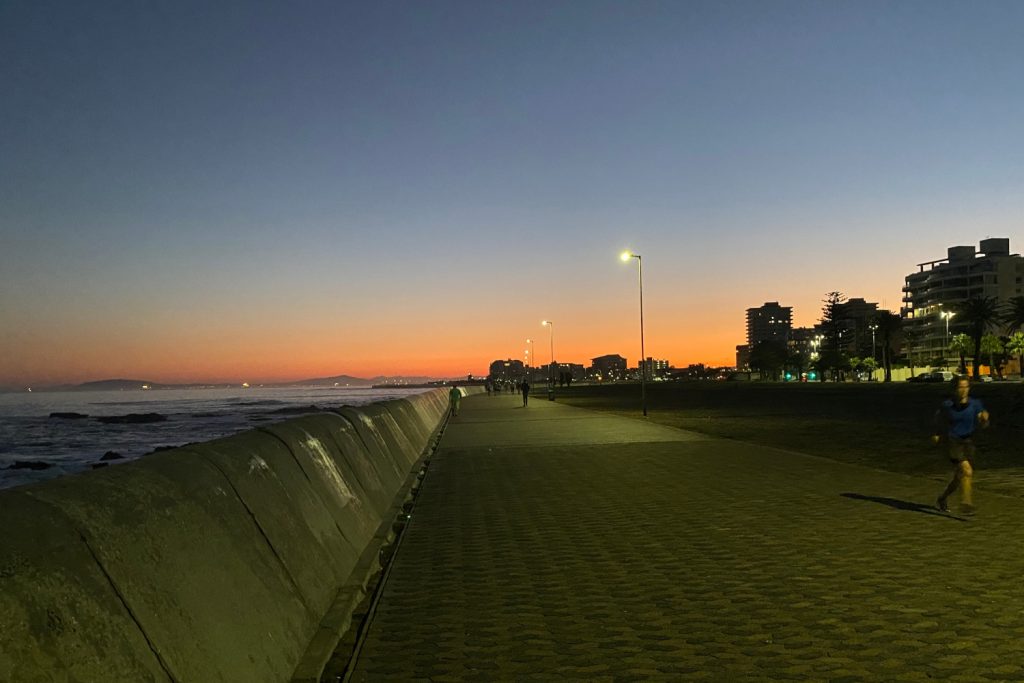
Day 47: Tuesday, 12 May 2020
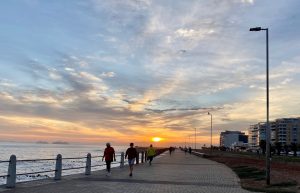
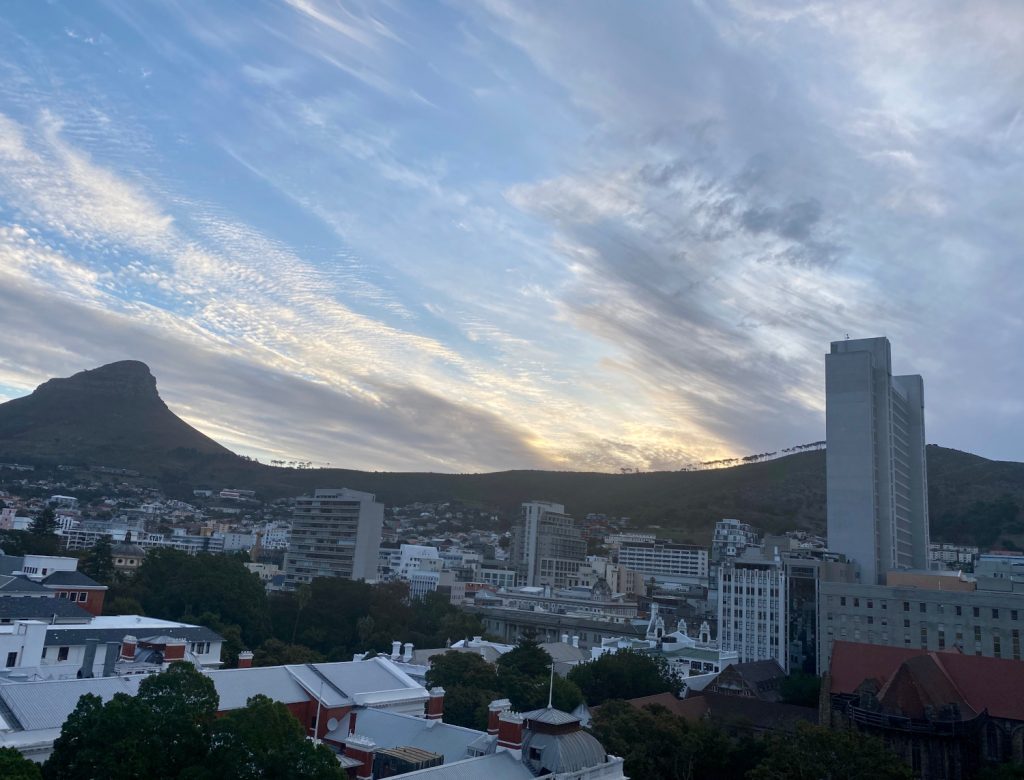
Turbulent night.
I wake up cold,
I who
Prospered through dreams of heat
Wake to their residue,
Sweat, and a clinging sheet.
Switch off thinking. Go through exercise routine. Collect thermos of coffee from the Uganda Café, and head out. The birds in the Company’s Garden are raucous. Wale Street seems twice as long and three times as steep. A police car, lights flashing, is parked on the corner of Buitengracht and Wale, and the officers are involved with the group of street people camped there. No hard words, nothing physical. Turn into Rose Street. A runner heads towards me, fast, breathing heavily, young, lean, bearded, and without a mask. Recall an article sent me by a friend, which says one ”would have to be in their airstream for 5+ minutes for a chance of infection”. Up the pedal power and within five minutes there’s a kilometre between us… Where is the truth that rests somewhere in the myriad facts, the truth entwined in shifting algorithms, the thing that will set us free? COVID-19 is a petri dish for conspiracy theories. Read that this is the time to strip down, to de-accessorise, to minimalise, to enter the post-COVID-19 era unencumbered; that this is the time to really keep it simple, stupid; to cut through the crap — the clichés are recycled like used tires and PET water bottles. Meet a dear friend on the promenade and we share a cup of coffee and my world gains a small immeasurably valuable moment of equilibrium. The next world — hesitate to call it the “new” world because it won’t be new: it will be worn down, damaged in parts, broken in others; it will be desperate and filled with the craven and the oblivious and the confused, told nothing, receiving no rewards, making their way down the road without signposts or even the dream of a road-trip.
Day 48: Wednesday, 13 May 2020
The day is overcast. The government seems to have hired the Monty Python team, overseen by MiniMe, to devise a fashion list of what we can and can’t buy to wear in its struggle to contain the COVID-19 pandemic. It’s hilarious. Delighted to learn that “golf shirts” were included as an essential and government-approved item of apparel in this relentless struggle. Going out during “exercise time” is going to feel like being permanently stuck in a movie called Golf Academy 4. Cycle along the prom and encounter two dear friends. We share coffee — now carry a spare cup for such chance encounters. Rendezvous with a friend in the Company’s Garden and we walk to find coffee (the thermos is empty). It’s raining lightly and nobody seems to pay it any mind. We sit on a bench, sipping our coffee. It’s as awkward as a first date because there’s so much to say, and yet conversations for the last seven weeks have been inner dialogues and somehow the words don’t come out. Yes, we talk on Zoom and WhatsApp, but it is not the same as watching someone talk to you, watching more than just their eyes, but their mouth and the shifting and fidgeting, their hands, and all the nuances that go into a conversation. A familiar ginger cat walks swiftly across the road and stops. A bulky, hunched and somewhat weathered woman with round cheeks walks towards the bench and stops beside a nearby rubbish bin. She opens a plastic bag and arranges two old plastic containers on the top of the bin. She calls to the ginger cat. From the bushes emerges another — a speckled white and black and ginger creature — I have not seen before. The two cats are wary because we are close. The woman calls again, “Come Spotty,” and as Spotty darts across the road, Ginger follows, and they hide behind her large, worn and shapeless trainers. She spoons food into each container. My friend says the cats look very healthy. The woman pauses. “I feed them the correct food,” she says and continues sharing the food. I ask if she feeds them every day. She doesn’t answer, looks at me with narrowed eyes. “I come here for them,” she finally says. We leave them in peace, as she bends down to place the food on the ground. The world is an accretion of little mercies.
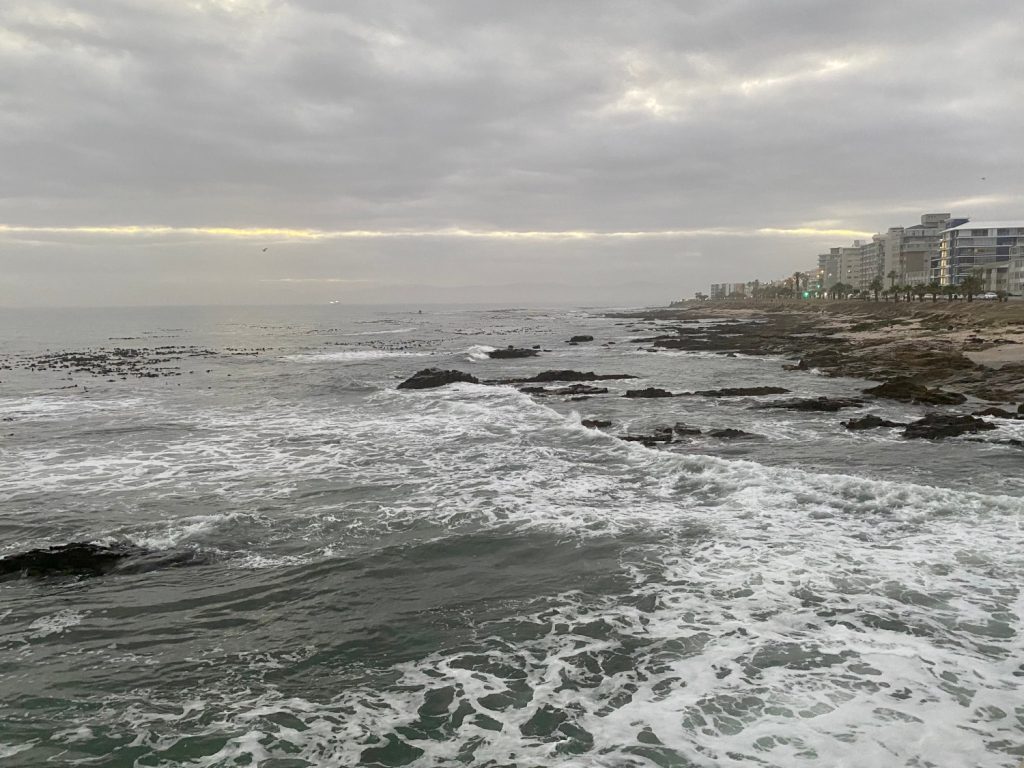
Day 49: Thursday, 14 May 2020
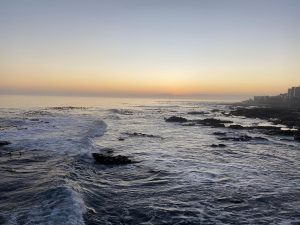
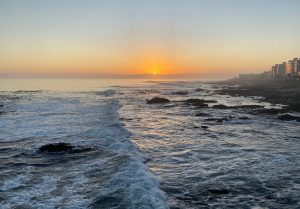
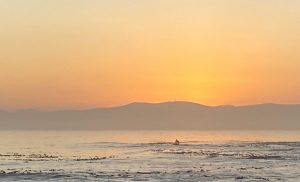
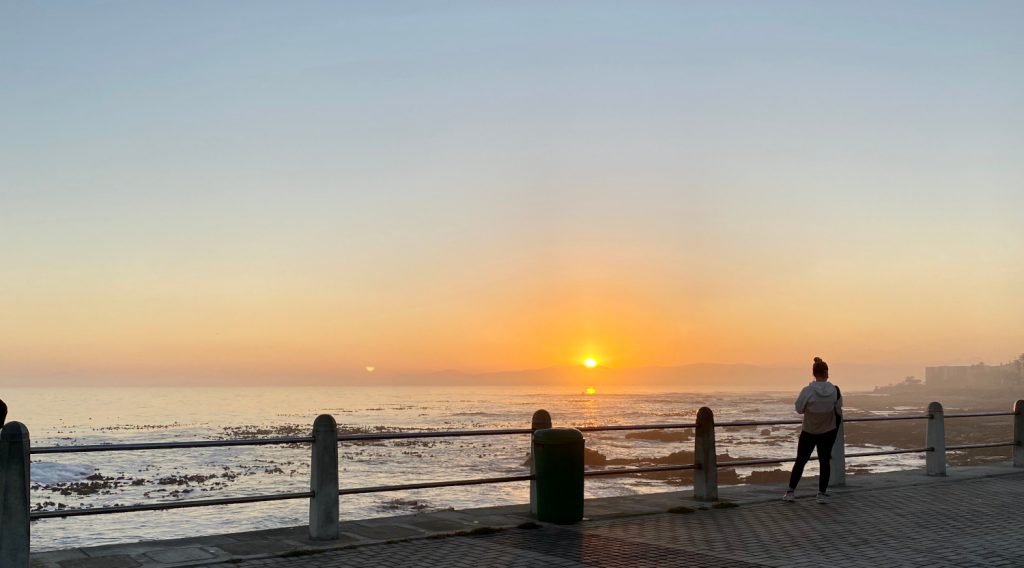
The President addressed the nation last night. He’s worn down, exhausted, more by the internal internecine struggles within the party, as the minister of co-operative governance and traditional affairs Nkosazana Dlamini-Zuma — she who would be president — and her cohorts continue to chart a course different from that which he heaves to. A local DJ made a great video about her reasoning — if you smoke enough it will sound reasonable. Enough. Collect the thermos from the Uganda Café and head for the promenade. It’s dark still and people huddle in the doorways of minimarket cafés, waiting for them to open. Hit Wale Street hard and swing on to Rose Street, sit back breathing heavily. A dog darts across the road. By the time I am in Sea Point, the morning is light. On my return, stop at my favourite bench and have some coffee. Out on the water, dolphin leap and surge. A tall woman in floral-patterned bell-bottom pants that ride high above her ankles and platform shoes, walks in circles, talks loudly in German on her mobile. She is, it would seem, disapproving of the actions of the person on the other side of the connection — “Unglaublich!”, etc. At home on the balcony, bird-song fills the air, and high above, the two African pied crows return, riding the currents. Perhaps they seek a nesting spot. They start breeding in July. A car alarm wails incessantly. Start working.
Day 50: Friday, 15 May 2020
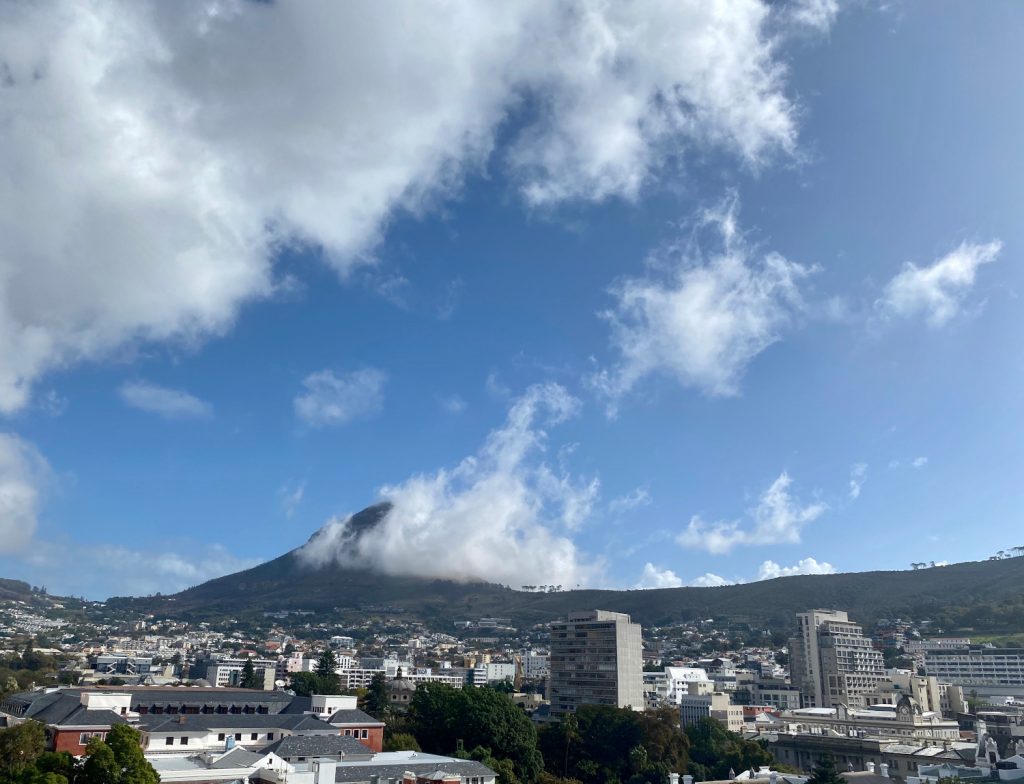
It’s raining, lightly. It’s 50 days. Wale Street, slick as an eel’s belly, a coruscation of street lights and traffic signals. Do I ride? The answer comes in a WhatsApp ping, and an urgent request from a work colleague. I don’t ride. With the first cup of coffee from the Uganda Café in hand, start working. Realise the good fortune of having work: it cuts through the lassitude of lockdown, the malmy, malison of melancholia blurring our view of the world. Come across a quote scribbled in a diary: “how far are human brains capable of functioning with concepts, detached from sensory experience?”. Taken from R.L. Gregory’s The Intelligent Eye. He examines how the brain interprets signals from the eye — and what it discards. Feel the craving for sensory experience: to see, touch fellow beings, to be functional, to not be undetached. The diary entry was made in May in 1977, while in Athens on holiday. I was married, broke, and living in Sudan. Some weeks before leaving London a year before, I walked past the Deutsche Bank office in London, and on a whim entered and walked up to a man seated at a desk. He stood, fastened the middle button of his suit, and formally introduced himself but did not indicate I should take a seat. His voice, in the fortified silence of the office, seemed like surround-sound. Startled, I stuck out my hand, and we shook. “I want to open a bank account.” He looked at me — he in a dark suit, white shirt, deep blue tie; me in jeans, khaki shirt, and army surplus leather boots. He nodded, excused himself, and walked through a door (no security cards or code panels then). A few moments later, he came back and introduced his colleague. Again, I shook hands. “You wish to open an account?” His colleague smiled. I babbled. They listened. The smiles grew wider. I walked out with a foreign bank account into which £50 would be deposited monthly (worth about £180 in today’s terms). Don’t ask me why I did this, or why they agreed. There I was a year later in Athens, waiting for the bank to transfer £400. Waiting, broke, and with a wife who thought she might be pregnant — I had had a vasectomy, she’d gone off the pill —and here, months later, we were worried it hadn’t been successful. I sat down and wrote an article for a local English language magazine — The Athenian — and they paid me for it. My first money-for-words. Never looked back. The pregnancy was a false alarm. Marie Stopes Clinic and the NHS had performed admirably. A week later, the bank transferred the money to the American Express on Syntagma Square. We were flush. We went to Kythera. I meet the man who indirectly introduced me to Kythera, and that’s another story. Early morning, I would rise and go down to his house on the hill overlooking Agia Pelagia and help with the restoration of his 300-year-old family home. During WWII, the Germans occupied the island and stripped most of the farm homes of all the wood: the roof beams, door and window lintels, and everything else. Slowly, he’s restoring it, while living in a cluttered room with one window and a wide, low doorway, and cooking his meals on an open fire out front. He tells me he can see the sunrise through that window. Mid-morning, he says, let’s break. He sits down in the shade of an olive tree. This tree, he tells me, is 1,000 years old and who would contest the gnarled, ageless contortions of that trunk and those spreading branches. Exhausted by the labour, I was eager to get home, and made my excuses, and left, thereby destroying the chance to hear a conversation about his life, my life, and all others in this state here and now — a chance never repeated. Stop and listen. Always. A friend sends a video. These are the moments of nostalgia that will haunt the old age of these men, yet we keep on trucking. You can’t see nostalgia up ahead, and what you see in the rear view mirror may not always seem closer than it is. Eventually, we all crash and burn. The sky clears.
Day 51: Saturday, 16 May 2020
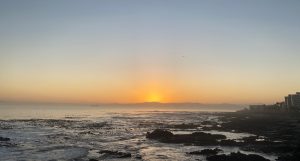
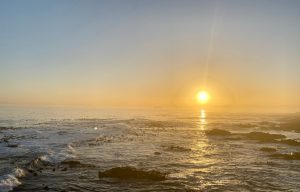
As I walked out on to the street this morning with my bicycle, I saw the blanket man crossing Church Square. He’d lost his flamboyant bed cover and hugged a threadbare grimy blanket of an indiscernible colour. He’d swapped his white slip slops for chunky laceless trainers. He shuffled down the empty Parliament Street, silent, and I kept on watching as he kept on walking his road to Jericho. On my bike. The most noticeable thing about the shift to level 4 is the geometric increase in litter on the streets: drop one level, and figure on litter climbing tenfold. Cycle through the Bo-Kaap, no longer filled with tour buses, and notice the street corners piled high with trash. Who dumps it there? And why? The promenade is dark. Stop at the bench, take photographs, pour coffee, watch the sunrise. My dog friend bounds past, stops and runs across, leaps upon me, tail going at 90 per second, and gives me a slather of licks. I hug him. His mom shakes her head and says, “He isn’t like this, usually.” “We’re old dogs,” I say. She shrugs, and they move on. I cycle slowly home. The avenue that runs through the Company’s Garden is filled with people. The military personnel stand at the entrance. On the balcony, sip a fresh cup of Colombia Café coffee. The refuse collection lorries are still running and never stopped. Two street cleaners sweep up the over-turned rubbish bin on the corner of Adderley and Bureau Streets. Later, cycle to the Gardens Centre and stand in a long queue to get into Woolworths. Everyone is masked and in their designated square outlined on the floor. Security guards quietly wave us forward. Turn to the woman behind me and ask how she’s finding this weird time. She scrambles for her mobile, turns from me, and pointedly begins scrolling through her screen, as though she’d been made an indecent proposition. I look around: no one is talking; no one is making eye contact. Later, after a conversation with a friend about corporate presentations. We agree those 150-page PowerPoint presentations need to be replaced with three-minute videos. She sends me a link to a delightful video about tea.
Day 52: Sunday, 17 May 2020
There are drawbacks to the paranoia brought on by lockdown. The virus stalks you. It’s not random. It seeks you out. The handwashing extends to wiping down every surface and door, cupboard, and drawer handle with the ever-present mix of bleach/water, wiping the toaster and the oven dial and the light switches. Yesterday, get back from a cycle ride and follow the ritual: take off shoes at the door, and spray them with the mix, strip down and throw everything into the washing machine: cap, gloves, mask, pants, T-shirt, socks. Take a hot shower. Then, while organising another cup of coffee, look inside the washing machine, and see your red rear reflector light, flashing in the washing machine. Because it’s detachable, and because you put it in your back pocket, and now your paranoia is flashing red signs in the machine. My phone pings: it’s a message from my bank saying save water and only use your washing machine when you have a full load. WTF?! Did I mention paranoia? Paranoia reinforces habit, and habit morphs into ritual… Not. Ritual requires awareness, a consciousness of each enactment. My hygiene habits are just flat out, “It’s coming to get me!” shit, and if I scrub hard enough… Set out this morning with no rear reflectors on the backside of my bike. Beautiful day. Having my coffee on my usual bench and a regular walks past says “You’ve owned that spot” — and I nod. A friend stops. Don’t recognise him because he’s masked. I’m not. I’m sipping coffee. We talk. His bicycle is a gleaming red affair with streaks of gold and polished steel, immaculate, and sporting perhaps more gears than your average Tour de France bike. Mine is a metal grey single gear spattered from the rain and sea spray. Get home and immediately wash the bike. Roast a chicken for lunch. The city is quiet. My Italian neighbours on their enclosed balcony have thrown open the shutters, and I can hear them arguing loudly. Or maybe they’re just talking. Hard to say because I can’t see them gesticulating. Have to exit a WhatsApp group because one of the members keeps posting fake news about the pandemic — it’s all a conspiracy. Ho-hum. Eat lunch and listen to Rebecca Malope. It’s almost enough to make you a Christian child.
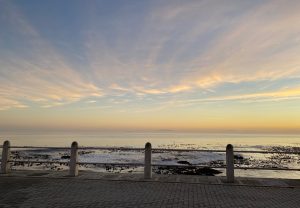
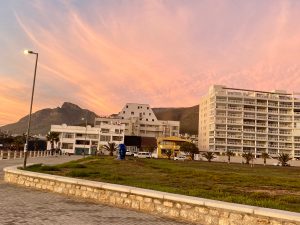
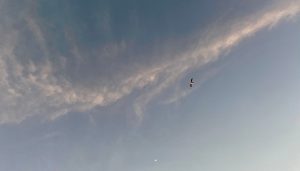
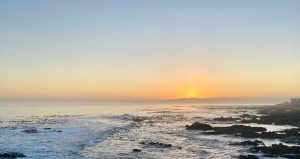
Day 53: Monday, 18 May 2020
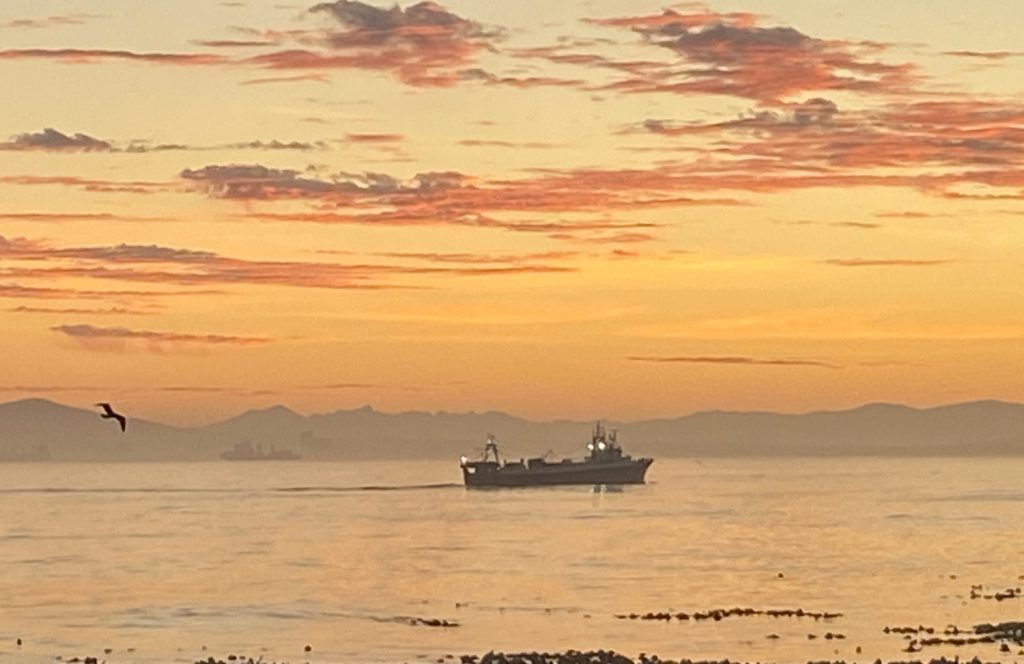
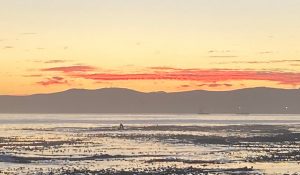
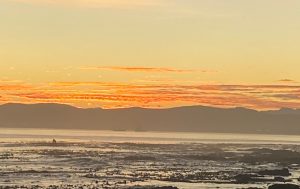
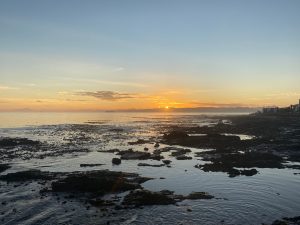
The dolphins out at sea flop around, languid, not even flicking a fluke out of water. Sip coffee. Watch dolphins. Content? Does the question have relevance anymore? Yes. Of course. The pandemic does not make irrelevant what we felt or thought before. It just dispels our usual answers. And who knows the new ones? We don’t the answers, and even if when we did know — or thought we knew — there was still a right or wrong answer. Now, there is no answer, neither a right one nor wrong. Everything is suspended. Nothing has any completion. Before, you went to dinner with friends, opened some wine, had a meal, and then said goodbye, hugged everyone, and went home. The circle was closed. Now, we meet on Zoom, and we finish, and yet everything remains suspended. The circles of life’s small moments remain incomplete. Back home put on Beethoven’s 9th and sit on the balcony to watch the city uncoil from the night. Later, I will visit my local bicycle shop and buy new lights.
Day 54: Tuesday, 19 May 2020
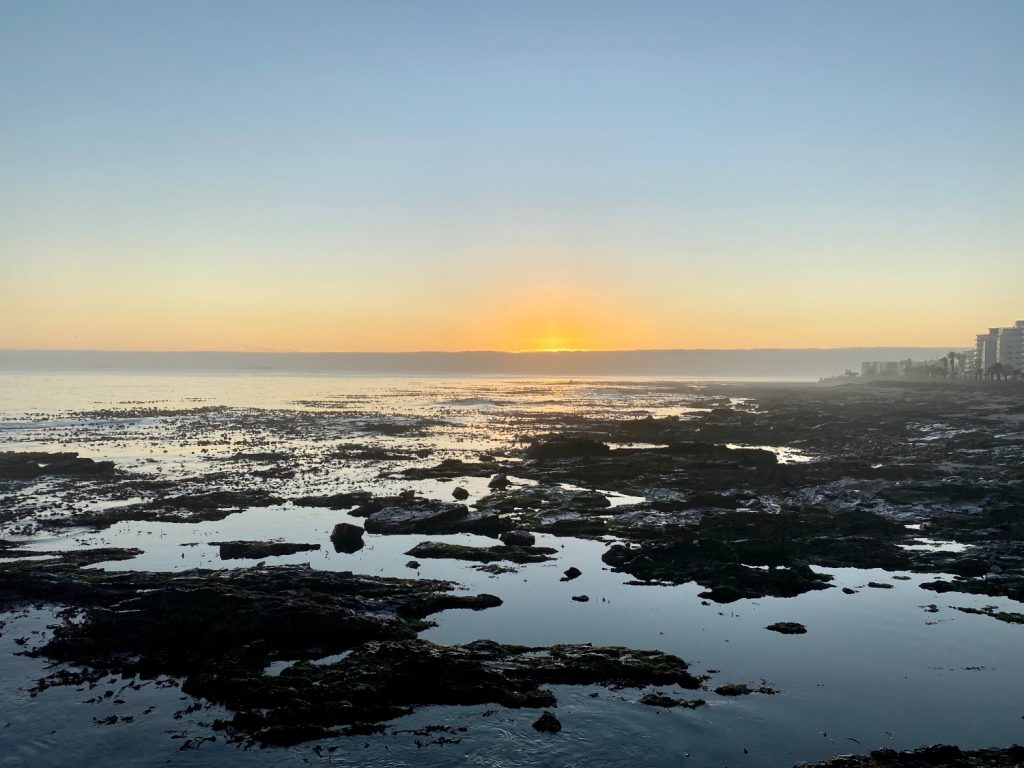
The birds in the Company’s Garden chatter in the dark. Push up Wale Street, swing right on Bree — bloody hill is not getting easier — down to Strand, left, then through De Waterkant and on to Somerset Road, under the flyway, down to Granger Bay, Beach Road, and hit the promenade. Around Mouille Point lighthouse I sense a bike on my rear wheel. Ignore it, push hard but he sticks. On the way back, coasting, he pulls alongside. Also has a single-gear bike, with snazzy white-rim tyres and a fair amount of gleaming black and chrome. He’s an engineer, keeping 16 people on the payroll, and “using this time to catch up on my paperwork”. Another unsung hero. At Three Anchor Bay, he drifts left towards Greenpoint.
Stop for coffee at the bench. A young woman runs past and stops to watch the sunrise. She then gets down on the pavement — on the other side of the railing, out of the way of inquisitive dogs’ noses, and aimless toddlers — and begins a gruelling regime of planking, squats, sit-ups, etc. I am exhausted watching and want to lie down and snooze. Pour another cup of coffee. A couple take pictures of each other. She’s chatty, and greets me with a smile — and most people walking past — while he is brooding and unsmiling. Opposites attract, it is said. Cycling back, the city is empty, yet restless. The street sweepers busy. The once empty rubbish bins are now full and the contents upended and strewn on the street, hungry pickings, and the city odours are returning: the harbour water, a mix of oil and diesel fumes and salt air, rotting refuse. Maybe it will all just go back to normal — Snafu, as it was once described. A friend sends me a link. Cape Town’s levels of recorded COVID-19 cases — the highest in the country — has made the Washington Post. With 9,300 recorded cases, the City accounts for 60% of the country’s total recorded infections. Also hear a separate set of restrictions will be imposed on those over 60. Ho hum.
Day 55: Wednesday, 20 May 2020
The morning is still. The muezzins’ calls a vaguely discordant sonorous liturgy — there are around eight mosques all within a few blocks of the apartment — and the waning moon hangs high above the horizon. In a few days, the new moon will signal the end of Ramadan. On the bench with a coffee and deep sense of pleasure, watch the dolphins, unhurried, loping through the water like water wolves. Tireless. The morning is glorious, and soon the promenade is full. Two dogs fight. Their owners begin a futile scramble to separate them. More bark than bite here, fortunately, and eventually the dogs separate and the owners scoop them up and look sheepishly at each other. Dog training schools should have a particular course for owners on “How to stop a dog fight”. It would avoid this sort of embarrassment. Back home, a friend calls. He’s a voracious reader and has just finished a book that traces Brexit back to Cecil John Rhodes. It is not as mad as it sounds in that simple sentence. I agree to read it and get back to him. We discuss the number of our school mates who are promoting conspiracy theories about COVID-19 and put it down to the air pollution from the Masonite factory that some afternoons hung over the rugby training fields as noxious as a dog’s fart. Meet a dear friend at the entrance to the Company’s Gardens. We grab a coffee and chat. It’s the illusive relief of normalcy. The day passes quickly. In the evening, a vociferous street maintenance crew gets busy on who knows what. Street cones are planted up the east side of Wale Street; trucks pull up with lights flashing. Nothing seems to happen except loud conversations and a lot of running between vehicles and across the street. I can’t see anyone with a clipboard so presume nothing will be accomplished. I settle to watch another episode in a weird, somewhat gruesome thriller series. WhatsApp a friend who is also hooked, but some episodes behind, that it gets weirder. She says it should come with a warning. Tell her it does: “Made in Finland”. Eventually, go to bed.
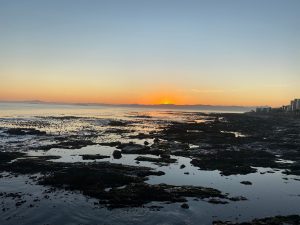
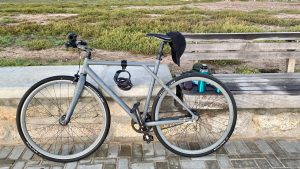
Day 56: Thursday, 21 May 2020
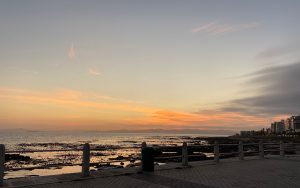
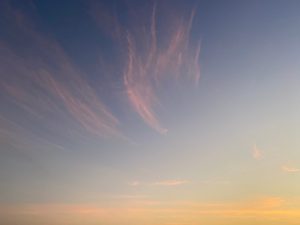
The wind wakes me. Collecting my bike off the rack in the courtyard behind the apartment, the janitor walks past. “Morning, sir,” I say. “Morning, boss,” he replies. “Exercise?”“More just being out,” I say.He nods. He’s wiry, well-muscled man, gleaming walnut brown skin, Rasta hair. “What’s your name?” I ask. “Rainbow,” he says. “I’m Donald,” I reply, and we both self-consciously hold back from shaking hands. Out on the street, the cold air tingles around my bare arms. Though it’s early, the promenade is already getting crowded. Push on the outward trip, turn and coast back. Mask down, I sip coffee, watch the turbulent black water, heaving, the tide far out. A woman in a beautiful frock of olive green with a small white flower print strides past, the cloth wrapping around her legs with each stride. She has a colourful multicoloured scarf around her shoulders and is engrossed in conversation with her two colleagues. And an earworm settles in and lasts all the way home. A couple on bicycles, their faces swathed in scarves and masks stop to photograph the sunrise. As they leave, she says, “Hi, Don.” No idea who it is. Cycling back, the wind picks up. Chat with the security guard, and mention my conversation with Rainbow. “Rainbow?” he says. “You mean Rambo.”“That’s what I said.” I say. He shrugs.The restaurant, Pilcrow & Cleaver that opened in December and was closed by COVID-19 eight weeks ago has re-opened with a takeaway service. Speak to the chef through the open window. “It is what it is,” she says. I order an octopus curry. Delicious.
Day 57: Friday, 22 May 2020
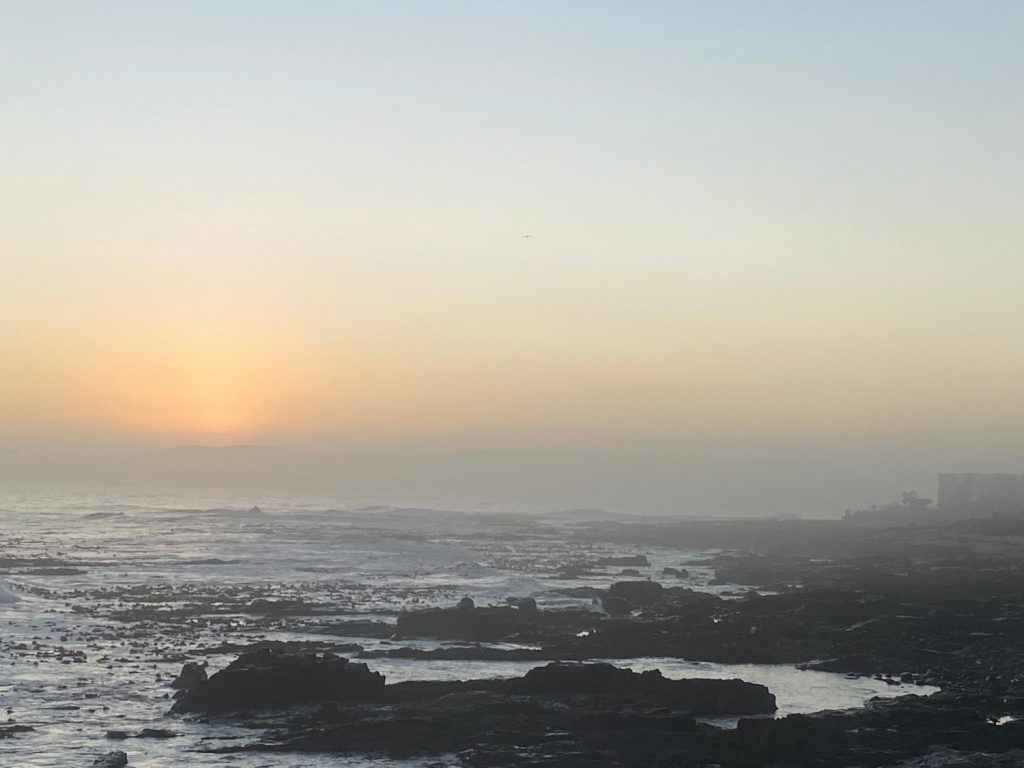
The morning is murky and the sea heaves, the surface fractured and dark. On the bench with my thermos of coffee, I watch the gulls shriek and dive overhead. Three men walk past in silence. They’re here walking every morning, always engaged in conversation; one or the other holding court. Yet, on this morning’s morning walk, they are silent, gloomy. A small dog with a Go-Pro camera attached to his elaborate shoulder collar holster jumps up on the bench and gets an ear scritch, before jumping down and chasing after his dad. What do they do with all the video footage? Stop at a supermarket on the way home. A security guard watches me padlocking the bike to a railing and says there’s no need as he will watch it. I thank him, padlock the bike, and wonder why I feel bad about it. The young woman spraying disinfectant on our hands as we enter has lively eyes, and one can sense her smile behind the mask. Back home, remember that this coming weekend I had planned to be in Paternoster. A friend calls. She is in town. She wants to visit. I tell the security guard in the foyer my daughter is coming, and will he please let her in. Then cross the square and place an order for lunch. We sit on the balcony enjoying the meal. But these are troubled times, and that’s why she is here. I can proffer nothing but a willing ear, platitudes, and wine. Read a review of a recent biography of Simone de Beauvoir, in which the reviewer — who met de Beauvoir — seems slightly obsessed with a photograph of Simone de Beauvoir’s bum. The photo, reproduced in the review, was taken in the bathroom of one of de Beauvoir’s long-lasting lovers (not Sartre). Talk with a friend who says the first two weeks of lockdown were the worst, and now they’re OK with it. Realise it’s the opposite for me. The street garbage piles up. My guitar lies neglected, and random songs no longer drift through my head.
Day 58: Saturday, 23 May 2020
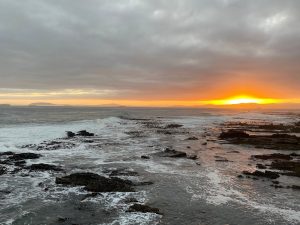
Wake up early — a year older. Cycle slowly but it’s still dark when I reach the promenade. Do the circuit and stop at the coffee bench. Overcast and the dolphins are at play, lazy, barely breaking the surface. Decide to do the Sea Point circuit again, and then swing up on to the main road. Too many minivan taxis and they enjoy driving as close to you as possible. Cut down a side street and follow the usual road home. Decide to do some shopping and go to the Garden Centre. It’s early. No queues. On my way back, stop at Nude Food to buy bread, feta cheese, and a coconut milk/lemongrass cordial. Don’t know what the cordial is for but it just seemed a thing to buy. The bagel shop is open, so I decided to treat myself to a bagel for breakfast. The guy in front of me is placing an order, but each time the server asks something like, “Do you want plain or sesame (or whatever)?”, the guy has to refer to his partner who is sitting in a fuck-off SUV wrapped in swathes of scarves, a glitter facemask (go figure) with an oversized cloth cap on her head. “Sesame,” she says. So, it’s now six sesame six plain. But then he says to the server he doesn’t want 12 bagels — it’s a special deal that’s being offered. The server says “OK, so three of each.” The guy shouts at the partner, “Three sesame, three plan?”
“No,” she says. “Just plain.” The server says, “OK, six plain — but it will cost the same.””What do you mean?” says the guy. “It’s a deal,” says the server. “But what do I do with 12 bagels?” “You can freeze them,” says the server.”Hey,” he shouts to the partner, “we can take 12 and freeze them. You sure you want just plain?” She says, “No. Get some sesame.” ”OK. Make it six sesame and six plain. But you sure I can freeze them?” The server smiles. “Let’s say three months, no problem.”By now the queue is about ten deep. “I don’t want six sesame,” shouts the partner from the SUV. Perhaps they need to go to couples counselling?At this point, it would be legitimate to shoot the guy and the partner?A lifetime later, I get to place my order for a plain bagel with smoked salmon and cream cheese and ask them to throw in some red onion. Back home, and I notice water on the floor in the bathroom. There’s a leak somewhere behind a wooden panel. Back on the bike, up to the hardware store and buy what tools may help. Open up the panel, and it turns out the central water system pipes are corroded and leaking, and the drip factor has finally penetrated my walls. Body corporate issue. Sort it out on Monday. Eat my bagel, and start talking to family and friends dialling in. A dear friend delivers a great gift. Cook a ribeye steak, with mushrooms, pan-fried potatoes, and wilted baby broccoli. Open a bottle of good red. Get on with learning to live alone.
Day 59: Sunday, 24 May 2020
The morning is beautiful, broody, cloud-filled skies, dolphins playing, teasing flashing fins in the massive slow swells sweeping across the bay; making friends with three new dogs stopping by for a sniff and a pat, the owners are harder to crack —I look like a dognapper? — and the coffee tasting good, the sun staining the horizon and the air cold. Back home and do a WhatsApp breakfast with my sister and her three sons — the nogoodboyos — my love for whom is boundless. They’re smart, funny, engaged, and never fail to save me from the knee-capping mind-bending dark dogs. They’re also more trouble than a backseat full puppies trying to get their heads out the window. It’s the highlight of my week. Tonight, the President will either address the nation or channel Nkosazana Dlamini-Zuma, the preposterous head of the National Coronavirus Command Council (NCCC), a position she is as equipped to hold as Wouter Basson is to chair a committee on medical ethics. Hope it’s the former. A friend introduces me to the poet David Whyte, and I look up some of his work. The poem below resonates: grief, seemingly, personal and intact, but deep enough to drown even for those swimming too close.
The Well of Grief
Those who will not slip beneath
the still surface on the well of grief,
turning down through its black water
to the place we cannot breathe,
will never know the source from which we drink,
the secret water, cold and clear,
nor find in the darkness glimmering,
the small round coins,
thrown by those who wished for something else.
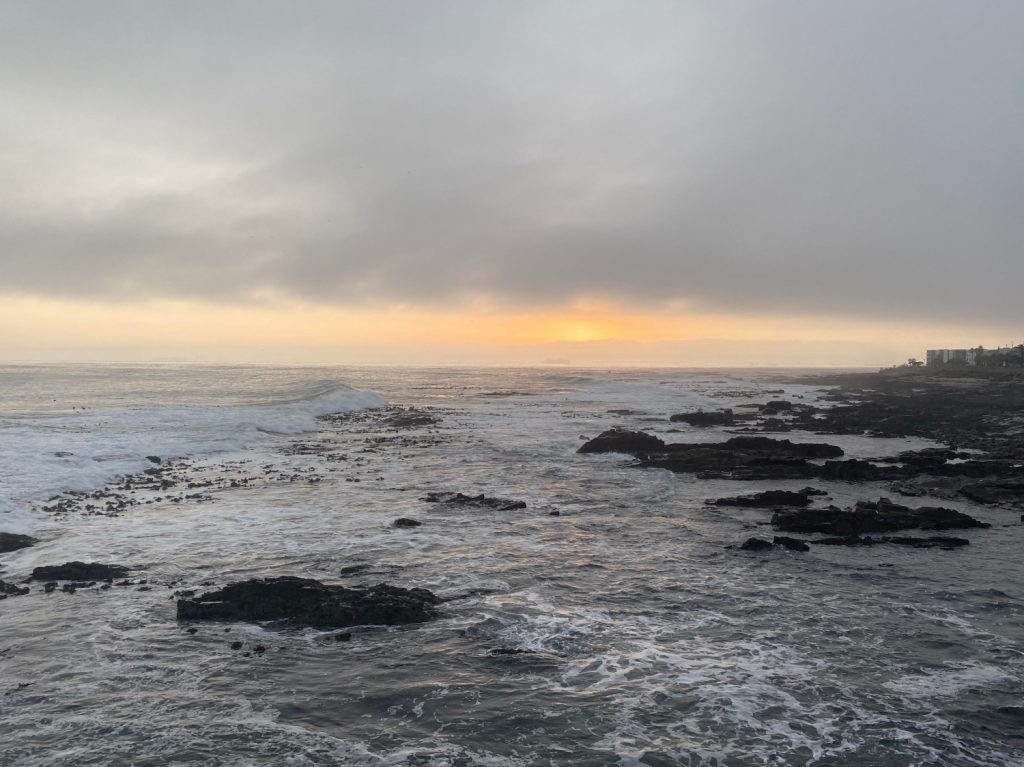
Day 60: Monday, 25 May 2020
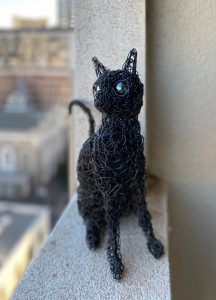
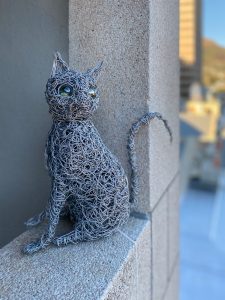
Howling wind, rain sweeping across the sky, city streets drenched, slick, deserted except for the occasional huddled shape dashing from a car into a building. Exercise. Life’s moments are filled with little rituals, as mentioned. Often. Like a ritual. Finish, and walk out onto the balcony to greet my cats. The tiles are wet. The rain swirls. Greet Mr Alan and walk across to Miss Buffy, and my feet sweep from under me and though it happens in a flash, the moment is like an action replay: see my left foot slip, my right foot follow, and then tumble backwards, landing heavily on my hip, head snapping back and hitting the glass door, the blood and water (head wounds are always such a pig’s blood drama). Confer with the Uganda Café: strong coffee is needed. Go wash up and stick a wad of toilet paper on my head. Sip strong coffee. Take some Panadol. Decide today is not a day to go cycling. Ponder on that slo-mo moment in the mind. Has the brain been wired to re-live every moment as an instant replay? It was the USA TV sports broadcaster, Roone Arledge, who stuck a microphone in a dead zebra so viewers could hear what it sounded like being chomped by a lion, and then decided in the 1960s that because “everything is magnified by television”, the way to get sports fans even more addicted was to introduce instant replay — and television sport was never the same again. Recall a moment with the family watching a rugby game on TV, and the scrumhalf fumbled the ball, and the ref blew for a knock-on. Bloody fool! yelled my dad. And then the instant replay kicked in. Good God!, shouted my dad. The bastard’s done it again! Take him off! I needed another beer, but couldn’t catch my breath. Stay home and have a hypochondria attack: maybe I am suffering from delayed concussion and when I go to sleep, I won’t wake up? Refrain from Googling: “banged head”. Ho hum.
Day 61: Tuesday, 26 May 2020
Opt not to ride today. Deadlines to meet. Think a lot about “remote working” and must confess it’s harder to get my head around why the clear and straightforward description has to morph from “ working from home” to a catchphrase known as “remote working”. Yeah, I get it: it may upset those who don’t consider their flat a “home” or doesn’t take into consideration the person working from a tent pitched on the slopes of Mount Nirvana or a small cave in the Cederberg. Whatever. But a large chunk of the workforce is either having to do it or, and this is the worst-case scenario, are at home (or on Mt Nirvana, in a cave, on the street) because they no longer have a workplace to go to, and soon may not have a home from which even to begin to find “remote work”. A 2018 USA survey found that only 3% of workers opted to work from home 50% of the time. But what they also did — because technology enabled it — was to work from home at the same time. There we are, dashing off early morning emails before yoga; hauling ourselves into the office, typing responses to those emails on the train or bus; or tidying up that project proposal before going to bed after spending 12 hours at the office in meetings about that same project proposal. As the article says: “We work everywhere.” And forgot to add: “And all the time.” I was the first sales rep at Oxford University Press to ask for and get a “portable computer “ — an Apricot — to make it easier to work while on the road. This was back in the ‘80s. It weighed as much as a golf bag and was only slightly less bulky. My PA laughed and laughed and laughed. Why? I asked. And she said you just went from an eight or ten hours a day, five days a week work routine to 24 hours seven days a week — and you volunteered. With no salary increase. She was a wise one was Annie.
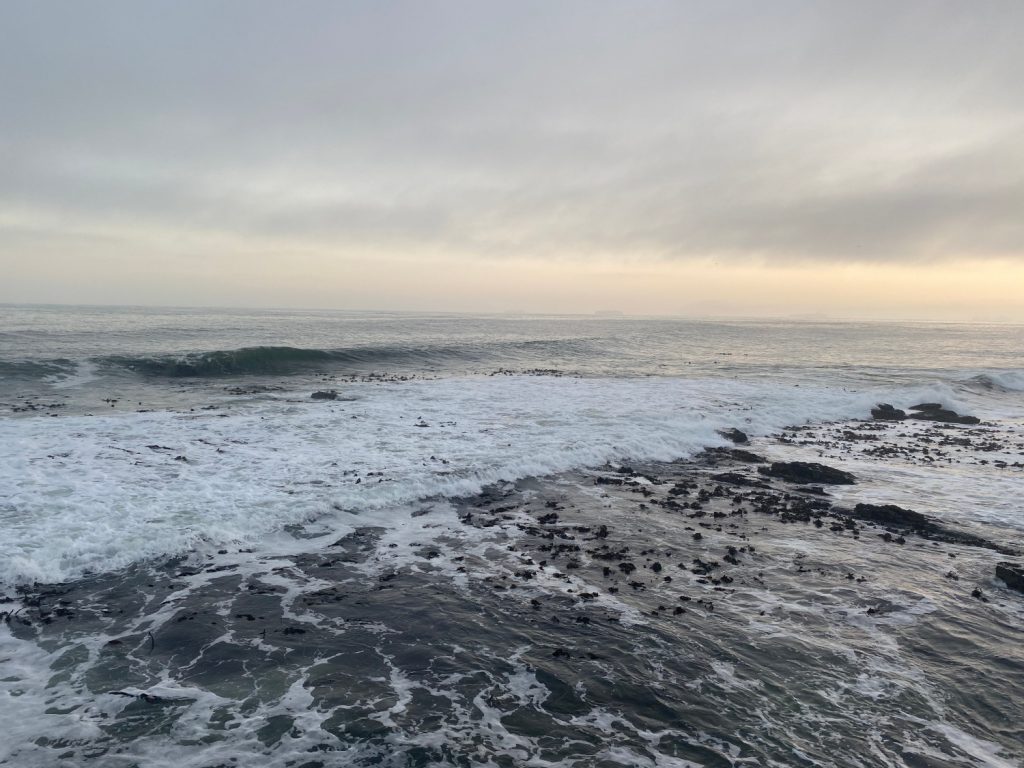
Day 62: Wednesday, 27 May 2020
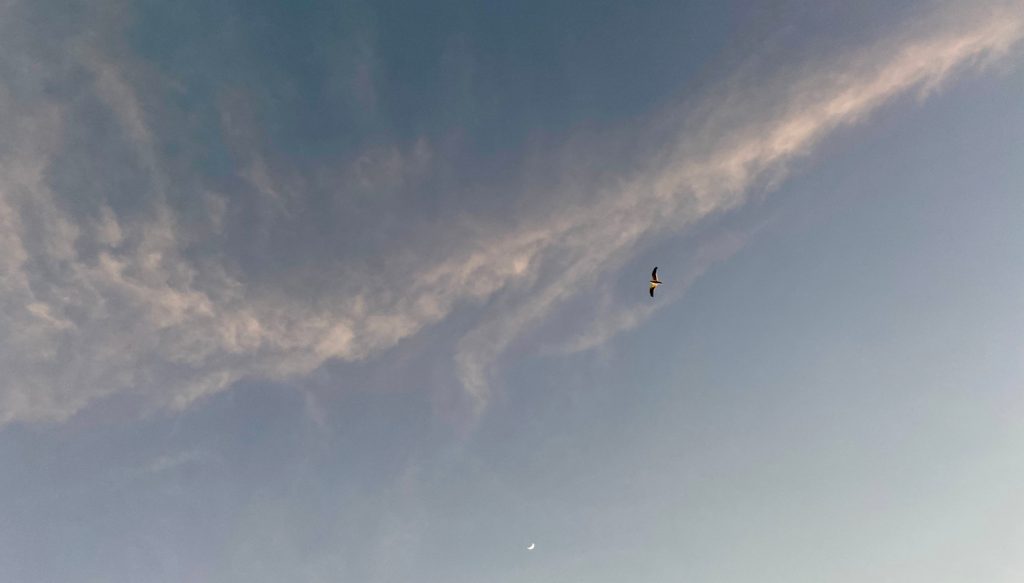
“What do your cats think of the baristas?” asks a friend. “They don’t, I replied. They think ‘barista’ is a silly name. As Miss Buffy said, ‘They make coffee, and serve it. Why use an Italian word for a bartender to describe a perfectly straightforward job, like ‘coffee maker’? “Just call them bartenders if you hate the “c” word said Mister Alan, getting it all muddled again. It’s the way his mind wanders. The baristas think the cats love them. Silly Cs as Mister Alan would say. Read that indomitable Angela Merkel has outsmarted the legal-eagles of the Karlsruhe (Germany’s constitutional court) following its ruling on the legality of the European Central Bank’s bond-buying programme. She — with French President Macron, hanging on to her coattails — proposed the European commission borrows for the entire EU. Of course, all her opponents were deadbeat males: Alexander Stubb, former prime minister of Finland, Giuseppe Conte, Italian prime minister, and some economics professor called Luis Garicano, representing the Spanish centrist Ciudadanos party in the European parliament. Ho hum. Have not seen the blanket man. Virus attrition? A friend connects me to someone who plans a documentary on individual responses to lockdown, gathering voices from around the world. She wants to talk to me. Pour a whisky. And, in that fathomless deep of memory, emerges a visit — “media educational” — to the Jameson distillery in Midleton, County Cork, Ireland. At dinner, the distillery band — the Jameson Orchestra —took the stage, comprising: nine violins, one electric keyboard, three cellos/violas, one harp, one bass cello, two saxophones, eight horns, and one percussionist. I was seated next to the Master Distiller, Barry Crockitt. They did an intro, and then Mr Crockitt turned to me and smiled. On to the stage walks Sinéad O’Connor, crew-cut hair emphasising her large ears that sit tight close to her skull, loose-fitting black suit, stiletto heels, and that vulnerable impish look. She opened with Love letters Straight from the Heart. As her voice moved from that breathless whisper to full song, it was as if she had entered another world, and sucked us in with her. Then she moved to Don’t cry for me Argentina. This the first time she lifts her head and looks directly at the audience. She moves on to Something Beautiful. She ends the with Rivers of Babylon, pausing before launching into a version that discards the Rasta beat, with her first acknowledgement of her audience: “Don’t sing along.” She walks off the stage to a standing ovation and does not do an encore. We drink a Rarest Vintage Reserve 2007. Mr Crockitt blended from parcels of old and rare whisky selected from the 20-year-old barrels among the million barrels the company has warehoused. He produced only 1 300 cases. I get to take a bottle home.
Day 63: Thursday, 28 May 2020
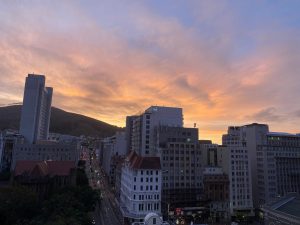
Wale Street shimmers under the street lights, wet and uninviting. Decide to stay indoors. People move down the street, huddled, almost furtive, bent by the cold and the wind. Read an interview in in Der Spiegel with a prominent German virologist Christian Drosten. Rational person. The saddest thing is the virulent response from the right-wing anti-science groups. And his calm response:It’s not general scepticism of science, it is more that people have suffered under the shutdown measures, as mild as they may have been. Many people have the feeling that drastic limitations on their daily lives are being implemented over their heads.(Though I think he is optimistic about it not being a “general scepticism of science”.) The rest of the day passes with a general sense of gloom. Some days are like that.
Day 64: Friday, 29 May 2020
The day is bright and cold. The birds are quiet. Out early, take on Wale Street — done without even a deep breathe. It’s cold, and the sea spray splashes over the almost empty promenade. Forego the coffee bench and head straight home. The street litter is piling up faster than the cleaning brigade can clear it. When we go down to level 3 on Monday, will it be “back to normal”? The day is broken only by the collection of the new — but empty — gas canisters to be returned full tomorrow. And two jerseys that arrive from an online store, which is a relief. Hate sitting at a desk with a jacket on, and the apartment, like so many buildings in South Africa, was designed as if the country never had a winter. Read on the Daily Maverick that a group of NGO’s have written a “Dear Mr President Letter” — who hasn’t — but sadly this one is necessary. Have not seen the blanket man since 16 May.
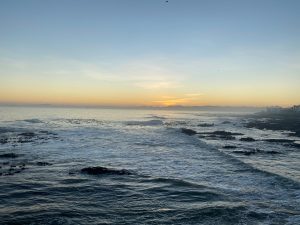
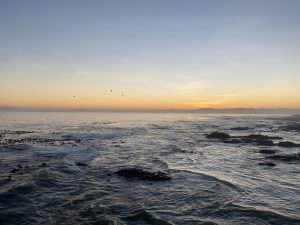
Day 65: Saturday, 30 May 2020
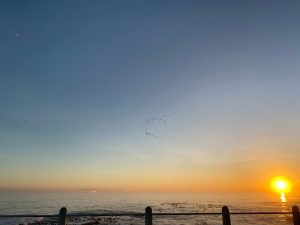
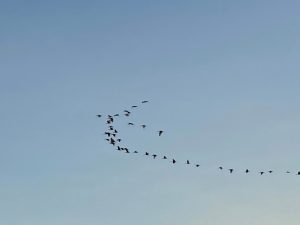
Gorgeous day. The birds in the Company’s Gardens agree. Pick up my thermos of coffee from the Ugandan Café, and go out at a leisurely pace. The air is almost balmy. A young guy sweeps past me on his racing bike, full-on Lycra, aerodynamic helmet, two water bottles strapped to the bike frame, smartphone mounted on the handlebars, earphones, backpack… the whole nine yards. Always baffles me that you go out for a morning ride equipped as if you are venturing into the great unknown. It’s an urban ride, with coffee shops open —“No Mask No Coffee”. The promenade is still empty so extend the circuit a little and then head back to the coffee bench. The dolphins play. It’s a glorious morning. The sea birds are delighted, skimming the water and soaring overhead. Mask down to sip coffee and a friend jogging past recognises me. She pulls her mask down. At first, I don’t recognise her — it’s been more than four years. She’s surprised, as am I. We talk. Her sister keeps running. I head home via the Garden Centre to do some shopping. Then on to the Nude Shop for their delicious butter and sourdough bread. Stop and buy a bagel from New York Bagel. The store carefully marked out the right side of the pavement to enforce social distancing, but everyone queues from the left side. Go figure. Church Square is full of delivery guys and others. The security guard on my apartment block tells me it’s because the area has free WiFi, apparently courtesy of the City. Now I know.
Day 66: Sunday, 31 May 2020
Fabulous ride today, and then breakfast chat with my sister, hubby, and their boyos. The rest of the day consumed watching the SpaceX Dragon heading off to the International Space Station (alerted to this live link by those boyos who are so on the whole political-techno undertones of this entire thing. As one of them pointed out, “Hilariously, they had to make some expensive genderless docking ports because neither the Americans or the Russians wanted to be the female. Which is ironically comforting, all that brainpower and they’re still as dof as rest of us!”Have to decide whether to end the COVID-19 CHRONICLES tonight as, technically, lockdown is over from midnight.
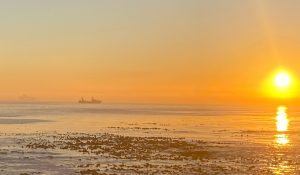
POSTSCRIPT Day 67: Monday, 01 June 2020
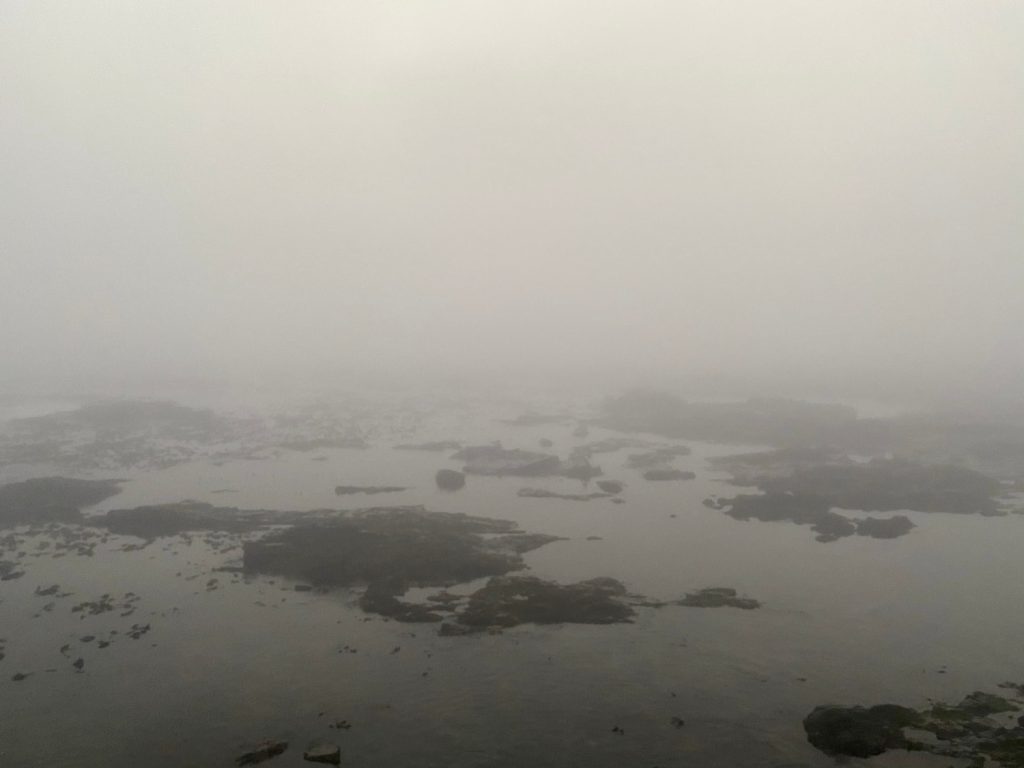
Is this the end of the COVID-19 CHRONICLES? The “great pause” un-paused. The fog low and heavy on the promenade. The city stumbling on, battered, slightly bruised. We seem the same. Lockdown is down — and god forbid should the government decide to reimpose levels 4 or 5. You won’t put the genie back in the bottle. Funny how we blindly go along with instructions. “Oh. It is level 3. let’s gadabout and visit and shop and whatever.”Is today different from yesterday just the government says it is? Are we all mad?Good friends and family helped through these 66 days of scribbling. Conversations that edged me away from the easy embrace of despair, comments that slipped me through the sticky grasp of gloom, moments they recalled that moved me from melancholy: without them, this would not have happened. Others, enveloped in their thoughts, moved on. One friend said, “I thought today perhaps ageing is all about feeling less and less in order to keep on living. But then, when we can do something nice again, we’ll feel so different.” She is right. If this is the end of the Chronicle, I tell her, then the baristas must go. Anyway, they are idle wannabe hipsters with straggly beards and wireframe dark glasses and oversize headphones, and they wear their pants above the ankle as if they were fucking street urchins. Here they are in the lap of luxury in an almost penthouse apartment paying no rent in a glorious city, and they act as if they are hard done by. Things end.
This is a test
Your guitar lies neglected and lockdown is getting harder. But you still write your daily Covid pieces. Bloody well done. Also for learning to live on your own!
Thanks, Karin.
Yes the guitar has been neglected…
Norah Jones … on a Full Moon! Beautiful, And thank you for your writing – it is poignant “news”… Also thought of Fred today. Handed out apples, while driving – perhaps that is safer? Love that you are watching the Ocean. And that you cuddled a Dog.
Thank you. Every old dog needs a cuddle.
Sadness a weakness?
Lovely early morning pics.
Mmm. Good point, but weakness here is meant as in “a weakness for” something, rather than a weakness of character, when juxtaposed against addiction.
Love this Donald – The great Pause.
Gracias mi hermano.
26 April The Nuba mountains in Sudan.
You’ve transported me from my locked up self into a magical world. Just this morning I thought I’m too old to be enchanted.
Thank you. Enchantment like wonder should never cease…
Talk to your father… thanks for sharing that. This Covid takes us into File 13. Time to clear out the clutter. And write. And read. And really, really listen to music. And rain.
Thoughtful meanderings. Your writings are very visual.
Thanks, Gwynne.
Capitalism in overdrive … Mother Nature is here to settle us. And let us learn, if we will, that it is okay to feed the pigeons, and each other.
Yes, it is time to stop before we rush out and do things… just to be busy. Listening to Siya, to Rudyard and to Cyril… and perhaps even better… to music… that is perhaps one of the messages COVID-2019 is whispering to us in amongst the deaths.
A very close, intimate and insightful tribute to a great friend. What will tomorrow bring?
We now live in the clouds between those we love… thank you for the writing.
Thank you.
Beautiful. Poignant. Look forward to Day Two. And once I’ve settled my admin, I, inspired by you, will begin my chronicle. 🙏🏻